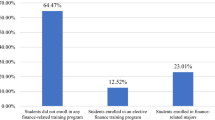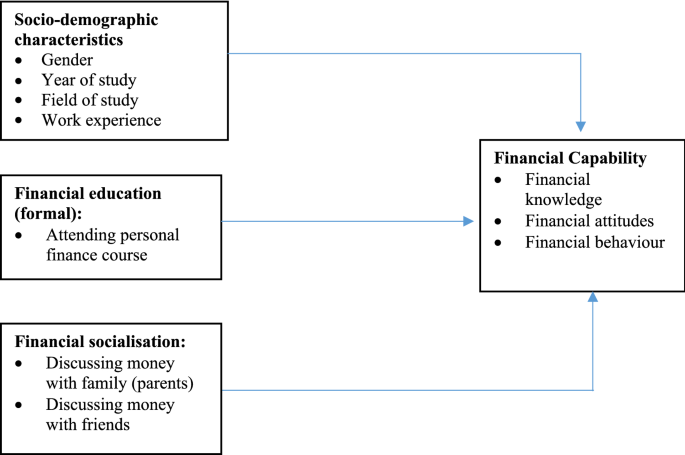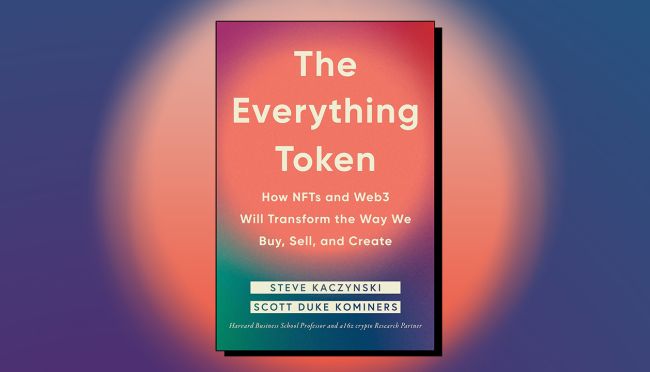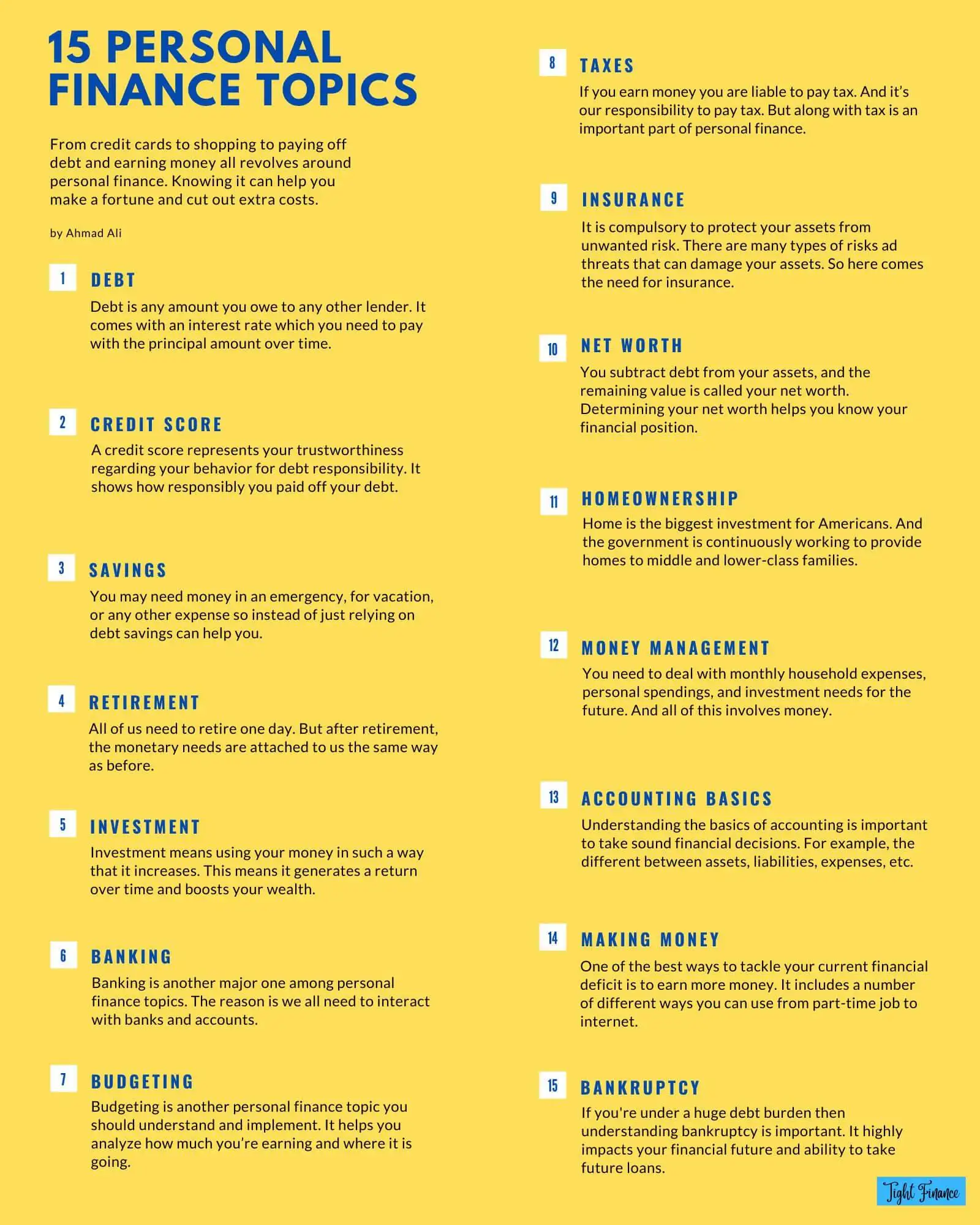Home » Blog » Dissertation » Topics » Finance » Personal Finance » 80 Personal Finance Research Topics


80 Personal Finance Research Topics
FacebookXEmailWhatsAppRedditPinterestLinkedInWelcome to the realm of academic exploration and financial insight! Finding captivating and pertinent topics is the pivotal first step for students embarking on the exhilarating research journey. As you stand at the crossroads of academia and personal finance, unearthing compelling research topics to shape your undergraduate, master’s, or doctoral thesis/dissertation might seem a formidable […]

Welcome to the realm of academic exploration and financial insight! Finding captivating and pertinent topics is the pivotal first step for students embarking on the exhilarating research journey. As you stand at the crossroads of academia and personal finance, unearthing compelling research topics to shape your undergraduate, master’s, or doctoral thesis/dissertation might seem a formidable challenge. Fret not, for this guide is tailored to be your compass in navigating through the labyrinth of possibilities that the world of personal finance offers.
In this blog post, we will explore a treasure trove of potential research topics that pique academic interest and promise to contribute to the ever-evolving landscape of financial wisdom.
A List Of Potential Research Topics In Personal Finance:
- A systematic review of behavioural biases in personal investment decision-making.
- Behavioural biases and their impact on individual investment decisions.
- Impact of Brexit on UK household investment behaviours and attitudes.
- Resilience and adaptability in personal financial management after the pandemic.
- Examining the evolving landscape of personal finance research post-COVID-19.
- Exploring the connection between mental health and financial management.
- Health crisis preparedness and its influence on personal financial planning.
- Role of fintech innovations in shaping the UK personal finance landscape.
- Comparative analysis of active vs. passive investment strategies.
- Social and cultural influences on personal financial behaviours.
- The role of social media in shaping financial attitudes and behaviours.
- Evaluating the impact of financial education programs in schools.
- Effects of economic uncertainty on individual saving and spending behaviours.
- Financial planning for the gig economy workforce.
- Real estate vs. stock market: A comparative study of investment preferences.
- Impact of financial stress on relationships and family dynamics.
- Behavioural insights into credit card usage and debt accumulation.
- Effects of remote work on spending habits and housing preferences.
- Literature synthesis on the impact of financial literacy interventions on youth.
- Pension reforms and retirement planning strategies in the UK.
- The role of financial literacy in retirement planning.
- Analysis of factors influencing successful retirement transitions.
- Ethical considerations in personal investment and portfolio management.
- Cultural perspectives on inheritance and intergenerational wealth transfer.
- Impact of celebrity endorsements on personal finance decisions.
- Implications of behavioural economics for designing effective savings schemes.
- Psychological motivations behind cryptocurrency investment.
- Role of social support networks in coping with financial challenges.
- The psychology of luxury goods consumption and its financial aftermath.
- Behavioural biases in the assessment of insurance needs and coverage.
- Investor reactions to financial market bubbles and crashes.
- Exploring the role of cultural norms in UK millennials’ financial decision-making.
- Gender differences in financial decision-making and their consequences.
- Impact of government stimulus programs on household financial decisions.
- Reviewing the effectiveness of robo-advisors in long-term investment strategies.
- Impact of cognitive ageing on financial decision-making abilities.
- Exploring the link between health and long-term financial planning.
- Digital payment trends and their implications for personal finance management.
- Psychological drivers of charitable giving and philanthropic behaviours.
- Navigating cultural norms and financial practices among immigrants.
- Investor behaviour during times of geopolitical uncertainty.
- Financial implications of the sharing economy and collaborative consumption.
- Role of nostalgia in consumer spending and investment choices.
- Impact of financial infidelity on relationships and trust.
- Evaluating the effectiveness of robo-advisors in ESG investing.
- A critical analysis of gender disparities in financial literacy and empowerment.
- Analysis of the UK’s response to financial challenges during the pandemic.
- Changes in risk perception and investment strategies post COVID-19.
- Effects of income inequality on personal financial well-being.
- Cross-generational perspectives on retirement and legacy planning.
- Neuroscientific insights into impulsive buying behaviour.
- Exploring the link between happiness and financial well-being.
- Financial challenges and opportunities for single-parent households.
- Impact of media portrayal on personal finance perceptions.
- The psychology of debt repayment strategies and decision-making.
- Financial considerations in blended families and step-parenting.
- Risk perception and decision-making in alternative investments.
- Exploring the role of cultural background in shaping financial attitudes.
- Effects of peer comparison on consumer spending choices.
- Analysis of the effectiveness of robo-advisors in investment management.
- Behavioural economics perspectives on retirement planning and pension reforms.
- Behavioural insights into British consumers’ credit card usage and debt management.
- Digitalization of financial services and its influence on consumer behaviour.
- Behavioural biases in mortgage decisions and homeownership outcomes.
- Financial aspirations and their influence on investment behaviour.
- The role of automated savings apps in fostering financial discipline.
- Behavioural insights into the use of budgeting and expense tracking tools.
- Factors influencing early financial education in children.
- Impact of personality traits on investment portfolio diversification.
- The psychology of debt aversion and its implications.
- Behavioural patterns in retirement withdrawal strategies.
- Financial implications of delayed gratification and self-control.
- Exploring the link between personal values and financial choices.
- Literature review on the psychological factors driving cryptocurrency adoption.
- Psychological factors shaping post-pandemic travel and leisure spending.
- Sustainability and ethical considerations in UK investment practices.
- The impact of student loan debt on young adults’ financial futures.
- Investor reactions to corporate social responsibility initiatives.
- Evaluating the role of social media influencers in shaping personal finance attitudes.
- Factors influencing household budgeting and expenditure patterns.
- Implications of the UK housing market dynamics on personal wealth accumulation.
- Long-term financial implications of emergency fund utilization during the crisis.
- Investor reactions to market volatility and uncertainty during the pandemic.
- Navigating the complexities of UK tax regulations in personal financial planning.
- Relationship between personality traits and risk tolerance in investment.
- Synthesizing research on the implications of income inequality for household finance.
- A comprehensive review of strategies for coping with financial stress and anxiety.
- Evaluating the effectiveness of online financial education in the new normal.
- Investor reactions to the Bank of England’s monetary policy shifts.
- Psychological factors affecting impulse buying and their financial implications.
In conclusion, the diverse range of Personal Finance research topics available across various degree levels presents a rich field for in-depth exploration. These topics offer valuable insights into individual financial decision-making and contribute to the broader understanding of economic systems and their impacts. From behavioural aspects to investment strategies and policy implications, students and scholars have a multitude of avenues to delve into, ultimately enhancing our grasp of effective financial management in both personal and societal contexts.
Order Personal Finance Dissertation Now!
External Links:
- Download Personal Finance Dissertation Sample For Your Perusal
Research Topic Help Service
Get unique research topics exactly as per your requirements. We will send you a mini proposal on the chosen topic which includes;
- Research Statement
- Research Questions
- Key Literature Highlights
- Proposed Methodology
- View a Sample of Service
Ensure Your Good Grades With Our Writing Help
- Talk to the assigned writer before payment
- Get topic if you don't have one
- Multiple draft submissions to have supervisor's feedback
- Free revisions
- Complete privacy
- Plagiarism Free work
- Guaranteed 2:1 (With help of your supervisor's feedback)
- 2 Installments plan
- Special discounts
Other Posts
- 80 Banking and Finance Research Topics August 30, 2023 -->
- 80 Behavioral Finance Research Topics August 26, 2023 -->
- 80 Corporate Finance Research Topics August 25, 2023 -->
- 80 Finance Research Topics July 28, 2023 -->
- 80 Financial Derivatives Research Topics August 28, 2023 -->
- 80 Financial Econometrics Research Topics August 29, 2023 -->
- 80 Financial Economics Research Topics August 29, 2023 -->
- 80 Financial Management Research Topics August 29, 2023 -->
- 80 Financial Markets Research Topics August 25, 2023 -->
- 80 Financial Risk Management Research Topics August 28, 2023 -->
- 80 Fintech and Digital Finance Research Topics August 26, 2023 -->
- 80 International Finance Research Topics August 26, 2023 -->
- 80 Investment Banking Research Topics August 25, 2023 -->
- 80 Islamic Finance Research Topics August 28, 2023 -->
- 80 Microfinance Research Topics August 30, 2023 -->
- 80 Public Finance Research Topics August 26, 2023 -->
- 80 Quantitative Finance Research Topics August 26, 2023 -->
- 80 Real Estate Finance Research Topics August 26, 2023 -->
- 80 Sustainable Finance Research Topics August 28, 2023 -->
WhatsApp us
Research Topics & Ideas: Finance
120+ Finance Research Topic Ideas To Fast-Track Your Project
If you’re just starting out exploring potential research topics for your finance-related dissertation, thesis or research project, you’ve come to the right place. In this post, we’ll help kickstart your research topic ideation process by providing a hearty list of finance-centric research topics and ideas.
PS – This is just the start…
We know it’s exciting to run through a list of research topics, but please keep in mind that this list is just a starting point . To develop a suitable education-related research topic, you’ll need to identify a clear and convincing research gap , and a viable plan of action to fill that gap.
If this sounds foreign to you, check out our free research topic webinar that explores how to find and refine a high-quality research topic, from scratch. Alternatively, if you’d like hands-on help, consider our 1-on-1 coaching service .
Overview: Finance Research Topics
- Corporate finance topics
- Investment banking topics
- Private equity & VC
- Asset management
- Hedge funds
- Financial planning & advisory
- Quantitative finance
- Treasury management
- Financial technology (FinTech)
- Commercial banking
- International finance

Corporate Finance
These research topic ideas explore a breadth of issues ranging from the examination of capital structure to the exploration of financial strategies in mergers and acquisitions.
- Evaluating the impact of capital structure on firm performance across different industries
- Assessing the effectiveness of financial management practices in emerging markets
- A comparative analysis of the cost of capital and financial structure in multinational corporations across different regulatory environments
- Examining how integrating sustainability and CSR initiatives affect a corporation’s financial performance and brand reputation
- Analysing how rigorous financial analysis informs strategic decisions and contributes to corporate growth
- Examining the relationship between corporate governance structures and financial performance
- A comparative analysis of financing strategies among mergers and acquisitions
- Evaluating the importance of financial transparency and its impact on investor relations and trust
- Investigating the role of financial flexibility in strategic investment decisions during economic downturns
- Investigating how different dividend policies affect shareholder value and the firm’s financial performance
Investment Banking
The list below presents a series of research topics exploring the multifaceted dimensions of investment banking, with a particular focus on its evolution following the 2008 financial crisis.
- Analysing the evolution and impact of regulatory frameworks in investment banking post-2008 financial crisis
- Investigating the challenges and opportunities associated with cross-border M&As facilitated by investment banks.
- Evaluating the role of investment banks in facilitating mergers and acquisitions in emerging markets
- Analysing the transformation brought about by digital technologies in the delivery of investment banking services and its effects on efficiency and client satisfaction.
- Evaluating the role of investment banks in promoting sustainable finance and the integration of Environmental, Social, and Governance (ESG) criteria in investment decisions.
- Assessing the impact of technology on the efficiency and effectiveness of investment banking services
- Examining the effectiveness of investment banks in pricing and marketing IPOs, and the subsequent performance of these IPOs in the stock market.
- A comparative analysis of different risk management strategies employed by investment banks
- Examining the relationship between investment banking fees and corporate performance
- A comparative analysis of competitive strategies employed by leading investment banks and their impact on market share and profitability
Private Equity & Venture Capital (VC)
These research topic ideas are centred on venture capital and private equity investments, with a focus on their impact on technological startups, emerging technologies, and broader economic ecosystems.
- Investigating the determinants of successful venture capital investments in tech startups
- Analysing the trends and outcomes of venture capital funding in emerging technologies such as artificial intelligence, blockchain, or clean energy
- Assessing the performance and return on investment of different exit strategies employed by venture capital firms
- Assessing the impact of private equity investments on the financial performance of SMEs
- Analysing the role of venture capital in fostering innovation and entrepreneurship
- Evaluating the exit strategies of private equity firms: A comparative analysis
- Exploring the ethical considerations in private equity and venture capital financing
- Investigating how private equity ownership influences operational efficiency and overall business performance
- Evaluating the effectiveness of corporate governance structures in companies backed by private equity investments
- Examining how the regulatory environment in different regions affects the operations, investments and performance of private equity and venture capital firms

Asset Management
This list includes a range of research topic ideas focused on asset management, probing into the effectiveness of various strategies, the integration of technology, and the alignment with ethical principles among other key dimensions.
- Analysing the effectiveness of different asset allocation strategies in diverse economic environments
- Analysing the methodologies and effectiveness of performance attribution in asset management firms
- Assessing the impact of environmental, social, and governance (ESG) criteria on fund performance
- Examining the role of robo-advisors in modern asset management
- Evaluating how advancements in technology are reshaping portfolio management strategies within asset management firms
- Evaluating the performance persistence of mutual funds and hedge funds
- Investigating the long-term performance of portfolios managed with ethical or socially responsible investing principles
- Investigating the behavioural biases in individual and institutional investment decisions
- Examining the asset allocation strategies employed by pension funds and their impact on long-term fund performance
- Assessing the operational efficiency of asset management firms and its correlation with fund performance
Hedge Funds
Here we explore research topics related to hedge fund operations and strategies, including their implications on corporate governance, financial market stability, and regulatory compliance among other critical facets.
- Assessing the impact of hedge fund activism on corporate governance and financial performance
- Analysing the effectiveness and implications of market-neutral strategies employed by hedge funds
- Investigating how different fee structures impact the performance and investor attraction to hedge funds
- Evaluating the contribution of hedge funds to financial market liquidity and the implications for market stability
- Analysing the risk-return profile of hedge fund strategies during financial crises
- Evaluating the influence of regulatory changes on hedge fund operations and performance
- Examining the level of transparency and disclosure practices in the hedge fund industry and its impact on investor trust and regulatory compliance
- Assessing the contribution of hedge funds to systemic risk in financial markets, and the effectiveness of regulatory measures in mitigating such risks
- Examining the role of hedge funds in financial market stability
- Investigating the determinants of hedge fund success: A comparative analysis
Financial Planning and Advisory
This list explores various research topic ideas related to financial planning, focusing on the effects of financial literacy, the adoption of digital tools, taxation policies, and the role of financial advisors.
- Evaluating the impact of financial literacy on individual financial planning effectiveness
- Analysing how different taxation policies influence financial planning strategies among individuals and businesses
- Evaluating the effectiveness and user adoption of digital tools in modern financial planning practices
- Investigating the adequacy of long-term financial planning strategies in ensuring retirement security
- Assessing the role of financial education in shaping financial planning behaviour among different demographic groups
- Examining the impact of psychological biases on financial planning and decision-making, and strategies to mitigate these biases
- Assessing the behavioural factors influencing financial planning decisions
- Examining the role of financial advisors in managing retirement savings
- A comparative analysis of traditional versus robo-advisory in financial planning
- Investigating the ethics of financial advisory practices

The following list delves into research topics within the insurance sector, touching on the technological transformations, regulatory shifts, and evolving consumer behaviours among other pivotal aspects.
- Analysing the impact of technology adoption on insurance pricing and risk management
- Analysing the influence of Insurtech innovations on the competitive dynamics and consumer choices in insurance markets
- Investigating the factors affecting consumer behaviour in insurance product selection and the role of digital channels in influencing decisions
- Assessing the effect of regulatory changes on insurance product offerings
- Examining the determinants of insurance penetration in emerging markets
- Evaluating the operational efficiency of claims management processes in insurance companies and its impact on customer satisfaction
- Examining the evolution and effectiveness of risk assessment models used in insurance underwriting and their impact on pricing and coverage
- Evaluating the role of insurance in financial stability and economic development
- Investigating the impact of climate change on insurance models and products
- Exploring the challenges and opportunities in underwriting cyber insurance in the face of evolving cyber threats and regulations
Quantitative Finance
These topic ideas span the development of asset pricing models, evaluation of machine learning algorithms, and the exploration of ethical implications among other pivotal areas.
- Developing and testing new quantitative models for asset pricing
- Analysing the effectiveness and limitations of machine learning algorithms in predicting financial market movements
- Assessing the effectiveness of various risk management techniques in quantitative finance
- Evaluating the advancements in portfolio optimisation techniques and their impact on risk-adjusted returns
- Evaluating the impact of high-frequency trading on market efficiency and stability
- Investigating the influence of algorithmic trading strategies on market efficiency and liquidity
- Examining the risk parity approach in asset allocation and its effectiveness in different market conditions
- Examining the application of machine learning and artificial intelligence in quantitative financial analysis
- Investigating the ethical implications of quantitative financial innovations
- Assessing the profitability and market impact of statistical arbitrage strategies considering different market microstructures
Treasury Management
The following topic ideas explore treasury management, focusing on modernisation through technological advancements, the impact on firm liquidity, and the intertwined relationship with corporate governance among other crucial areas.
- Analysing the impact of treasury management practices on firm liquidity and profitability
- Analysing the role of automation in enhancing operational efficiency and strategic decision-making in treasury management
- Evaluating the effectiveness of various cash management strategies in multinational corporations
- Investigating the potential of blockchain technology in streamlining treasury operations and enhancing transparency
- Examining the role of treasury management in mitigating financial risks
- Evaluating the accuracy and effectiveness of various cash flow forecasting techniques employed in treasury management
- Assessing the impact of technological advancements on treasury management operations
- Examining the effectiveness of different foreign exchange risk management strategies employed by treasury managers in multinational corporations
- Assessing the impact of regulatory compliance requirements on the operational and strategic aspects of treasury management
- Investigating the relationship between treasury management and corporate governance
Financial Technology (FinTech)
The following research topic ideas explore the transformative potential of blockchain, the rise of open banking, and the burgeoning landscape of peer-to-peer lending among other focal areas.
- Evaluating the impact of blockchain technology on financial services
- Investigating the implications of open banking on consumer data privacy and financial services competition
- Assessing the role of FinTech in financial inclusion in emerging markets
- Analysing the role of peer-to-peer lending platforms in promoting financial inclusion and their impact on traditional banking systems
- Examining the cybersecurity challenges faced by FinTech firms and the regulatory measures to ensure data protection and financial stability
- Examining the regulatory challenges and opportunities in the FinTech ecosystem
- Assessing the impact of artificial intelligence on the delivery of financial services, customer experience, and operational efficiency within FinTech firms
- Analysing the adoption and impact of cryptocurrencies on traditional financial systems
- Investigating the determinants of success for FinTech startups

Commercial Banking
These topic ideas span commercial banking, encompassing digital transformation, support for small and medium-sized enterprises (SMEs), and the evolving regulatory and competitive landscape among other key themes.
- Assessing the impact of digital transformation on commercial banking services and competitiveness
- Analysing the impact of digital transformation on customer experience and operational efficiency in commercial banking
- Evaluating the role of commercial banks in supporting small and medium-sized enterprises (SMEs)
- Investigating the effectiveness of credit risk management practices and their impact on bank profitability and financial stability
- Examining the relationship between commercial banking practices and financial stability
- Evaluating the implications of open banking frameworks on the competitive landscape and service innovation in commercial banking
- Assessing how regulatory changes affect lending practices and risk appetite of commercial banks
- Examining how commercial banks are adapting their strategies in response to competition from FinTech firms and changing consumer preferences
- Analysing the impact of regulatory compliance on commercial banking operations
- Investigating the determinants of customer satisfaction and loyalty in commercial banking
International Finance
The folowing research topic ideas are centred around international finance and global economic dynamics, delving into aspects like exchange rate fluctuations, international financial regulations, and the role of international financial institutions among other pivotal areas.
- Analysing the determinants of exchange rate fluctuations and their impact on international trade
- Analysing the influence of global trade agreements on international financial flows and foreign direct investments
- Evaluating the effectiveness of international portfolio diversification strategies in mitigating risks and enhancing returns
- Evaluating the role of international financial institutions in global financial stability
- Investigating the role and implications of offshore financial centres on international financial stability and regulatory harmonisation
- Examining the impact of global financial crises on emerging market economies
- Examining the challenges and regulatory frameworks associated with cross-border banking operations
- Assessing the effectiveness of international financial regulations
- Investigating the challenges and opportunities of cross-border mergers and acquisitions
Choosing A Research Topic
These finance-related research topic ideas are starting points to guide your thinking. They are intentionally very broad and open-ended. By engaging with the currently literature in your field of interest, you’ll be able to narrow down your focus to a specific research gap .
When choosing a topic , you’ll need to take into account its originality, relevance, feasibility, and the resources you have at your disposal. Make sure to align your interest and expertise in the subject with your university program’s specific requirements. Always consult your academic advisor to ensure that your chosen topic not only meets the academic criteria but also provides a valuable contribution to the field.
If you need a helping hand, feel free to check out our private coaching service here.
You Might Also Like:

thank you for suggest those topic, I want to ask you about the subjects related to the fintech, can i measure it and how?
Submit a Comment Cancel reply
Your email address will not be published. Required fields are marked *
Save my name, email, and website in this browser for the next time I comment.
- Print Friendly
Read our research on: TikTok | Podcasts | Election 2024
Regions & Countries
Personal finances, black americans’ views on success in the u.s..
While Black adults define personal and financial success in different ways, most see these measures of success as major sources of pressure in their lives.
Parents, Young Adult Children and the Transition to Adulthood
Most U.S. young adults are at least mostly financially independent and happy with their parents' involvement in their lives. Parent-child relationships are mostly strong.
U.S. centenarian population is projected to quadruple over the next 30 years
The number of Americans ages 100 and older is projected to more than quadruple over the next three decades.
Older Workers Are Growing in Number and Earning Higher Wages
Roughly one-in-five Americans ages 65 and older were employed in 2023 – nearly double the share of those who were working 35 years ago.
Key facts about the wealth of immigrant households during the COVID-19 pandemic
The median wealth of immigrant households increased by 42% from December 2019 to December 2021.
Tipping Culture in America: Public Sees a Changed Landscape
72% of U.S. adults say tipping is expected in more places today than it was five years ago. But even as Americans say they’re being asked to tip more often, only about a third say it’s extremely or very easy to know whether (34%) or how much (33%) to tip for various services.
What the data says about food stamps in the U.S.
The food stamp program is one of the larger federal social welfare initiatives, and in its current form has been around for nearly six decades.
Most Black adults in the U.S. are optimistic about their financial future
68% of Black adults in the U.S. say they do not have enough income to lead the kind of life they want, but a majority are optimistic that they will one day.
Dating at 50 and up: Older Americans’ experiences with online dating
One-in-six Americans ages 50 and older (17%) say they have ever used a dating site or app.
A record-high share of 40-year-olds in the U.S. have never been married
As of 2021, 25% of 40-year-olds in the United States had never been married, a significant increase from 20% in 2010.
Refine Your Results
About Pew Research Center Pew Research Center is a nonpartisan fact tank that informs the public about the issues, attitudes and trends shaping the world. It conducts public opinion polling, demographic research, media content analysis and other empirical social science research. Pew Research Center does not take policy positions. It is a subsidiary of The Pew Charitable Trusts .
Theories of Personal Finance
- Personal Financial Planning
Research output : Chapter in Book/Report/Conference proceeding › Chapter › peer-review
This chapter provides an overview of the theories used in personal finance research, practice, and education. Personal finance encompasses financial planning, financial counseling, financial psychology, and financial therapy resulting in a diverse set of theoretical perspectives underpinning personal finance. This chapter highlights the theories unique to financial planning, financial counseling, financial psychology, and financial therapy, in addition to the theories that span across these areas. Lastly, this chapter addresses opportunities, challenges, and future directions for theoretical development within personal finance.
- Financial Counseling
- Financial Planning
- Financial Psychology
- Financial Therapy
- Personal Finance Theory
Access to Document
- 10.1515/9783110727692-005
Other files and links
- Link to publication in Scopus
Fingerprint
- Personal Finance Business & Economics 100%
- Financial Planning Business & Economics 42%
- Counseling Business & Economics 36%
- Psychology Business & Economics 32%
- Therapy Business & Economics 28%
- Future Directions Business & Economics 17%
- Education Business & Economics 10%
T1 - Theories of Personal Finance
AU - Asebedo, Sarah D.
N1 - Publisher Copyright: © 2022 Walter de Gruyter GmbH, Berlin/Boston.
PY - 2022/1/1
Y1 - 2022/1/1
N2 - This chapter provides an overview of the theories used in personal finance research, practice, and education. Personal finance encompasses financial planning, financial counseling, financial psychology, and financial therapy resulting in a diverse set of theoretical perspectives underpinning personal finance. This chapter highlights the theories unique to financial planning, financial counseling, financial psychology, and financial therapy, in addition to the theories that span across these areas. Lastly, this chapter addresses opportunities, challenges, and future directions for theoretical development within personal finance.
AB - This chapter provides an overview of the theories used in personal finance research, practice, and education. Personal finance encompasses financial planning, financial counseling, financial psychology, and financial therapy resulting in a diverse set of theoretical perspectives underpinning personal finance. This chapter highlights the theories unique to financial planning, financial counseling, financial psychology, and financial therapy, in addition to the theories that span across these areas. Lastly, this chapter addresses opportunities, challenges, and future directions for theoretical development within personal finance.
KW - Financial Counseling
KW - Financial Planning
KW - Financial Psychology
KW - Financial Therapy
KW - Personal Finance Theory
UR - http://www.scopus.com/inward/record.url?scp=85134907968&partnerID=8YFLogxK
U2 - 10.1515/9783110727692-005
DO - 10.1515/9783110727692-005
M3 - Chapter
AN - SCOPUS:85134907968
SN - 9783110727494
BT - De Gruyter Handbook of Personal Finance
PB - de Gruyter
Articles on Personal finance
Displaying 1 - 20 of 59 articles.

Financial abuse from an intimate partner? Three ways you can protect yourself
Bomikazi Zeka , University of Canberra

Robo-advisers are here – the pros and cons of using AI in investing
Laurence Jones , Bangor University and Heather He , Bangor University

If you get your financial advice on social media, watch out for misinformation
Lindsey Appleyard , Coventry University

Will Britons work until they’re 71? Expert examines proposed pension age rise
Chris Parry , Cardiff Metropolitan University

Curious Kids: why do you get interest payments when you have a bank account?
Shampa Roy-Mukherjee , University of East London

What are ‘good’ and ‘bad’ debts, and which should I pay off first?
Angel Zhong , RMIT University

The cost-of -living crisis is hitting hard. Here are 3 ways to soften the blow
Ama Samarasinghe , RMIT University

Could you cope with a shock to your bank balance? 5 ways to check you are financially resilient

Needing to borrow money? Four tips on what’s okay and what’s not

Autumn statement: what national insurance cuts and other changes mean for young people
Alexander Tziamalis , Sheffield Hallam University and Yuan Wang , Sheffield Hallam University

Matching state pension to the national living wage would help pensioners maintain their dignity

Six ways the upcoming autumn statement could affect your personal finances
Jonquil Lowe , The Open University

The hidden risks of buy now, pay later: What shoppers need to know
Vivek Astvansh , McGill University and Chandan Kumar Behera , Indian Institute of Management Lucknow

‘Girl math’ may not be smart financial advice, but it could help women feel more empowered with money
Ylva Baeckstrom , King's College London

To fight financial illiteracy, we mapped our money system as waterworks
Martijn Jeroen van der Linden , Hague University of Applied Sciences

How new ‘consumer duty’ rules for financial products could reduce debt-related stress
Hayley Louise James , Aston University

Know thyself, know thy finances: which of the 5 money personalities are you?
Ayesha Scott , Auckland University of Technology and Aaron Gilbert , Auckland University of Technology

Why saving for a pension has become more risky
Jonathan Cribb , Institute for Fiscal Studies

How do credit scores work? 2 finance professors explain how lenders choose who gets loans and at what interest rate
D. Brian Blank , Mississippi State University and Tom Miller Jr. , Mississippi State University

Buy now pay later: Klarna is courting young shoppers with Paris Hilton and TikTok-style algorithms – here’s why it’s a problem
Jehana Copilah-Ali , Newcastle University and Jane Brown , Newcastle University
Related Topics
- Financial literacy
- Quarter Life
Top contributors
Senior Lecturer in Economics and Personal Finance, The Open University
Assistant Professor in Finance and Financial Planning, University of Canberra
Lecturer in Finance, University of Canberra
Principal Lecturer in Finance, Cardiff Metropolitan University
Senior lecturer, Curtin University
Associate Professor, Curtin University
Senior Lecturer in Economics | Freelance Consultant, Sheffield Hallam University
Head of School at the School of Accounting, Curtin University
Senior Lecturer in Economics and Finance, University of Portsmouth
Professor of Marketing, University of Chicago
Associate Professor of Markets, Public Policy and Law, Boston University
Senior Lecturer in Statistics, University of Glasgow
Professor of Social Development Studies, University of Johannesburg
Professeur de Finance, ESSCA School of Management
Lecturer in Data Science/Analytics, Bangor University
- X (Twitter)
- Unfollow topic Follow topic
Advertisement
The Effect of Personal Finance Education on The Financial Knowledge, Attitudes and Behaviour of University Students in Indonesia
- Original Paper
- Open access
- Published: 18 November 2020
- Volume 42 , pages 351–367, ( 2021 )
Cite this article
You have full access to this open access article
- Irni Johan 1 ,
- Karen Rowlingson ORCID: orcid.org/0000-0002-3541-6466 2 &
- Lindsey Appleyard 3
51k Accesses
29 Citations
4 Altmetric
Explore all metrics
There is much debate about the impact of personal finance education on financial knowledge, attitudes and behaviour, particularly based on studies in the United Kingdom (UK) and United States of America (US). This paper makes a contribution to this debate, drawing on analysis of a survey of 521 undergraduate students at Bogor Agricultural University (IPB) in Indonesia in 2015. As part of that study, we measured the impact of a 14-week personal finance education course on financial knowledge, attitudes and behaviour. Our findings show that, when controlling for other factors, the personal finance course did, indeed, have a positive and statistically significant impact on financial knowledge. However, there was no statistically significant impact of the course on financial attitudes or behaviour. Our analysis also shows that family financial socialisation was an important driver of financial knowledge, attitudes and behaviour while other drivers of financial behaviour included income, work experience, year/field of study and discussing money with friends. We do not argue here that formal financial education is unimportant but that its role in changing attitudes and behaviour should be considered carefully if this is, indeed, its aim.
Similar content being viewed by others

Financial Education for University Students: A Personal Leadership Tool

Financial Knowledge and Financial Education of College Students

Does enrolling in finance-related majors improve financial habits? A case study of China’s college students
Wei Huang, Xiaowei Liao, … Panpan Yao
Avoid common mistakes on your manuscript.
Introduction
Financial capability and education in an increasingly financialised world.
Financialisation and the rapid advances in information technology throughout the world have created a more complex and dynamic financial sector, in terms of both products and systems (Marcolin and Abraham 2006 ). Individuals in low, middle, and high income countries are increasingly engaging with this financialised world and this has made money management more complex generally while also opening people up to new vulnerabilities such as risky financial transactions, misleading information, fraud and so on.
Younger generations today are in a particularly challenging situation. Jiang and Dunn ( 2013 ) revealed that young people had higher levels of debt, spent more money on credit cards, and tended to pay off bills relatively slowly compared to the previous generation at the same stage of life due to stagnating wages, low incomes, and paying off education fees. Furthermore, Jiang and Dunn ( 2013 ) point to easier access to credit and more permissive attitudes to debt as potentially contributing to young people’s financial problems.
University or college students are a particularly interesting group to study in relation to financial capability issues. Starting to live independently, college students face new responsibilities to manage their finances, including budgeting, managing income and expenses, and paying bills. Moreover, in some countries, such as the United States (US), students also have access to student loans to cover their tuition fees (Dwyer et al. 2013 ). Elliot ( 1997 ), Holub ( 2002 ), and Boushey ( 2005 ) showed that the inability to plan-ahead may overwhelm students upon graduation, who may be overwhelmed by a debt burden, caused by their inability to manage student loans and credit cards. A study by Boushey ( 2005 ) revealed that high debt is accumulated when students enter college life, and at a higher rate for those on lower incomes.
Given the challenges facing young people in particular, there is clearly a growing need for support to help them understand and navigate our increasingly complex financial world. College students, in particular, might benefit from support to manage money while at college but also be more prepared for post-college life in terms of understanding financial products and services, and raising awareness of financial risks (Beal and Delpachitra 2003 ). Several studies suggest that support to increase financial knowledge, skills, attitudes, and behaviour (collectively referred to as ‘financial capability’–see Kempson and Collard 2006 ; Atkinson et al. 2006 ) can be provided through education (for example, Shim et al. 2009 ; Sekita 2011 ; Klapper et al. 2013 ; Xiao and O’Neill 2016 ). In addition, a major review carried out on behalf of the U.S. Department of the Treasury ( 2015 ) on behalf of the U.S. Financial Literacy and Education Commission concluded that financial education programmes are effective in bringing about positive change on financial knowledge and expected financial behaviour. However, it was advised that more observations are needed in order to support a deeper understanding about suitable programmes (U.S. Department of the Treasury 2015 ). A study by Peng et al. ( 2007 ) showed that financial education delivered during college contributes positively and significantly to financial knowledge about investment patterns. However, contrary results were recorded by Mandell and Klein ( 2009 ) who did not find any difference in term of financial literacy and behaviour between those who took personal finance classes and those who had not. An experimental study by Cole et al. ( 2009 ) also found that financial education had no significant impact in increasing the use of bank/savings account. The study recorded that financial training only had a modest impact among those with low level of education, while it had no effect among the other groups/general population.
Financial capability can also be increased through non-formal financial socialisation agents, for example parents and peer groups (Gerrans and Heaney 2016 ; Fan and Chatterjee 2018 ). For example, Shim et al. ( 2010 ) argued that schools, workplaces and parents have a role in developing not only financial knowledge but also attitudes, and behaviour. The importance of financial socialisation by parents was reinforced by Johnson and Sherraden ( 2006 ) who encouraged parents to set aside time to discuss money and teach their children how to manage it wisely. As shown by Jorgensen ( 2007 ), those who were subject to financial influence from their parents were more likely to achieve a better score of financial knowledge, attitudes, and behaviour.
It is clear that a number of studies have investigated the impact of financial education on various aspects of financial knowledge, attitudes and behaviour and some of these studies focus on U.S. college students. To our knowledge, there have been limited systematic studies of university students in other countries, including Indonesia.
Financial Capability in Indonesia
With a population of 261 million, Indonesia is the fourth most populous country in the world, after China, India and the US (The Office for National Statistics, Indonesia [Badan Pusat Statistik] [BPS] 2018 ). The demographic profile is young (average 28.6 years in 2016), with about 45 million aged 15–24 (BPS 2016 ). Moreover, Indonesia’s economic performance shows impressive levels of growth (over 5% per year) and the country is ranked as the world’s tenth largest economy based on purchasing power parity and is thus also a G20 member (Setiawan 2015 ; The World Bank 2018 ). However, in terms of the financial sector, there appears to be a gap in the level of financial understanding and skills people have. The 2016 National Survey of Financial Literacy identified that only a third of respondents are classified as financially literate (OJK 2016 ).
Given the growth in GDP per capita for Indonesia, potential demand for financial products and services is projected to increase, meaning that the financial markets will develop further and become more complex e.g., with a growth in peer to peer lending (Financial Services Authority Indonesia (OJK) 2017 ). A student loan programme is also planned to be introduced by the government of Indonesia. Footnote 1 Private financial institutions are also planning to expand in Indonesia e.g., in terms of consumer loans. Therefore, the need for appropriate knowledge and skills is increasingly important (Beal and Delpachitra 2003 ).
Our research aimed to measure the financial capability of Indonesian undergraduates at IPB University (Bogor Agricultural University/IPB). Footnote 2 Financial capability is defined here as a combination of financial knowledge, attitudes, and behaviour as in Kempson et al. ( 2005 ), Atkinson et al. ( 2006 ), Johnson and Sherraden ( 2007 ). This paper focuses on the role of financial education in relation to financial capability.
Theoretical Framework
The theoretical framework used in this study drew on previous studies which have shown that financial education is one of a possible range of drivers of financial capability. In this framework, in addition to the personal finance course, the student’s field of study was included as one of the observed variables. Several studies, such as Beal and Delpachitra ( 2003 ) and Fatoki and Oni ( 2014 ) revealed that business studies students have better financial knowledge, planning, and decision making, than those from non-business backgrounds, since they were exposed to the relevant topics more frequently.
Other possible drivers include level of income, financial socialisation, socio-economic status and work experience. For example, according to consumer socialisation theory, “individuals learn through their interactions with their environment, especially where they spend the most time and where they spent time in the early years of life” (Jorgensen 2007 p.47; see also Moschis and Churchill 1978 ; Gudmunson and Danes 2011 ; Fan and Chatterjee 2018 ).
Thus, financial habits can also be developed by watching how parents handle their financial matters, and how parents discussed money with their children. For example, those whose parents talked with them regularly about financial matters are considered to have higher levels of financial knowledge, positive financial attitudes, and in turn, behave in more financially responsible ways (Van Campen et al. 2010 ). Fan and Chatterjee ( 2018 ), also revealed that financial experience and socialisation, such as by family members, improved financial knowledge and skills. In addition, financial learning can also be gained from work experience. Working enables a person to obtain knowledge about managing money; by learning from experience, they can develop a sense of responsibility and increase their money-management expertise (e.g., Shim et al. 2009 ; Hilgert et al. 2003 ; Lowenstein et al. 2001 ; Sohn et al. 2012 ). Ajzen ( 1991 ) explains that, in general, individuals will have a positive attitude toward a certain behaviour when they believe that it will be associated with something positive, and vice versa.
Studies of financial capability have also noted that financial capability is linked to income and socioeconomic status (Worthington 2006 ; Mandell 2008 ; Loke 2017 ). For example, people who are less financially capable are more likely to have lower levels of education, to be young, female, single, unemployed, or on a lower income. In terms of income, several studies revealed (e.g., Cole et al. 2009 ; Xu and Zia 2012 ; Kempson et al. 2013 ) that those with a higher income are, unsurprisingly, more likely to be able to make ends meet which is one component of financial capability. This group also has more flexibility in allocating their resources and will therefore seek related information in order to achieve the optimum result. Thus, they are both aware and more familiar with financial issues. A noticeable variation could also be seen in terms of gender. It is reported that men tend to score higher than women in terms of financial capability (Chen and Volpe 1998 ; Manton et al. 2006 ; Danes and Haberman 2007 ; Peng et al. 2007 ; Hung et al. 2012 ). Danes and Hira ( 1987 ) showed that male students tended to have more knowledge about insurance and loans, while females were more knowledgeable about financial management in general. A study by Kempson et al. ( 2013 ) explained that women were better at managing money in the short term, but in other areas, such as choosing products and wealth accumulation, men showed higher performance. Meanwhile, contrasting results have been presented in several studies, such as Ramasawmy et al. ( 2013 ) and Ibrahim et al. ( 2009 ) and Shaari et al. ( 2013 ), did not find any difference between men and women in terms of the level of financial literacy.
In addition, year of study is also predicted to affect levels of financial capability due to greater financial experience. Danes and Hira ( 1987 ), Chen and Volpe ( 1998 ), and Shaari et al. ( 2013 ) showed that older students tended to have better scores when it came to knowledge about insurance and loans. The literature discussed shows varied results on the relationship between socio-demographic factors and levels of financial capability. This suggests that further research needs to be conducted. Therefore, in addition to examining the effects of formal financial education and financial capability, this study also examined the impact of (non-formal) financial socialisation and several socio-demographic variables, that is gender, year of study, field of study, and income. The framework of this study is illustrated in Fig. 1 below and our null hypotheses are as follows:
H0 1 : There is no statistically significant difference on financial capability (financial knowledge, attitudes, and behaviour) between those who attended the personal finance course and those who had not attended the course.
H0 2 : Socio-demographic characteristics (gender, income, year/field of study, and work experience) have no impact on financial capability (financial knowledge, attitudes, and behaviour).
H0 3 : Bogor Agricultural University (IPB)’s personal finance course has no impact on financial capability (financial knowledge, attitudes, and behaviour).
H0 4 : Financial socialisation (from family and friends) has no impact on financial capability (financial knowledge, attitudes, and behaviour).

Drivers of Financial Capability
Design of Study, Location, and Time
This study adopted a cross-sectional design and was conducted in IPB (Bogor Agricultural University), Indonesia. Ranked as the third top university in Indonesia, Footnote 3 the typical undergraduate programme at IPB takes four years to complete. In 2006, IPB began offering Personal Finance as both a compulsory module in the Department of Family and Consumer Sciences (IKK) and as an elective course for students from other departments. The course runs over 14 weeks with three hours of contact time each week, covering several topics ranging from the concept of financial management, time value of money, savings, credit/loan, tax, choosing products, risk management, insurance, investment, and retirement planning (see Table 1 ). There are very few universities in Indonesia that provide this type of course which is one of the main reasons why IPB was selected as the location of study. Fieldwork took place between May and September 2015.
Population, Sampling and Response Rate
The population of this study were all IPB undergraduate students, comprising 13,825 students. This study used stratified random sampling, with nine faculty and gender as the strata. Faculty refer to the main administrative groupings for the university, e.g., Faculty of Agriculture, Veterinary Medicine, Mathematics and Natural Science, Economics and Management and so on. According to the Slovin formula (Rivera and Rivera 2007 ), the minimum number of respondents needed was 510 students. In order to sample our respondents, a formal letter was sent to the Rector of IPB in order to obtain permission to conduct the survey and access a list of current students. From that list roughly 1000 participation invitations were sent by email and/or text message. Once someone agreed to participate an interview was then arranged. In cases where someone did not respond to the invitation, a weekly reminder email and/or text was sent. This was done three times. If there was still no response after three attempts, the student was replaced by another student who had also been selected randomly.
A total of 244 students declined to take part in the study, 98 did not respond to any contact, and 29 started the survey but did not complete it and so were not included in the final sample for analysis. The final sample size for analysis was 521 respondents. This is a response rate of 58% (521 out of 892 contacts). We also compared our achieved sample with the population for any particular biases and confirmed that there was no particular response bias (see Johan 2018 ) and hence no need for any sample weighting to correct for response bias.
The detailed characteristics of respondents are displayed in Table 2 . First-year students were included in the survey but are not assigned to particular faculty, as they are completing a general foundation year.
For the data analysis purposes, faculty were then grouped into two categories, that is (1) Economic and Business Major students (from the Faculty of Economics and Management); and (2) Non-Economic Business Majors (other faculty). So, based on the field of study, we have 13% of the sample from Business-economics majors, and the rest were taking non-business economic majors.
Fieldwork Methods
The survey was administered, face-to-face between May until September 2015. Given the large sample size for the face-to-face method, four paid-interviewers were involved in the data collection process. The interviewers were final year undergraduate students who had already had some training in research methods and they all had previous experience as an interviewer in other surveys. One of them was also chosen as the team leader in the field. All of the interviewers were trained for a minimum of 8 h before the data gathering process.
Before the main survey started, a pilot was carried out on other students who shared similar characteristics to the target sample. Besides testing for data quality control, such as question consistency and variation in respondents’ answers, piloting was also done to find out the length of time needed for an interview. Based on the results of the pilot, the average interview duration was recorded as between 30 and 40 min. Some minor changes were made to some questions, including instructions for the interviewer to skip and to filter questions, and the wording of some questions to improve the meaning following translation from English versions.
Interviews were held in the location agreed by the potential respondents, such as a campus cafeteria or canteen, campus hall, in the class after lectures, campus outside space, respondent’s dormitory/home, and so on.
Ethical Considerations
The study received full ethical approval from the Humanities and Social Sciences Ethical Review Committee at the University of Birmingham prior to data collection. Informed consent was obtained from all individual participants included in the study. Data obtained in this study was maintained in accordance to the University’s Code of Practice for Research. The data has been made openly available through the University of Essex (UK) Data Archive. Footnote 4 .
The questionnaire used in this study was based on the UK’s Money Advice Service [MAS] ( 2013 ) questionnaire which, in turn, was based closely on the pioneering study by Kempson et al. (Kempson et al. 2005 ; Kempson and Collard 2006 ). This robust and well-tested questionnaire has been used in many other studies, such as McKay ( 2011 ). In addition, however, we also used two questions from Lusardi and Mitchell’s ( 2005 ) seminal study about compound interest (Q2) and risk diversification (Q4). The full questionnaire from the study (in English) is provided in the supplemental online material. We clearly had to translate the questionnaire into Indonesian and we also very slightly modified a few of the questions to make them more suitable for Indonesian undergraduate students given that these original questionnaires were developed for a general UK/US public survey. For example we used Indonesian currency rather than UK currency, we used an Indonesian version of a bank statement, added ‘Eid’ as an example of big event/national religious holiday, as the majority of Indonesian are Muslim. In this study, to ensure the validity, data in the questionnaire had also been tested using factor analysis (see the supplemental online material). To ensure the internal consistency, Cronbach’s Alpha coefficient was applied to the scale questions relating to attitudes and behaviour (Pallant 2013 ), and the result was broadly acceptable (0.736, 0.610 respectively). The detailed output of the reliability tests can be found in (Johan 2018 , Appendix 17).
As a follow-up to Money Advice Service ( 2013 ), we conceptualised our key dependent variable, financial capability, as having three main dimensions: financial knowledge, attitudes, and behaviour.
In our study, we used financial knowledge to refer to what and how much is known about financial concepts. This was measured using questions focused on knowledge about managing money, inflation, interest rates, diversification, investment, credit cards, choosing financial products and pensions. There was also one question measuring whether respondents knew how to read a bank statement accurately (by asking them to do so and scoring them accordingly).
Moving on to financial attitudes, which refer to what a person feels and believes, and preferences in relation to personal finance matters, we included five sub-dimensions that focused on managing money, managing risk, planning-ahead, choosing products, and staying informed. In this study, 20 statements covering the five sub-dimesions of attitudes were measured using a Likert scale, ranging from 1 (strongly agree) to 5 (strongly disagree).
The third main dimension of financial capability was financial behaviour. This was defined as how people behave in relation to personal finance matters. To measure levels of behaviour, respondents were asked how frequently, if ever, they behaved in particular ways. A Likert scale was employed, on a five-point scale ranging from 1 (always) to 5 (never).
We also based our independent variables on the Money Advice Service ( 2013 ) study where appropriate (e.g., financial socialisation). Where some independent variables had not been used in previous studies (e.g., field of study) we developed these ourselves and then piloted them as mentioned above.
A copy of the full questionnaire, in English, can be found in the supplemental online material. The results presented here do not draw on every question, nevertheless the full questionnaire is shown for information.
Data Analysis Approach
The data obtained was processed using Microsoft Excel and SPSS. Data was inputted manually and then cleaned to check for any errors in data input. Initial descriptive analysis and inferential tests were conducted. The statistical inferential test examined the differences between groups and to determine the factors that influence financial capability.
Summary scores and indexes were then calculated separately for financial knowledge, attitude, and behaviour. For the knowledge questions, each of the correct answers was scored as “1” and the incorrect/others as “0”. As there were only two possibilities for the answer, that is ‘correct’ and ‘incorrect’, therefore in obtaining the score of financial knowledge, this was relatively straightforward as we added up the number of correct answers and transformed this into a scale from 0 to 100.
For the attitude and behaviour questions, we first checked the direction of the agree/disagree scale for each item to ensure unidirectionality. Furthermore, in calculating the scores of attitudes and behaviour, a factor analysis was applied. Factor analysis gives a different weight to each question depending on how well it correlates with the factor. Factor analysis looks at the consistency of questions, or how much different questions seem to be measuring the same thing. A factor analysis of those questions is shown in the supplementary material file. The factor score is a linear combination (a weighted sum) of the observed variables, e.g.:
*Fi = factor, Li = loadings, and Xi = the N variables.
*The “weights” (Li) for the variables (Xi) are based on how much they “load” on the factor.
We then calculated the scores together from all items that made up the subscale or scale. The scores for the knowledge, attitude, and behaviour variables were then transformed so that they had the same range, i.e., 0–100. The overall scores of financial knowledge, attitudes, and behaviour were calculated as the arithmetic mean of the index. The general formula for the transformation index that was used in this study was as follows:
Three models were then constructed to explore the impact of different factors on financial capability (financial knowledge, attitudes, and behaviour) with a multiple linear regression analysis carried out based on this model. The first model was designed to identify the driver for financial knowledge. The dependent variable is the composite score (index) of financial knowledge, while the independent variables are: gender (female and male), year enrolled (first year, and second year and above), whether they attended the personal finance course (yes or no), field of study (economics-business and non-economics-business), work experience (yes or no), discussing money with family (yes or no), discussing money with a friend (yes or no), and income (ratio).
With the same independent variables as applied in the previous model, the second and third model was then constructed, to examine the drivers for financial attitudes and behaviour with the composite score (index) of financial attitudes and behaviour as the dependent variable in each model, respectively. The multiple linear regression model can be defined in the following equation:
Y 1 = Financial knowledge (index).
Y 2 = Financial attitudes (index).
Y 3 = Financial behaviour (index).
X 1 = Gender (1 = male, 0 = female).
X 2 =Year enrolled (1 = year 2 and above; 0 = year 1).
X 3 = Field of study category (1 = Economics-Business major; 0 = non-Economics-Business major).
X 4 = Personal finance category (1 = had taken the course; 0 = had not taken the course).
X 5 = Work experience (1 = had work experience; 0 = no work experience).
X 6 = Discussion of money with family (1 = yes; 0 = never).
X 7 = Discussion of money with friends (1 = yes; 0 = never).
X 8 = Income.
β 1-8 = Regression Coefficient.
α = Constant.
ε = Error.
The analyses conducted in this study were as follows:
Descriptive analysis, to examine the general statistics of the data.
Mann–Whitney U Test, to examine the differences between two groups: that is between attendance of the personal finance class and each question on financial capability (financial knowledge, attitudes, and behaviour).
Independent sample T-test analysis, to examine the differences between two groups, that is between attendance of personal finance class and financial capability score (financial knowledge, attitudes, and behaviour/ the index score).
Factor score, to obtain the loading factor of financial attitudes and behaviour for the purpose of developing an index score of financial attitudes and behaviour (the scale type answer).
Multiple linear regression analysis, to determine the factors that influence financial capability (financial knowledge, attitudes, and behaviour). Before starting the multiple regression test, various tests were employed, including tests of normality; autocorrelation, multicollinearity; and homescedasticity (Pallant 2013 , p.156–157), and the Open University (n.d)). All tests performed well.
The analysis began by comparing the financial knowledge, attitudes, and behaviour (financial capability) of those who took part in the financial education course with those who did not. We then present the results of a multiple linear regression analysis to consider the impact of the course on the different components of financial capability when taking into account other potential factors.
Financial Knowledge
Table 3 shows the percentage of people correctly answering a number of financial knowledge questions, comparing those who had attended the personal finance course and those who had not. The most difficult question for respondents was a complex question about pension savings (Question 5). Only one in five students (19%) who had not attended the financial education course answered this question correctly. Students who had attended the course were more than twice as likely to answer correctly (42%) but this was still less than half the group. The difference between the two groups was statistically significant. Furthermore, all questions were multiple choice so some people may have guessed the answers correctly without really knowing the answer. There was a similar level of difficulty in relation to a question about single company stocks and stock mutual funds (Question 4). It is likely that undergraduate students have had much less direct engagement with pensions and stock funds, hence the lack of understanding of these issues (though with a statistically significantly higher level of knowledge among those who had taken the course–54% versus 21%). Knowledge of credit card ID theft was also much higher among those who had attended the course than those who had not (66% versus 45% on Questions 8), again statistically significantly so.
If we look at knowledge of issues that perhaps fall more within the experience of the students, we saw statistically significantly higher levels of knowledge about discounted sales (Question 3) but in this case the higher level of knowledge was among students who had not attended the course—though the difference was relatively small (89% versus 80% for those who attended the course).
A summary score for financial knowledge was then calculated as explained above. We also employed the Independent samples t -test to examine the difference between the group based on the general score of financial knowledge (index score). As we can see in Table 4 , the result of independent samples t -test showed significant differences in financial knowledge amongst those who had attended the personal finance course and those who had not, where the p -value was found to be less than 0.05.
This study therefore revealed that respondents who had attended the personal finance course had a statistically significantly higher score on financial knowledge overall than those who did not.
Financial Attitudes
As discussed earlier, financial attitudes were broken down into five sub-dimensions: managing money, managing risk, planning ahead, choosing products, and staying up-to-date (Table 5 ). Within each sub-dimension, respondents were asked the extent to which they agreed or disagreed with various statements. Unlike the questions on financial knowledge, there is not necessarily a “right” answer in terms of attitudes although there are some cultural norms which favour saving over spending and borrowing for example. We make no normative judgement here about which attitudes are “right” or “wrong” but merely report on any differences between those who took the personal finance course and those who did not. Regarding managing money, over 80% of all students agreed that they were very organised when it comes to managing money and there was no statistically significant difference between the two groups on this question. The same was true of the question about whether people saw themselves as savers or spenders. There were no statistically significant differences on these questions. However, there was a slight difference between those who attended the course and those who did not when it came to preferring to buy things on credit rather than wait and save up. Here we saw a statistically significantly higher proportion of those who attended the course disagreeing with this statement. Overall, there were very few differences between the two groups, although perhaps more of an aversion to credit use among those who had attended the course.
In relation to risk management, those who had attended the course showed a higher level of trust in the financial services industry, though levels of trust were generally low across both groups. A statistically significant difference between groups was found on Q5, Q6, and Q8 (Table 5 ). But even so, students were more likely to say that life insurance was not necessary and were also more likely to say that they chose not to take out home insurance.
Both groups exhibited highly positive views around planning ahead with no statistically significant group difference on this aspect of financial attitudes. Meanwhile, on the final two sub-dimensions of financial attitudes (choosing products and staying up-to-date), there was relatively little difference between our two groups in terms of overall levels of agreement. Those who attended the course were more likely to strongly agree with the statements on choosing products than those who had not but there was no statistically significant difference, overall, between our two groups on any of these questions.
There were clearly a large number of questions on attitudes and so to summarise our findings we calculated a mean score (Table 6 ). The highest mean score–that is, highest level of agreement was in choosing products, while the attitudes toward risk and insurance was the lowest (with a statistically significant difference between our two groups on this sub-dimension of attitudes). Familiarity with the issue is a plausible explanation here. We also found that those who had taken the personal finance course were more likely to record higher scores in all domains, as shown by the mean scores. However, the independent t -test analysis showed that there was no statistically significant difference in overall attitudes between those who had attended the personal finance course and those who had not (at the 95% level of confidence).
Financial Behaviour
As discussed earlier, financial behaviour was measured here by asking respondents how often they behaved in certain ways. Table 7 shows that students who had attended the personal finance course were statistically significantly more likely than those who had not to say they had a weekly or monthly budget that they follow (Q8). They were also more likely to say they begin saving well before a big event (Q6) and regularly set money aside for savings (Q9).
At the same time, however, they were statistically significantly less likely to have run out of money by the end of the month (Q4). While they said they kept track of their money and tried to save, they seemed to struggle to manage on their income more than other students.
These findings confirmed the complex nature of financial capability. People may be stronger on some dimensions of financial capability than others. In addition, there does seem to be a possible contradiction between regularly setting money aside for savings while at the same time spending more money than they had. The findings may demonstrate the existence of social desirability bias on reported behaviour as some participants may have felt that they should be saving and so reported that they were saving even if they saved very little, if at all.
Once again, given the large number of questions measuring behaviour, we summarised the data in Table 8 using the same mean score method as for financial attitudes. Table 8 shows the differences between those who had taken the personal finance course and those who had not, to reveal that those who had attended the course showed statistically different scores with respect to their financial behaviour, with a higher score recorded by those who had taken the course.
Financial Knowledge, Attitudes, and Behaviour: The Effect of Financial Education
The analysis so far suggests that financial education may have some impact on financial capability but there is a chance that those who took the personal finance course were systematically different from those who did not, and these differences may explain the variation in financial capability. The next step for our analysis was therefore to carry out a multiple linear regression analysis, building on our theoretical framework (see Fig. 1 ). This revealed that the key determinants of financial knowledge were: field of study; attendance in the personal finance course; work experience and financial socialisation from family. Indeed, the results showed that field of study and attendance in the personal finance course were the strongest factors that influenced financial knowledge (Table 9 ).
The following model explains the determinants of financial knowledge:
Meanwhile, gender, field of study, work experience, and financial socialisation from family, had an impact on financial attitudes. Female students, Economics and Business majors, those who had work experience, and those who discussed money with family, had higher chances to have more desirable financial attitudes. In line with the analysis shown in Table 6 , analysis with regression showed that there was no statistically significant effect in financial attitudes between those who had and had not attended the course, once other factors were controlled for (Table 9 ). The model for financial attitudes can be summarised by the following equation:
Moreover, in terms of financial behaviour, the regression analysis showed that the drivers of financial behaviour were financial socialisation from family and friends, work experience, field of study, income, and year of study ( p < 0.05). Furthermore, attendance of the personal finance course was only significant at the level of confidence 90% ( p < 0.1) (Table 9 ). The regression model of financial behaviour can be expressed by the following equation:
Summary and Discussion of Findings
Main findings.
Our findings suggest that, if we do not control for other factors, those who attend the personal finance course have statistically significantly higher levels of financial knowledge overall than those who do not. They also report different types of financial behaviour. But the attitudes of these two groups, on a range of financial issues, do not differ from each other.
Any differences between our two groups could, however, be accounted for by potential variations in the composition of the two groups. Perhaps those who attended the course, for example, were more likely to be students in economics or business courses and so had a higher level of knowledge before taking the course. And perhaps those who took the course have a higher level of income and so are better able to manage their money (thus reporting different financial behaviours). Our regression analysis therefore draws on existing debates and theory about the factors that influence financial capability. Basically, after controlling for these factors , attendance in the personal finance course still had an impact on financial knowledge but not on financial attitudes or financial behaviour.
In some ways, this is not a surprising finding given that the aim of an education course is to increase knowledge. However, it is often assumed, or even hoped, that personal financial education will change attitudes and behaviours to increase people’s ability to manage money. Indeed, this seems to be the implicit if not explicit purpose of many financial education courses.
While the research suggests that attendance in a personal finance education course is associated with higher levels of knowledge, other factors have an impact, including the year of enrollment, field of study, work experience, and discussion of money with the family. In terms of financial attitudes, field of study, work experience and discussion of money with the family are the key, factors here. A number of factors are also associated with different financial behaviours namely field of study, year of enrollment, work experience, discussion of money with family, discussion of money with friends and income.
Three factors are associated with different levels of financial knowledge, attitudes, and behaviour, including work experience discussion of money with family, and field of study. About four in ten respondents had work experience such as a part-time job or running a small business. In this study, work experience is one of the strong determinant factors, perhaps because workers are learning from the experience of managing money. Indeed, Lowenstein et al. ( 2001 ) stresses the link between personal experience and knowledge/behaviour change. But another important explanation could be that those who have a job have higher incomes and so are better able to manage their money (and so score more highly in terms of financial behaviour) (see also Xiao and O’Neill 2016 ).
It is also interesting to note that families play an important role in developing student’s financial knowledge, attitudes, and especially behaviours. This is in line with the theory of consumer socialisation discussed earlier (Jorgensen 2007 ). This finding also supports the studies by Gerrans and Heaney ( 2016 ) and Clarke et al. ( 2005 ) that found that family discussion of financial goals, value, and money matters improve financial capability. Thus informal learning appears to be even more important perhaps than formal education in relation to financial capability.
The importance of field of study suggests that some people may be more interested in personal finance issues (hence choosing business-economics degree courses) and perhaps also learn about the issues in those courses more than those studying veterinary science for example.
Year of enrollment is significant in relation to financial knowledge and behaviour. This reinforces the point that experience generally is important in increasing knowledge and changing behaviour. People learn through experience in managing incomes, spending, and saving themselves, as much, perhaps, as through a formal education course.
Income is statistically significant when related to financial behaviour. Income appears to affect behaviour as it enables people to save or spend. But it does not appear related to knowledge or attitudes. This finding confirms that the broader economic context of income levels and living standards are also important here. If people are living on poverty level incomes they will not have enough money to manage it effectively and, for example, save. Financial education therefore needs to be underpinned by policies to support people on precarious or low incomes and those experiencing poverty (McKay et al. 2019 ; Rowlingson et al. 2016 ).
Finally, it is interesting that the role of peers became relevant only in relation to behaviour but not knowledge or attitudes. Gender is not related to financial knowledge, or behaviour once controlling for other factors.
Limitations
It is important to bear in mind a number of issues with the design of this study which affect the interpretation of our findings. First, survey data is subject to social desirability bias whereby respondents may wish to give what they consider to be socially desirable answers and this may particularly affect answers to questions on financial attitudes and behaviour for which there are fairly strong cultural norms. Second, even where respondents are not affected by social desirability bias, their answers to behaviour questions may represent some degree of wish-fulfilment rather than actual behaviour. In other words, their actual behaviour may not correlate with their reported behaviour. This limitation is the same for all the major international studies that use surveys to measure financial capability. Studies that measure behaviour more directly are much less common due to the difficulties involved in implementing them though further studies of this type would be welcome.
In relation to measuring the impact of the personal finance education course, a cross-section design cannot definitively provide evidence of causal relationships. A longitudinal, randomised control trial would be the most appropriate method as it can help deal with selection effects and further studies of this type would be welcome.
And, finally in terms of limitations, this is a study seeking to measure the impact of a personal finance education course in one university, in a particular country, at a single point in time (2015) and thus the findings may not be generalized to other samples of college students.
This is the first major study, to our knowledge, to measure financial capability among Indonesian undergraduates, using a highly rigorous face-to-face fieldwork method involving a large sample size, high response rate and a detailed, well-tested questionnaire. The opportunity to compare those who have attended an in-depth personal finance course with those who have not is also a strength of the study and hence the focus of this paper.
The key contribution from our research is to demonstrate that a personal financial education course for undergraduate university students may increase financial knowledge but is less likely to affect financial attitudes or behaviour. Other factors, such as informal learning through socialisation and experience appear to also increase financial knowledge but also affect financial attitudes and behaviour. Income is also important in relation to financial behaviour. So if the goal of policy makers is to promote financial education to change financial behaviour, it is important to provide employment opportunities to change levels of income, and to learn about finances informally and through experience as well as through formal financial education programmes.
Of course, not all young people have the opportunity to engage with financial socialisation (Verhelst and Saskatcehwan 2016 ), work experience, or financial products or services in positive ways. Therefore, consistent with Borden et al. ( 2008 ), for those who lack such experience, financial education can be an important a way to enhance financial knowledge and increase an individual’s capacity to manage their finances. And, indeed, it may be the case that this education eventually helps people manage money better when they do see their incomes increase and/or have the chance to work.
This is a very important conclusion, particularly for Indonesia, with its predominately young population at a time of increasing financialisation. It means that we cannot necessarily expect formal financial education to change financial attitudes and behaviour directly but that it can increase financial knowledge. A question for further research then could be, ‘ what type of financial education should be implemented so it can enhance financial capability more effectively? (Mountain et al. 2020 ).
Given our findings about the importance of experience, our research supports the argument of Johnson and Sherraden ( 2006 ) that well-designed financial education programmes should give individuals the chance to attain practical experience, because learning from experience and practice is important for knowledge retention (MAS 2013). As also suggested by Sohn et al. ( 2012 ), learning is more effective if the students are actively involved, as this enables them to develop a deeper understanding of the content , and develop longer lasting attitudes and behaviour through experience (Sohn et al. 2012 ; Johnson and Sheraden 2007; Joo and Grable 2004 ). Our findings certainly support this and we therefore recommend that personal finance courses are designed to include as much experiential learning as possible.
Furthermore, we recommend that policy needs to recognise the importance of family socialisation in promoting effective financial capability as an antecedent of financial wellbeing. We suggest that schools, universities, and employers could be supported to conduct ongoing financial education programmes to increase financial capability through discussions about financial issues within the home. This would mean that financial education is not just a one-off event but an ongoing process through the lifecourse as people’s needs and financial products change. In this way, adults can keep up to date with the increasingly complex financial system, whilst children and young people can become better prepared to leave home or attend university. Promoting financial education is critical to ensure that citizens understand the nature of financial services and how to make better financial decisions to improve financial wellbeing, alongside raising incomes.
https://www.cnbcindonesia.com/tech/20190216190143-37-55930/sejenis-kta-begini-sejarah-student-loan-di-indonesia.
This research is based on the PhD thesis of the first author and is available online at: https://etheses.bham.ac.uk/id/eprint/8171/
https://ristekdikti.go.id/kabar/kemenristekdikti-umumkan-peringkat-100-besar-perguruan-tinggi-indonesia-non-vokasi-tahun-2018/.
https://beta.ukdataservice.ac.uk/datacatalogue/studies/study?id=853209
Ajzen, I. (1991). The theory of planned behavior. Organizational Behavior and Human Decision Processes, 50 (1), 179–211. https://doi.org/10.1016/0749-5978(91)90020-T .
Article Google Scholar
Atkinson, A., McKay, S., Kempson, E., & Collard, S. (2006). Levels of Financial Capability in the UK: Results of a Baseline Survey . London: Financial Services Authority (FSA).
Google Scholar
BPS (Badan Pusat Statistik/The Office for National Statistics Indonesia) (2016). Statistik Indonesia: Statistical Yearbook of Indonesia 2016. Edited by Sub-directorate of Statistical Compilation and Publication. Jakarta , Indonesia: Badan Pusat Statistik/ BPS-Statistic.
BPS (Badan Pusat Statistik/The Office for National Statistics Indonesia). (2018). Statistik Indonesia: Statistical Yearbook of Indonesia 2018 . Jakarta: Badan Pusat Statistik/ BPS-Statistic Indonesia.
Beal, D. J., & Delpachitra, S. B. (2003). Financial literacy among Australian University students. Economic Papers, 22 (1), 65–78.
Borden, L. M., Lee, S.-A., Serido, J., & Collins, D. (2008). Changing college students’ financial knowledge, attitudes, and behavior through seminar participation. Journal of Family and Economic Issues, 29 (1), 23–40. https://doi.org/10.1007/s10834-007-9087-2 .
Boushey, H. (2005). Student Debt: Bigger and Bigger. CEPR Briefing Paper . Washington, D.C: Center for Economic and Policy Research.
Van Campen, K. S., Serido, J., & Shim, S. (2010). A roadmap for young adults’ financial well-being. Frances McClelland Institute for Children, Youth, and Families Research Link, 2 (3), 2–3.
Chen, H., & Volpe, R. P. (1998). An analysis of personal financial literacy among college students. Financial Services Review, 7 (2), 107–128.
Clarke, M. C., Heaton, M. B., Israelsen, C. L., & Eggett, D. L. (2005). The acquisition of family financial roles and responsibilities. Family and Consumer Sciences Research Journal, 33 (4), 321–340.
Cole, S., Sampson, T., & Zia, B. (2009). Financial literacy, financial decisions, and the demand for financial services : Evidence from India and Indonesia. Harvard Business School Working Paper No. 09–117 .
Danes, S. M., & Haberman, H. R. (2007). Teen financial knowledge, self-efficacy, and behavior : A gendered view. Financial Counseling and Planning, 18 (2), 48–60.
Danes, S. M., & Hira, T. K. (1987). Money management knowledge of college students. Journal of Student Financial Aid, 17 (1), 3–16.
Dwyer, R. E., Hodson, R., & McLoud, L. (2013). Gender, debt, and dropping out of college. Gend Soc, 27 (1), 30–55.
Elliot, J. (1997). Young and in debt: A focus on prevention. Credit World, 85 (4), 35–36.
Fan, L., & Chatterjee, S. (2018). Financial socialization, financial education, and student loan debt. Journal of Family and Economic Issues, 40 (4), 74–85. https://doi.org/10.1007/s10834-018-9589-0 .
Fatoki, O., & Oni, O. (2014). Financial literacy studies in South Africa: Current literature and research opportunities. Mediterranean Journal of Social Sciences, 5 (20), 409–414.
Gerrans, P., & Heaney, R. (2016). The impact of undergraduate personal finance education on individual financial literacy, attitudes and intentions. Accounting and Finance, 59 (1), 177–217. https://doi.org/10.1111/acfi.12247 .
Gudmunson, C. G., & Danes, S. M. (2011). Family financial socialization: Theory and critical review. Journal of Family and Economic Issues, 32 (4), 644–667. https://doi.org/10.1007/s10834-011-9275-y .
Hilgert, M. A., Hogarth, J. M., & Beverly, S. G. (2003). Household financial management: The connection between knowledge and behavior. Federal Reserve Bulletin, 106 , 309–322.
Holub, T. (2002). Credit Card Usage and Debt among College and University Students . Washington, DC: ERIC Digest ERIC Publications EDO-HE-2002-O.
Hung, A., Yoong, J., & Brown, E., (2012). Empowering women through financial awareness and education. OECD Working Papers on Finance, Insurance and Private Pensions . https://doi.org/10.1787/5k9d5v6kh56g-en .
Ibrahim, D., Harun, R., & Isa, Z. M. (2009). A study on financial literacy of malaysian degree students. Cross-Cultural Communication, 5 (4), 51–59.
Jiang, S. S., & Dunn, L. F. (2013). New evidence on credit card borrowing and repayment patterns. Economic Inquiry, 51 (1), 394–407. https://doi.org/10.1111/j.1465-7295.2012.00456.x .
Johan, I. R. (2018). Financial capability among university students in Indonesia. PhD thesis, University of Birmingham. https://etheses.bham.ac.uk/id/eprint/8171/ .
Johnson, E., & Sherraden, M. S. (2006). From Financial Literacy to Financial Capability among Youth Working Paper 06-11 . St.Louis,MO:Washington University: Center for Social Development.
Johnson, E., & Sherraden, M. S. (2007). From financial literacy to financial capability among youth. The Journal of Sociology and Social Welfare, 34 (3), 119–145.
Joo, S., & Grable, J. E. (2004). An exploratory framework of the determinants of financial satisfaction. Journal of Family and Economic Issues, 25 (1), 25–50.
Jorgensen, B. L. (2007). Financial Literacy of College Students: Parental and Peer Influences Master Thesis . Virgina: Virginia Polytechnic Institute and State University.
Kempson, E., & Collard, S. (2006). Financial Capability baseline survey: questionnaire . London: Financial Services Authority, The Personal Finance Research Centre, University of Bristol in collaboration with Jenny Turtle and Alan Worley at BMRB Limited and the FSA.
Kempson, E., Collard, S., & Moore, N. (2005). Measuring financial capability: An exploratory study . London: Financial Services Authority.
Kempson, E., Perotti, V., & Scott, K. (2013). Measuring Financial Capability: A New Instrument and Results from Low-and Middle-Income Countries . London: Financial Services Authority.
Klapper, L., Lusardi, A., & Panos, G. A. (2013). Financial literacy and its consequences: Evidence from Russia during the financial crisis. Journal of Banking and Finance, 37 (10), 3904–3923.
Loke, Y. (2017). The influence of socio-demographic and financial knowledge factors on financial management. International Journal of Business and Society, 18 (1), 33–50.
Lowenstein, G. F., Weber, E. U., Hsee, C. K., & Welch, N. (2001). Risk as Feelings. Psychological Bulletin, 127 (2), 267–286.
Lusardi, A., & Mitchell, O.S. (2005). Financial Literacy and Planning: Implications for Retirement Wellbeing joint with Olivia Mitchell. In: A. Lusardi and O Mitchell (eds), “Financial Literacy. Implications for Retirement Security and the Financial Marketplace,” (PP. 17-39). Oxford: Oxford University Press.
McKay, S., Rowlingson, K., & Overton, L. (2019). Financial inclusion annual monitoring briefing paper . Birmingham: University of Birmingham.
Mandell, L. (2008). The financial literacy of young American adults: Result of the 2008 National jump$tart coalition survey of high school seniors and college students, jump$tart coalition for personal financial literacy. Available at: https://www.jumpstart.org/assets/files/2008SurveyBook.pdf . Accessed 20 September 2017.
Mandell, L., & Klein, L. S. (2009). The impact of financial literacy education on subsequent financial behavior. Journal of Financial Counseling and Planning, 20 (1), 15–24.
Manton, E. J., English, D. E., Avard, S., & Walker, J. (2006). What college freshmen admit to not knowing about personal finance. Journal of College Teaching & Learning, 3 (1), 43–54.
Marcolin, S., & Abraham, A. (2006). Financial Literacy Research: Current Literature and Future Opportunities. In Basu, P., O’Neill, G., and Travaglione, A. (eds.), Proceedings of the 3rd International Conference on Contemporary Business , Leura NSW (pp. 21–22). Australia: Faculty of Commerce, Charles Stuart University.
McKay, S. (2011) ‘ Understanding Financial Capability in Canada Analysis of the Canadian Financial Capability Survey ’. Research paper prepared for the Task Force on Financial Literacy.
Money Advice Service (MAS). (2013). The Financial Capability of the UK . London: Money Advice Service.
Moschis, G. P., & Churchill, G. A., Jr. (1978). Consumer socialization: A theoretical and empirical analysis. Journal of Marketing Research, 15 (4), 599–609.
Mountain, P., Kim, N., Serido, J., & Shim, S. (2020). Does type of financial learning matter for young adults’ objective financial knowledge and financial behaviors? A longitudinal and mediation analysis. Journal of Family and Economic Issues . https://doi.org/10.1007/s10834-020-09689-6 .
OJK. (2016). Indonesian Financial Services Sector Master Plan 2015–2019, Financial Services Authority (OJK) . Jakarta, Indonesia: OJK.
OJK (Otoritas Jasa Keuangan/Indonesia Financial Services Authority). (2017). Statistik Perbankan Syariah/Sharia Banking Statistic 2017 . Jakarta: Otoritas Jasa Keuangan.
Pallant, J. (2013). SPSS survival manual: a step by step guide to data analysis using IBM SPSS (5th ed.). Berkshire: Open University Press.
Peng, T. C., Bartholomae, M. S., & Fox, J. J. (2007). The impact of personal finance education delivered in High School and College courses. J Fam Econ, Iss, 28 , 265–284.
Ramasawmy D., Thapermall S., Dowlut S. A., & Ramen M. (2013) ‘A Study of the Level of Awareness of Financial Literacy among Management Undergraduates’, Proceedings of 3rd Asia-Pacific Business Research Conference. Kuala Lumpur, Malaysia.
Rivera, M., Jr., & Rivera, R. V. (2007). Practical Guide to Thesis and Dissertation Writing . Quezon City, Philippines: Katha Publishing Inc.
Rowlingson, K., Appleyard, L., & Gardner, J. (2016). Payday lending in the UK: The Regul(Aris)Ation of a necessary evil? Journal of Social Policy, 45 (3), 527–543.
Sekita, S. (2011). Financial literacy and retirement planning in Japan. Journal of Pension Economics and Finance, 10 (4), 637–656.
Setiawan, S. (2015). Pendekatan Purchasing Power Parity dalam PDB dan Kualitas Kesejahteraan Indonesia. In C. Tjahjaprijadi (Ed.), Dinamika Kebijakan Fiskal Paradigma Baru dalam Mendorong Kebijakan Ekonomi yang Berkelanjutan (pp. 27–44). PT Nagakusuma Media Kreatif: Jakarta.
Shaari, N. A., Hasan, N. A., Mohamed, R. K. M. H., & Sabri, M. A. J. M. (2013). Financial literacy: A study among the University students. Interdisciplinary Journal of Contemporary Research in Business, 5 (2), 279–299.
Shim, S., Serido, J., & Xiao, J.J. (2009). Arizona Pathways to Life Success for University Students: Cultivating Positive Financial Attitudes and Behaviors for Healthy Adulthood. Tucson, Arizona: National Endowment for Financial Education (NEFE), John & Doris Norton School of Family & Consumer Sciences, College of Agriculture and Life Sciences, Take Charge America Institute for Consumer Financial Education and Research, The University of Arizona.
Shim, S., Barber, B., Card, N. A., Xiao, J. J., & Serido, J. (2010). Financial socialization of first-year college students: The roles of parents, work, and education. Journal of Youth and Adolescence, 39 (12), 1457–1470.
Sohn, S., So-Hyun, G., & J.E., Lee, S. & Kim, M., (2012). Adolescents’ financial literacy: The role of financial socialization agents, financial experiences, and money attitudes in shaping financial literacy among South Korean Youth. Journal of Adolescence, 35 (4), 969–980. https://doi.org/10.1016/j.adolescence.2012.02.002 .
The Open University (n.d). Assumptions of Multiple Regression. Available at: https://www.open.ac.uk/socialsciences/spsstutorial/files/tutorials/assumptions.pdf . Accessed 8 Jan 2018.
The World Bank. (2018). Indonesia Economic Quarterly: Towards inclusive growth . Report. March 2018. The World Bank.
U.S. Department of Treasury. (2015). Opportunities to Improve the Financial Capability and Financial Well-being of Postsecondary Students . Washington, USA: The Financial Literacy and Education Commission.
Verhelst, B.D., & Saskatchewan, R. (2016). The Systemic Nature of Personal Debt: A Critical Realist Approach to Analyses and Solutions. Master Thesis. University of Regina, Regina, Canada.
Worthington, A. C. (2006). Predicting financial literacy in Australia. Financial Services Review, 15 (1), 59–79.
Xiao, J. J., & O’Neill, B. (2016). Consumer financial education and financial capability. International Journal of Consumer Studies, 40 (6), 712–7221.
Xu, L., & Zia, B. (2012). Financial literacy around the world: An overview of the evidence with practical suggestions for the way forward. Policy Research Working Paper . https://doi.org/10.3102/00346543067001043 .
Download references
Acknowledgements
The authors would like to thank LPDP (Indonesian Endowment Fund for Education) for sponsoring the PhD, and the CHASM (Centre on Household Assets and Savings Management), the University of Birmingham, UK, for covering some of the fieldwork costs. We would also like to thank the editors of the journal and the reviewers for their valuable and constructive feedback.
As mentioned above, LPDP sponsored the PhD research and CHASM contributed to some of the fieldwork costs for this study.
Author information
Authors and affiliations.
Department of Family and Consumer Sciences, IPB University, Bogor, Indonesia
School of Social Policy, University of Birmingham, Edgbaston, Birmingham, B15 2TT, UK
Karen Rowlingson
Centre for Business in Society, Coventry University, Coventry, CV1 5FB, UK
Lindsey Appleyard
You can also search for this author in PubMed Google Scholar
Contributions
This paper is based on the PhD research by Irni Johan. Karen Rowlingson and Lindsey Appleyard were her supervisors. All authors contributed to the study conception, design and material preparation. Data collection and initial analysis was performed by Irni Johan. The first draft of the manuscript was written by Irni Johan and all authors commented on, and directly edited, previous versions of the manuscript. All authors read and approved the final manuscript.
Corresponding author
Correspondence to Karen Rowlingson .
Additional information
Publisher's note.
Springer Nature remains neutral with regard to jurisdictional claims in published maps and institutional affiliations.
Electronic supplementary material
Below is the link to the electronic supplementary material.
Supplementary file1 (DOCX 92 kb)
Rights and permissions.
Open Access This article is licensed under a Creative Commons Attribution 4.0 International License, which permits use, sharing, adaptation, distribution and reproduction in any medium or format, as long as you give appropriate credit to the original author(s) and the source, provide a link to the Creative Commons licence, and indicate if changes were made. The images or other third party material in this article are included in the article's Creative Commons licence, unless indicated otherwise in a credit line to the material. If material is not included in the article's Creative Commons licence and your intended use is not permitted by statutory regulation or exceeds the permitted use, you will need to obtain permission directly from the copyright holder. To view a copy of this licence, visit http://creativecommons.org/licenses/by/4.0/ .
Reprints and permissions
About this article
Johan, I., Rowlingson, K. & Appleyard, L. The Effect of Personal Finance Education on The Financial Knowledge, Attitudes and Behaviour of University Students in Indonesia. J Fam Econ Iss 42 , 351–367 (2021). https://doi.org/10.1007/s10834-020-09721-9
Download citation
Accepted : 28 September 2020
Published : 18 November 2020
Issue Date : June 2021
DOI : https://doi.org/10.1007/s10834-020-09721-9
Share this article
Anyone you share the following link with will be able to read this content:
Sorry, a shareable link is not currently available for this article.
Provided by the Springer Nature SharedIt content-sharing initiative
- Financial education
- Financial knowledge
- Financial attitudes
- Financial behaviour
- Find a journal
- Publish with us
- Track your research
- Browse All Articles
- Newsletter Sign-Up

- 23 Jan 2024
More Than Memes: NFTs Could Be the Next Gen Deed for a Digital World
Non-fungible tokens might seem like a fad approach to selling memes, but the concept could help companies open new markets and build communities. Scott Duke Kominers and Steve Kaczynski go beyond the NFT hype in their book, The Everything Token.

- 12 Sep 2023
- Research & Ideas
How Can Financial Advisors Thrive in Shifting Markets? Diversify, Diversify, Diversify
Financial planners must find new ways to market to tech-savvy millennials and gen Z investors or risk irrelevancy. Research by Marco Di Maggio probes the generational challenges that advisory firms face as baby boomers retire. What will it take to compete in a fintech and crypto world?

- 17 Aug 2023
‘Not a Bunch of Weirdos’: Why Mainstream Investors Buy Crypto
Bitcoin might seem like the preferred tender of conspiracy theorists and criminals, but everyday investors are increasingly embracing crypto. A study of 59 million consumers by Marco Di Maggio and colleagues paints a shockingly ordinary picture of today's cryptocurrency buyer. What do they stand to gain?

- 17 Jul 2023
Money Isn’t Everything: The Dos and Don’ts of Motivating Employees
Dangling bonuses to checked-out employees might only be a Band-Aid solution. Brian Hall shares four research-based incentive strategies—and three perils to avoid—for leaders trying to engage the post-pandemic workforce.

- 20 Jun 2023
- Cold Call Podcast
Elon Musk’s Twitter Takeover: Lessons in Strategic Change
In late October 2022, Elon Musk officially took Twitter private and became the company’s majority shareholder, finally ending a months-long acquisition saga. He appointed himself CEO and brought in his own team to clean house. Musk needed to take decisive steps to succeed against the major opposition to his leadership from both inside and outside the company. Twitter employees circulated an open letter protesting expected layoffs, advertising agencies advised their clients to pause spending on Twitter, and EU officials considered a broader Twitter ban. What short-term actions should Musk take to stabilize the situation, and how should he approach long-term strategy to turn around Twitter? Harvard Business School assistant professor Andy Wu and co-author Goran Calic, associate professor at McMaster University’s DeGroote School of Business, discuss Twitter as a microcosm for the future of media and information in their case, “Twitter Turnaround and Elon Musk.”

- 06 Jun 2023
The Opioid Crisis, CEO Pay, and Shareholder Activism
In 2020, AmerisourceBergen Corporation, a Fortune 50 company in the drug distribution industry, agreed to settle thousands of lawsuits filed nationwide against the company for its opioid distribution practices, which critics alleged had contributed to the opioid crisis in the US. The $6.6 billion global settlement caused a net loss larger than the cumulative net income earned during the tenure of the company’s CEO, which began in 2011. In addition, AmerisourceBergen’s legal and financial troubles were accompanied by shareholder demands aimed at driving corporate governance changes in companies in the opioid supply chain. Determined to hold the company’s leadership accountable, the shareholders launched a campaign in early 2021 to reject the pay packages of executives. Should the board reduce the executives’ pay, as of means of improving accountability? Or does punishing the AmerisourceBergen executives for paying the settlement ignore the larger issue of a business’s responsibility to society? Harvard Business School professor Suraj Srinivasan discusses executive compensation and shareholder activism in the context of the US opioid crisis in his case, “The Opioid Settlement and Controversy Over CEO Pay at AmerisourceBergen.”

- 16 May 2023
- In Practice
After Silicon Valley Bank's Flameout, What's Next for Entrepreneurs?
Silicon Valley Bank's failure in the face of rising interest rates shook founders and funders across the country. Julia Austin, Jeffrey Bussgang, and Rembrand Koning share key insights for rattled entrepreneurs trying to make sense of the financing landscape.

- 27 Apr 2023
Equity Bank CEO James Mwangi: Transforming Lives with Access to Credit
James Mwangi, CEO of Equity Bank, has transformed lives and livelihoods throughout East and Central Africa by giving impoverished people access to banking accounts and micro loans. He’s been so successful that in 2020 Forbes coined the term “the Mwangi Model.” But can we really have both purpose and profit in a firm? Harvard Business School professor Caroline Elkins, who has spent decades studying Africa, explores how this model has become one that business leaders are seeking to replicate throughout the world in her case, “A Marshall Plan for Africa': James Mwangi and Equity Group Holdings.” As part of a new first-year MBA course at Harvard Business School, this case examines the central question: what is the social purpose of the firm?

- 25 Apr 2023
Using Design Thinking to Invent a Low-Cost Prosthesis for Land Mine Victims
Bhagwan Mahaveer Viklang Sahayata Samiti (BMVSS) is an Indian nonprofit famous for creating low-cost prosthetics, like the Jaipur Foot and the Stanford-Jaipur Knee. Known for its patient-centric culture and its focus on innovation, BMVSS has assisted more than one million people, including many land mine survivors. How can founder D.R. Mehta devise a strategy that will ensure the financial sustainability of BMVSS while sustaining its human impact well into the future? Harvard Business School Dean Srikant Datar discusses the importance of design thinking in ensuring a culture of innovation in his case, “BMVSS: Changing Lives, One Jaipur Limb at a Time.”

- 18 Apr 2023
What Happens When Banks Ditch Coal: The Impact Is 'More Than Anyone Thought'
Bank divestment policies that target coal reduced carbon dioxide emissions, says research by Boris Vallée and Daniel Green. Could the finance industry do even more to confront climate change?

The Best Person to Lead Your Company Doesn't Work There—Yet
Recruiting new executive talent to revive portfolio companies has helped private equity funds outperform major stock indexes, says research by Paul Gompers. Why don't more public companies go beyond their senior executives when looking for top leaders?

- 11 Apr 2023
A Rose by Any Other Name: Supply Chains and Carbon Emissions in the Flower Industry
Headquartered in Kitengela, Kenya, Sian Flowers exports roses to Europe. Because cut flowers have a limited shelf life and consumers want them to retain their appearance for as long as possible, Sian and its distributors used international air cargo to transport them to Amsterdam, where they were sold at auction and trucked to markets across Europe. But when the Covid-19 pandemic caused huge increases in shipping costs, Sian launched experiments to ship roses by ocean using refrigerated containers. The company reduced its costs and cut its carbon emissions, but is a flower that travels halfway around the world truly a “low-carbon rose”? Harvard Business School professors Willy Shih and Mike Toffel debate these questions and more in their case, “Sian Flowers: Fresher by Sea?”

Is Amazon a Retailer, a Tech Firm, or a Media Company? How AI Can Help Investors Decide
More companies are bringing seemingly unrelated businesses together in new ways, challenging traditional stock categories. MarcAntonio Awada and Suraj Srinivasan discuss how applying machine learning to regulatory data could reveal new opportunities for investors.

- 07 Apr 2023
When Celebrity ‘Crypto-Influencers’ Rake in Cash, Investors Lose Big
Kim Kardashian, Lindsay Lohan, and other entertainers have been accused of promoting crypto products on social media without disclosing conflicts. Research by Joseph Pacelli shows what can happen to eager investors who follow them.

- 31 Mar 2023
Can a ‘Basic Bundle’ of Health Insurance Cure Coverage Gaps and Spur Innovation?
One in 10 people in America lack health insurance, resulting in $40 billion of care that goes unpaid each year. Amitabh Chandra and colleagues say ensuring basic coverage for all residents, as other wealthy nations do, could address the most acute needs and unlock efficiency.

- 23 Mar 2023
As Climate Fears Mount, More Investors Turn to 'ESG' Funds Despite Few Rules
Regulations and ratings remain murky, but that's not deterring climate-conscious investors from paying more for funds with an ESG label. Research by Mark Egan and Malcolm Baker sizes up the premium these funds command. Is it time for more standards in impact investing?
- 14 Mar 2023
What Does the Failure of Silicon Valley Bank Say About the State of Finance?
Silicon Valley Bank wasn't ready for the Fed's interest rate hikes, but that's only part of the story. Victoria Ivashina and Erik Stafford probe the complex factors that led to the second-biggest bank failure ever.

- 13 Mar 2023
What Would It Take to Unlock Microfinance's Full Potential?
Microfinance has been seen as a vehicle for economic mobility in developing countries, but the results have been mixed. Research by Natalia Rigol and Ben Roth probes how different lending approaches might serve entrepreneurs better.

- 16 Feb 2023
ESG Activists Met the Moment at ExxonMobil, But Did They Succeed?
Engine No. 1, a small hedge fund on a mission to confront climate change, managed to do the impossible: Get dissident members on ExxonMobil's board. But lasting social impact has proved more elusive. Case studies by Mark Kramer, Shawn Cole, and Vikram Gandhi look at the complexities of shareholder activism.

- 07 Feb 2023
Supervisor of Sandwiches? More Companies Inflate Titles to Avoid Extra Pay
What does an assistant manager of bingo actually manage? Increasingly, companies are falsely classifying hourly workers as managers to avoid paying an estimated $4 billion a year in overtime, says research by Lauren Cohen.
- My Account |
- StudentHome |
- TutorHome |
- IntranetHome |
- Contact the OU Contact the OU Contact the OU |
- Accessibility Accessibility
Postgraduate
- International
- News & media
- Business & apprenticeships
- Contact Contact Contact
- A to Z of courses
- Course types
- Masters degrees
- Postgraduate diplomas
- Postgraduate certificates
- Microcredentials
- Postgraduate modules
- Postgraduate distance learning
- Postgraduate qualifications
- Postgraduate entry requirements
- How will I study?
- Tutors and assessment
- Support, networking and community
- Disability support
Fees and funding
- Postgraduate loan
- Credit or debit card
- Employer sponsorship
- Mixed payments
- Credit transfer
- OU bursaries
- Grant funding
- Study costs funding
- Carers' Bursary
- Care Experienced Bursary
- Disability financial assistance
- STEMM bursary
- Over 60s bursary
- Creative Writing Scholarship
- Hayes Postgraduate Scholarship
- Disabled Veterans' Scholarships
How to apply
- Research degrees
- Research areas
- Degrees we offer
- Fees and studentships
- Application process
- Being an OU research student
- Student views
Economics of personal finance
The Economics discipline at the OU has strong research interests in the area of personal finance. This covers topics such as the capacity of people to make decisions on personal finance, as well as work on the access that people have to financial institutions. Recent research interests include work on financial inclusion (access that people have to financial services) as well as pensions reforms.
We also carry out research on gender and personal finance, such as differences between men and women within household budgets and the impact that government decisions have on men and women. Members of the discipline contribute to the Women’s Budget Group.
Entry requirements
Minimum 2:1 undergraduate degree (or equivalent). If you are not a UK citizen, you may need to prove your knowledge of English .
Potential research projects
Topics could include:
- Household budgeting
- Gender and economics
- Financial capability
- Financial inclusion
- Pensions and tax.
Potential supervisors
- Dr Jerome De-Henau
- Ms Jonquil Lowe
- Dr Rajiv Prabhakar
- Mr Alan Shipman
Some of our research students are funded via The Grand Union Doctoral Training Partnership ; others are self-funded.
For detailed information about fees and funding, visit Fees and studentships .
To see current funded studentship vacancies across all research areas, see Current studentships .
- Economics at The Open University
- International Development and Inclusive Innovation
- Innovation, Knowledge and Development Research Centre
Get in touch
If you have an enquiry specific to this research topic, please contact:
Email: FASS-Econ-PG-Admissions Phone: +44 (0)1908 659656
If you’re interested in applying for this research topic, please take a look at the application process .
The Open University
- Study with us
- Supported distance learning
- Funding your studies
- International students
- Global reputation
- Apprenticeships
- Develop your workforce
- Contact the OU
Undergraduate
- Arts and Humanities
- Art History
- Business and Management
- Combined Studies
- Computing and IT
- Counselling
- Creative Writing
- Criminology
- Early Years
- Electronic Engineering
- Engineering
- Environment
- Film and Media
- Health and Social Care
- Health and Wellbeing
- Health Sciences
- International Studies
- Mathematics
- Mental Health
- Nursing and Healthcare
- Religious Studies
- Social Sciences
- Social Work
- Software Engineering
- Sport and Fitness
- Postgraduate study
- Masters in Art History (MA)
- Masters in Computing (MSc)
- Masters in Creative Writing (MA)
- Masters degree in Education
- Masters in Engineering (MSc)
- Masters in English Literature (MA)
- Masters in History (MA)
- Master of Laws (LLM)
- Masters in Mathematics (MSc)
- Masters in Psychology (MSc)
- A to Z of Masters degrees
- Accessibility statement
- Conditions of use
- Privacy policy
- Cookie policy
- Manage cookie preferences
- Modern slavery act (pdf 149kb)
Follow us on Social media
- Student Policies and Regulations
- Student Charter
- System Status
- Contact the OU Contact the OU
- Modern Slavery Act (pdf 149kb)
© . . .
Useful Links

200 Unique Finance Research Topics to Impress Your Professor

In the ever-evolving landscape of finance, the quest for an exceptional research topic becomes the cornerstone of academic distinction. Are you looking for an interesting research topic that will help your finance paper stand out? You’re in luck, as we have curated a comprehensive list of 200 unparalleled topics for you to come up with an impressive idea for your assignment. While a professional Custom writing service the research topic on finance that we will present here will get you started on your own. Let’s dive in!
Table of Contents
Unique Finance Research Topics for You to Score Big
As we have tried our best to serve you with unique topics, choosing a research topic from these lists will help you unleash your financial prowess. Let’s get to reading the first one:
Top Finance Research Topics or Finance Report Topics
- Merger and acquisition: an analytical study of the benefits and obstacles.
- Capital asset valuation model: possible solutions to some deficiencies.
- The impact of commodity market manipulation on future trading.
- Continuous time models: a comparative analysis of their application in various financial environments.
- How speculation undermines the stability of banking in national markets.
- Branding: its effect on consumer behavior
- Regulation of Investments of Pension Funds and Insurance Companies
- Strategic Asset Allocation for the International Reserves of the Central Bank
- Budget Independence of the Central Bank
- Financial in the Department
- Financing of the Livestock Sector in the USA and the Trust as an Alternative
- Implications of the Retirement and Pension
- Financing of Agroindustry
- Oligopolistic practices in the marking of the interest rate in the Banking System
- Non-Traditional Financing Mechanisms applicable to SMEs
- Design a cost accounting proposal for Telecommunications Companies
- Impact of the implementation of the electronic payment system
- Contribution of Microcredit to economic development through Public Banking
- Electronic Money in the process of Financial Inclusion in some countries
- Mitigation of Risks assumed by the Central Banks
- Strategic planning in the field of financial crime
The finance research paper topics we mentioned above will help you sort things out for your assignments.
Corporate Finance Research Titles
Embark on a captivating journey into corporate finance with our meticulously curated research topics . We know interesting finance topics are hard to find but today is your lucky day. Our professional essay writers will assist you to choose finance topics to write about. So, here you go: Here you go:
- Using interest rate bootstrapping to price corporate debt analysis.
- Corporate Organizations: The Impact of Independent Audits on Accountability and Transparency.
- Stock Buybacks: A Critical Look at How Companies Can Buy Back at Optimum Prices.
- Mergers and Acquisitions: Reasons Companies Overpay for Bad Acquisitions.
- Corporate Finance: Ethical Concerns and Possible Solutions
- Constraints for potential participation in tourism
- Economics and business management
- Systematic Review, Analysis, and Evaluation of Research in Corporate Finance
- Corporate governance: improving their performance.
- Valuation of the Wall Street Stock Exchange Companies
- Valuation of Companies In San Andreas
- Valuation of Companies In San Francisco
- Valuation of Companies In Las Angeles
- Valuation of Companies In New York
- Valuation of Companies In Mexico
- Bioeconomy and sustainable development goals
- Social networks and financial restrictions
- Balanced scorecard of an IT consulting company
- Proposal to improve the process of preparing and managing investment projects
- Design a strategic growth plan for the company
- Bank concentration, institutional investors and financial restrictions
- Realities and challenges: internal communications at an American Company
- How does the development of institutional investors affect the volatility of growth?
- Early entrepreneurship and financial development: a global approach
- Analysis and resolution of methodologies to estimate the share price
- Design of a management control system
- New organizational culture in the States
- Using the discounted cash flow method
- Design of an innovation management system
- Business plan for an information technology company
- Management of high-net-worth clients
- Investor behavior in multinational companies
- Redesign the formulation process and management control
These Financial and History research paper topics allows students to create unique and captivating content for their assignments. Students can start a good research in finance topics after reading our expert’s list.
Healthcare Finance Topics
Navigate the intersection of healthcare and finance with our compelling array of research topics. Here you go with the list of amazing financial research topics:
- The impact of healthcare reimbursement models on patient outcomes.
- Cost-effectiveness analysis of pharmaceutical interventions.
- Financial implications of value-based healthcare delivery.
- The role of health insurance in reducing healthcare disparities.
- Financial challenges and opportunities in telemedicine adoption.
- Financing strategies for healthcare infrastructure development.
- The economics of healthcare technology innovation.
- Analyzing the financial sustainability of public healthcare systems.
- The impact of healthcare mergers and acquisitions on costs and quality.
- Financing long-term care services for an aging population.
- Financial implications of healthcare fraud and abuse.
- Evaluating the financial viability of healthcare startups.
- The economics of healthcare workforce planning and staffing.
- Financial incentives for healthcare providers to adopt evidence-based practices.
- The role of health savings accounts (HSAs) in healthcare financing.
- Financing strategies for addressing mental health and addiction treatment.
- The economics of healthcare quality improvement initiatives.
- Analyzing the financial impact of healthcare policy reforms.
- The role of healthcare finance in supporting global health initiatives.
- Financial challenges and solutions in managing healthcare costs for chronic diseases.
Our experts have presented the best research topics in finance and healthcare for you. Students may choose the one that suits their abilities.
Business Finance Research Topics
Explore the full potential of business finance by choosing a topic for research from our carefully picked list. Here you go:
- Application of trade finance: its importance for the business sector.
- Business Modernization: Roles of Trade Finance in Business Modernization.
- Feasibility of the Implementation of a quinoa processing plant for export in the company
- Validation of the theory of return on investment in the commercial management of logistics companies
- Financial consulting unit for the implementation of information systems
- Internal control financial system
- Proposal to improve the works trust supervision process in a technical-financial consulting company
- Short-term financial planning and profitability case: Pacific Savings and Credit Cooperative
- Business plan for the launch of a financial products
- Strengthening the strategy toward value creation
- Impact of operational risk management on regulatory capital and the global capital ratio of microfinance entities
- The discounted cash flow and the real options method in the valuation of a company in the mass consumption sector
- Estimation of financial solvency to assess the risk of bankruptcy
- Participation associations are an effective tool for seeking financing
- Analysis and design of a process architecture for a small mining
- Analysis of the ROI in the commercial management of department stores
- Analysis of the evolution of the value of the industrial sector through the model of the net present value of growth options
- The impact of capital budgeting techniques on investment decisions.
- Financial risk management strategies in multinational corporations.
- The role of financial derivatives in hedging against market volatility.
- Analyzing the effectiveness of corporate governance mechanisms in mitigating agency problems.
- Financial implications of mergers and acquisitions on shareholder value.
- The relationship between corporate social responsibility and financial performance.
- The impact of corporate taxation on firm profitability and investment decisions.
Our finance topics for research business and marketing are handpicked by our experts and it allows you to bypass the lengthy processes.
International Financial Research Paper Topics
Uncover the complexities of global finance with these great research topics.
- Interaction of the USA financial system with international financial markets
- Repercussions on economic theory and policy
- The financial crisis of 2008-2011. Causes, spread, and consequences
- Effects of external shocks on the United States economy
- The economic problems in the nineties
- The debt crisis and emerging markets
- The Big Short Crises: Causes and Impact
- Crypto-currency crashes
- Exchange collapses and balance of payments crises
- First, second, and third-generation economic crisis models
- Financial crises in emerging countries
- Financial deregulation and capital flows.
- Long-term evolution, Relationship with the exchange rate regime.
- Relationship between financial flows and FDI, short and long-term.
- Push and pull factors and determinants of capital flows
- External financial markets. Eurocurrencies and Euromarkets
- The North American market
- Oil market and independency with international financial affairs
- The forward exchange markets
- Taxonomy and operation of international financial markets
- Models of external restriction and growth
- Real exchange rate and growth.
- Exchange policy in developing countries.
- Real effects of exchange rate policy.
- Currency substitution and dollarization
- Relationship between the euro and the dollar
- SME: credibility and external commitment policies as a form of stabilization
- Consequences of global monetary conditions on international prices
- Economic integration and financial integration in Europe
- The role of international reserves in the different stages of the international monetary system
- Evolution from the European Monetary System (EMS) to the single currency
- Analysis of costs and benefits
- International macroeconomic cycles and their transmission.
- Economic interdependence and coordination of monetary and exchange policies
- The strategic approach and the theory of games in the global economy
- International liquidity generation mechanisms
- The international monetary system
- The flotation bands. Theory and evidence.
- Crawling peg. Theory and evidence.
- Exchange rate administered. Theory and evidence.
- Inflation Targeting. Theory and evidence.
- Volatility and exchange rate regime
- Stabilization plans based on the exchange rate
- Costs and benefits of macroeconomic efficiency and macroeconomic flexibility
- Effects of fiscal and monetary policy.
- Nominal volatility and absolute volatility.
- The efficiency of the asset market and the premium for risk: Different ways to cover risks
Personal Financial Topics for Research
Check out our list of hand-picked personal finance topics:
- Paying debts, as well as savings and investment
- The balance between the present and the future
- How to improve personal finances
- Create a spending plan
- Salary, unemployment benefit, pension.
- Personal finance applications for mobile
- Net profit on your investments
- Plan a reduction of expenses
- Personal finance books
- Investing in Stock Exchange
- Investment in Cryptocurrencies
- Research interest rates on loans, credit cards, and similar investment instruments.
- SMEs and businesses
- Discussing the Importance of Financial protection
- Creation of capital and assets
- Financial instruments – What Do We Need to Know About Them?
- Inflation and loss of purchasing power
- Evaluation of possible saving methods with a limited budget.
- The effect of rising interest rates and inflation on personal finance.
- Define your financial goals and create a budget
- The US banks that no longer want more money from their customers
- GameStop: Amateur Investors Taking on Wall Street
Hopefully, this blog post has allowed you to explore the different aspects of finance. So get creative and choose a topic that speaks to you. When delving into how to write an 8-page paper , these carefully curated lists covering topics from corporate finance to personal finance provide all the necessary guidance and resources.
Get Your Custom Essay Writing Solution From Our Professional Essay Writer's
Timely Deliveries
Premium Quality
Unlimited Revisions
Calculate Your Order Price
Related blogs.

Connections with Writers and support
Privacy and Confidentiality Guarantee
Average Quality Score
An official website of the United States government
The .gov means it’s official. Federal government websites often end in .gov or .mil. Before sharing sensitive information, make sure you’re on a federal government site.
The site is secure. The https:// ensures that you are connecting to the official website and that any information you provide is encrypted and transmitted securely.
- Publications
- Account settings
Preview improvements coming to the PMC website in October 2024. Learn More or Try it out now .
- Advanced Search
- Journal List
- Front Psychol
Impact of COVID-19 on lifestyle and financial behaviour: The implications to research in financial vulnerability
1 Hainan College of Economics and Business, Haikou, China
Yam Wing Siu
2 Department of Economics and Finance, The Hang Seng University of Hong Kong, Hong Kong, Hong Kong SAR, China
Tsun Se Cheong
Associated data.
The original contributions presented in the study are included in the article/supplementary material, further inquiries can be directed to the corresponding author.
The outbreak of coronavirus pandemic in late 2019 posted unprecedented social-economic challenges and disruptions to societies and individuals. The “new-normal” styles of living and working could intertwined with other determinants complicating the investigation of individual’s financial vulnerability. The purpose of this paper is to conduct literature survey to review and consolidate the recent scattered literatures to identify some possible factors to be considered in the research related to financial vulnerability, including pandemic’s impact of COVID-19 to different aspects of personal finance issues, pandemic-driven digitisation of the economy activities, changes in financial behaviour and addiction to digital technology.

Introduction
The outbreak of coronavirus pandemic in late 2019 has not only brought about health impacts worldwide. Lockdown and the measures to restrict social and economic activities have adversely affected both the business community as well as the financial conditions of individuals and households. The impacts of the pandemic on personal finances should not simply be attributed to the rising unemployment and declining household income. The COVID-19 pandemic has posted unprecedented social-economic challenges and disruptions to societies and individuals, leading to some other possible determinants of personal financial problem caused by the “new-normal” styles of living and working.
The above-mentioned new challenges and complicated socioeconomic changes in the recent years have made the root causes of financial vulnerability more difficult to analyse because there could be some new determinants of personal financial problem caused by the “new-normal” styles of living and working, such as more rely on digital services for consumption, entertainment and banking. At this moment, research covering those issues were scattered. There are very limited research covering all these issues holistically. It is necessary to spend effort to summarise the possible newer determinants of financial vulnerability of peoples.
The objective of this paper is to look into some relevant but scattered literatures in the area of financial literacy, pyshcology and consumer behaviour to synthesise prior works to identify factors deserved investigation due to the lifestyle and financial behavioural changes brought by the outbreak of COVID-19 pandemic, so as to create value and contribute to body of knowledge of personal finance and financial vulnerability.
Literature survey
Financial vulnerability.
Financial vulnerability refers to individual’s capacity to cope with adverse financial condition or the perceived feeling of being in a financially unstable situation, representing an early indicator of financial stress ( European Credit Research Institute (ECRI) and Personal Finance Research Centre (PFRC), 2008 ; Klasen and Povel, 2013 ; de Clercq et al., 2015 ). Van Aardt et al. (2009) developed a heuristic financial vulnerability model concluding key factors leading to financial vulnerability, such as income fragility, expenditure, saving/income, consumption and debt.
After the model was built, which has categorised factors into base elements, many variables identified during the model development phase were not systematically analysed. More than 10 years later, some of these variables that might be less relevant then are now deserving re-investigation because of the social, economic and technological changes in our world, as well as COVID-19 pandemics. One example is the availability of credit and financial innovative products ( Van Aardt et al., 2009 ). Also, some newer endogenous factors originating from new living and working styles brought about by the recent pandemic and technological advancement should also be investigated with along with the timely impact of the COVID pandemic. Such factors and their possible relationships with financial vulnerability are reviewed and discussed below.
Factor 1: Impact of the COVID pandemic on financial well-being
Financial well-being is “…a state of being wherein you have control over day-to-day, month-to-month finances; have the capacity to absorb financial shock; are on track to meet your financial goals; and have the financial freedom to make the choices that allow you to enjoy life” ( Consumer Financial Protection Bureau, 2015 , p. 5). By analysing the relevant literatures after the outbreak of COVID-19, the associated economic downturns constitute a shock leading to changes in several aspects of personal finance, including cash inflow reduction, cash outflow increase, and/or asset value and wealth reduction. Our findings are summarised below.
Cash inflow reduction
The causes for cash inflow reduction can be income shock ( Achou et al., 2020 ; Hanspal et al., 2020 ; Jantan et al., 2020 ) due to unemployment, under-employment or reduction in work hours, and ineligibility/inaccessibility to the government emergency benefits ( Thompson et al., 2017 ; Achou et al., 2020 ; Kempson and Evans, 2020 ; Roll and Despard, 2020 ; Round et al., 2020 ).
Cash outflow increase
Common reasons for cash outflow increase are additional expenditures such as unusual cash spendings due to pandemics, health-related expenditure, new care-related responsibilities, and/or other life altering events ( Round et al., 2020 ). Income shock might force people to enter into debt or to increase borrowing to make ends meet, including bills and rents, or, worse, turn manageable debts into unmanageable obligations ( Round et al., 2020 ).
Wealth reduction
Similarly, people might suffer from wealth shock when being forced to run down their savings as a result of adverse economic and stock market conditions, resulting in a drop-in investment value ( Hanspal et al., 2020 ).
People who have been struggling financially before COVID-19 were more likely to experience further financial difficulties as a result of pandemic-related economic downturn ( Roll et al., 2020 ; Round, 2020 ). Past literatures usually attempt to look for demographic factors and personal characteristics of the vulnerable groups, such as gender, age, family types, employment types, work sectors, education level, housing tenure, work status, marital status, etc. ( Schicks, 2012 ; Disney and Bridges, 2016 ; Achou et al., 2020 ; Kempson and Evans, 2020 ; Roll and Despard, 2020 ; Round et al., 2020 ). Those research intended to identify which specific groups of people with specific features the past economic shocks caused them to be more vulnerable to financial difficulties. However, according to the more current literatures, the impacts of COVID-19 can be found more widely spread across a country or a city (e.g., Kempson and Evans, 2020 ). It deserves to explore what the possible new factors are, which may affect a bigger segment of people. The following are the findings from our literature survey efforts, by synthesising the new social-economic phenomenon under COVID-19 and the relevant past literatures.
Factor 2: Digitisation of the economy since the outbreak of COVID-19
Due to technological advancement, many economic activities, such as shopping, entertainment, and payment platforms, have been digitised in recent years. COVID-19 has forced social contact to the minimal level, hence further accelerating social-economic digitisation to other aspects of daily life and financial management activities, such as working, meeting, learning, food and grocery consumption, banking, and investment ( Idris, 2019 ; Pinochet et al., 2019 ; Shang et al., 2021 ).
Due to fierce competition amongst in marketing and social media space, digital services providers mostly focus their marketing messages to be more visible in mass media including social media and make their services more easily accessible to consumers ( Idris, 2019 ; Moenjak et al., 2020 ). The new working and learning style at home not only make digital services more accessible to people, but also the related marketing messages about consumption, entertainment and credits. The triggering of purchasing or consumption can result in over-consumption and over-indebtedness ( Schicks, 2013 ). The attitudes towards using debt-financing to support consumption of non-durable goods were found to be significantly affected by the time spent on social media ( Henrik and Anton, 2020 ). The adverse sequence of negative consequences leading to financial problems are not sufficiently investigated ( Carlsson et al., 2017 ; Idris, 2019 ).
Similarly, fintech makes people view credit as money and not as debts ( Ash et al., 2018 ). Fueled by social influence such as influencers, celebrities and push marketing efforts of financial services companies, people with specific characteristics, especially those with higher degree of personal innovation (e.g., youths and the younger population), have higher propensity to consume credit services, resulting in problematic indebtedness ( Carlsson et al., 2017 ). Some individuals using digital credit were found to be more likely in financial troubles as demonstrated with this population segment experiencing a higher number of loans and a higher number of incidents of selling household assets to repay loans ( Wamalwa et al., 2019 ).
Existing literatures acknowledge this research gap regarding the understanding of how personal consumption, financial and credit behaviour may change in relation to the development of digital technology and digital society ( Carlsson et al., 2017 ; Idris, 2019 ). Specifically, the vulnerability of adolescents as early adopters of digital services needs further attention ( Carlsson et al., 2017 ; Tung, 2018 ). Scholars have recommended that more studies should account for digital development and investigate the new skills required for the digital consumers in credit society to further understand the conditions of personal financial behaviour as well as financial literacy education and counselling in digital society ( Carlsson et al., 2017 ).
Pandemic-driven lockdowns have forced people to adopt more types of digital services and spend more time on social media. COVID-19 has further accelerating social-economic digitisation to other aspects of daily life because it forced social contact to the minimal level. We believe additional research should be done by broadening coverage in digital services with potentially relevant financial vulnerability, such as e-payment platforms, banking, entertainment, gambling, and investment (e.g., crypto-currencies investment). Also, with the increase in the awareness and the exposure to the marketing information and promotion message of such services, how an individual may respond to these influence and consumers’ adoption of such services bring about behavioural change in consumption, spending, use of debt and savings/investment should also be investigated in future research.
Factor 3: Internal factors affecting financial management ability
As discussed above, digitisation of the economy and the increasingly easy availability of credit together with the flourishing innovative financial products can be taken as new external factors to fit into Van Aardt et al.’s financial vulnerability cause-and-effect chain. Nevertheless, these impacts still depend on other internal factors originating from an individual level that make a difference in terms of individual’s ability to resist temptation in a digitised society and skills in financial management. This will be discussed in the following.
Financial literacy
Financial literacy is a combination of awareness, knowledge, skill, attitude and behaviour necessary to make sound financial decisions and to achieve financial wellbeing ( OECD/INFE, 2011 ; Tung, 2018 ). Empirical evidence has showed that this is a key factor explaining over-indebtedness (e.g., Lusardi and Tufano, 2009 ) and that a high level of financial literacy has a positive impact on management of personal finances and financial behaviour ( Kotlikoff and Bernheim, 2001 ; Hilgert et al., 2003 ; Courchane and Zorn, 2005 ; Lusardi and Tufano, 2009 ; Capuano and Ramsay, 2011 ; Navickas et al., 2014 ). More importantly, financial literacy may improve one’s ability and capability to deal with macroeconomic shocks ( Klapper et al., 2013 ; Paiella, 2016 ; Tung, 2018 ). In reverse, people with limited financial literacy may not make informed decisions when consuming digital credits ( Wamalwa et al., 2019 ).
Although empirical results showed that financial literacy reduces utilisation of digital credit, better financial knowledge may not always result in behaviour change because of other constraints or interfering factors ( Seiling and Shockey, 2006 ). Individuals can experience cognitive functions deterioration ( Agarwal et al., 2009 ; Ansong and Gyensare, 2012 ). For example, people are easily influenced by the regular and repeating marketing promotions that stimulate their financial behaviour in consumption and credit card usage, offsetting the effects of financial literacy ( Tung, 2019 ). Facing the challenges of a digitised society and more social media marketing and promotion brought about by the pandemic, the financial behaviour of people after the outbreask of COVID-19 deserves a deeper investigation by considering their financial literacy and knowledge.
In addition, there are more current literatures concerning other factors interrelating to or interfering with the effect of financial literacy and the ability on financial management within certain segment(s) of the population. Low level of financial literacy coupled with self-control problems, leading to over-indebtedness and many other financial problems such as income shocks as well as unforeseen expenses on durables ( Gathergood, 2011 ). This is important to understand how some non-cognitive factors influencing financial behaviours ( Alsemgeest, 2015 ). The following specifically focus on a new phenomenon after the outbreak of COVID-19.
Addiction to digital technology
Pandemic lockdown has created an opportunity for people to spend more time on social media and digital services such as shopping, entertainment and money management in the digital economy. Since most digital services usually involve marketing and promotion to stimulate more utilisation, impulse spending, and borrowing, individuals and their digital service usage frequency may bring about behavioural change in consumption, spending, use of debt, and savings/investment. At the individual level, the inability to resist temptation, overspending, relaxed attitudes to borrowing, together with poor money management skills are common contributing factors to problem debt ( Round et al., 2020 ). This is especially true for heavy digital service users.
Addiction is defined as impulse dependent on a habit of a specific activity or substance use that has destructive effects on social, emotional and even financial situations ( Idris, 2019 ). The frequency of online shopping or the time spent on social media are the risk factors and can increase the likelihood of problematic spending ( Lam and Lam, 2017 ; Henrik and Anton, 2020 ).
Existing studies are very limited in investigating the effects of digital technology addiction towards over-indebtedness ( Idris, 2019 ). Available studies have only investigated the association of problematic online shopping and financial literacy ( Lam and Lam, 2017 ). In response to scholars’ recommendation of studying the effect of digital technology addictions towards individual financial well-being ( Idris, 2019 ), future research can extend the scope of previous research to a broader coverage of more types of digital services and investigate how addiction to digital technology can impact financial vulnerability. Examples are digitised financial service and online entertainment such as online stock investment services, gambling platform and video-on-demand services.
Factor 4: Changes in financial behaviour
According to Van Aardt et al.’s consumer financial vulnerability model ( Van Aardt et al. 2009 ), the most immediate factors affecting financial vulnerability are individuals’ income fragility and expenditure, where income fragility can be further decomposed into savings related and investment related conditions. Meanwhile expenditure can be further decomposed into spending-related and debt-related conditions. All these conditions inevitably are affected by the changes in related financial behaviour as responses to either internal personal and/or external environmental situations. By systematically and separately investigate what has happened to vulnerable groups in the following four area of behavioural change, we can obtain a clear picture of factors leading to their financial difficulties, especially in the recent years with the COVID-19 pandemic ( Kempson et al., 2017 ; Thompson et al., 2017 ; Achou et al., 2020 ; Moenjak, 2020 ; Roll et al., 2020 ; Round et al., 2020 ).
- Income/saving related: Better saving habits and plan for the future can improve financial condition. Under COVID-19, what action(s) people could take to increase income or saving, or what affect their ability to increase income or saving are not well documented in existing research and therefore more investigation is required.
- Spending related: Spend more, for example on non-essentials, and live beyond one’s means will worsen financial condition. Under COVID-19, are people forced to spend more on hygienic products or entertainment? How these affect their financial condition. More research is required.
- Investment related: Investment is likely to increase one’s wealth. Whilst the opposite is also true. An individual who is willing to take risks tends to exhibit high risk-taking behaviour such as investing in new products and borrowing to invest ( Kannadhasan, 2015 ; Hanspal et al., 2020 ). During COVID-19, possible changes in investment behaviour can be the higher frequency because of fintech, invest in new investment products due to exposing to more investment news. The understanding is insufficient from existing research.
- Debt related: Risky borrowing, use of credit for impulsive consumption, missing or defer loans payment will worsen financial condition. In addition, some may even borrow money when experiencing financial difficulties in order to pay off other credits or other commitments ( Kempson, 2002 ). How COVID-19 leads to changes in debt related behaviour deserves more closer study. For example, is it common for people to borrow more because of job losses or sickness? More empirical studies is necessary.
Conclusion and future research suggestions
Although Van Aardt et al. (2009) had developed a heuristic financial vulnerability model which draws conclusions in key factors leading to financial vulnerability, with the social, economic and technological changes in recent years with the coronavirus outbreak in 2019, there are new challenges for decomposing the root causes of financial vulnerability because new factors are coming into play.
By referring to the recent literatures, we identified several factors that can be mapped into the cause-effect chain of financial vulnerability of Van Aardt et al. (2009) , either as new external factors (i.e., Pandemic), internal factors (i.e., financial literacy and addiction to digital technology), or the “new version” of existing variables. These are new factors related to the current pandemic and developing technological advancement (i.e., digitisation of the economy), which in turn are bringing about new living and working styles as well as financial behavioural change (i.e., changes in financial behaviour). The emerging changes and factors were not sufficiently and holistically investigated in the existing literatures. These factors are summarised below.
Pandemic (an external factor) – COVID-19 and the associated economic downturn(s) constitute shocks leading to cash inflow reduction, cash outflow increase and/or asset value and wealth reduction. Cash inflow reduction can be the results of a combination of passive reasons, such as employers’ decision, eligibility and accessibility to the government emergency benefits, and/or family/personal reasons, such as home caring responsibilities with children staying at home as overseas domestic helpers are unable to report duty due to lockdown or flight postponement. Cash outflow increases can be caused by additional credit or debt utilisation to support extra pandemic-driven expenditure, such as facilities and equipment to support work-from-home or study-from-home, additional consumption of hygienic and protective products. The question of whether people suffer from wealth shock because of the unmanageable debts, economic downturn and/or the more volatile investment environment as topics and factors are not fully examined. In addition, given the impacts of COVID-19 was found more widely spread across a country or a city, a deeper understanding can be achieved by knowing how asset value cash inflows, and outflows changes before and after the Covid-19 so as to identify which issues that Covid-19 impact the most.
Digitisation of the economy (a “new version” of credit availability and financial product innovation) – Technological advancement coincides with the COVID-19 pandemic, which forced social contact to minimal level, to accelerate social-economic digitisation in many aspects of daily life with impacts in economic and financial management activities ranging from shopping, personal consumption, banking, payment, and credit-related application. In addition, big data is enabling digital services providers to perform targeted advertising and push marketing more aggressively to trigger more consumptions and transactions. With a high smartphone penetration rate and abundant availability of different digitised services. Peoples’ usage frequency of digitised services and awareness and exposure to related push marketing activities may increase because they have been spending more time at home to work-from-home, study-from-home arrangement, endure under-employment or even unemployment. We intent to investigate how the vulnerable groups of our population are affected by digitisation of the economy. It is important to explore how financial difficulties are caused by digitisation to potentially alter the pattern of personal consumption, financial transactions and credit behaviour due to the outbreak of COVID-19.
Financial literacy (an internal factor) – Financial literacy is a combination of awareness, knowledge, skill, attitude and behaviour necessary to make sound financial decisions and to achieve financial wellbeing. Financial literacy may improve one’s ability and capability to deal with macroeconomic shocks and reduces utilisation of digital credit. Facing the challenges of digitised society brought about by the COVID-19 pandemic, individuals’ financial competence to deal with the easier availability of digitised financial services deserves deeper investigation.
Addiction to digital technology (an internal factor) – Other factors may interfere with the effect of financial literacy and the ability to manage personal finance. Specifically, the addiction to digital technology is a phenomenon deserved attention. This is driven by the digitisation of the economy. Addiction is defined as an impulse dependent on a habit of a specific activity or substance use that can lead to destructive effects on social, emotional, and even financial conditions. The COVID-19 pandemic has created an opportunity for people to spend more time on social media and digital services to shop, to be entertained, and to manage their financial affairs. Since most digital services usually involve marketing and promotion activities to stimulate a higher levels of consumer utilisation, people may become more susceptible to impulse spending and borrowing. Essentially these impulse-driven usages may bring about behavioural change in consumption, spending, use of debt and savings/investment.
Inability to resist temptation, overspending, relaxed attitudes to borrowing, combined with poor money management skills are common contributing factors to individual debt problem. Existing studies are very limited in investigating the relational effects on digital technology addiction and people suffering from over-indebtedness. We propose to extend the scope of previous research, cover a broader range of digital services, and investigate how addiction to digital technology may impact financial vulnerability.
These two internal factors (financial literacy and addiction to digital technology) may intertwine to impact individual’s ability to resist temptation in a digitised society and skill in personal financial management.
Changes in financial behaviour – According to Van Aardt et al.’s consumer financial vulnerability model, the most immediate factors affecting financial vulnerability are individuals’ income fragility and expenditure. Income fragility can be further decomposed into savings-related and investment-related conditions. Meanwhile, expenditure can be further decomposed into spending-related and debt-related conditions. By systematically and separately investigating what behavioural changes might have happened to vulnerable groups in these four factors, we can obtain a clear picture about the causes leading to their financial difficulties in recent years, especially after the outbreak of the COVID-19 pandemic.
To conclude, the purpose of this paper is to conduct literature survey to review and consolidate the recent scattered literatures to identify some possible factors to be considered in the research related to financial vulnerability. Based on our literature survey above, four relevant issues have been identified for future research: (i) pandemic, (ii) digitisation of the economy, (iii) intertwining effect of financial literacy and addiction to digital technology, and (iv) four area of financial behavioural changes. Future research covering the above elements could deepen our understanding of how personal and environmental factors, especially the COVID-19 pandemic outbreak and socio-economic changes, interrelate to affect peoples’ financial vulnerability. One possible research plan is to focus on a particular segment of a country or city, such as people who need to seek for debt counselling services because they are in financial trouble after the outbreak of COVID-19, and study their characteristics of the above proposed issues, by questionnaire survey.
Data availability statement
Author contributions.
All authors listed have made a substantial, direct, and intellectual contribution to the work and approved it for publication.
This paper is produced as part of the Research Project “The characteristics of the Vulnerable Groups with Personal Financial Difficulties: The impact of COVID-19 and the implications to financial counselling needs” which has been funded by the Investor and Financial Education Council ( www.ifec.org.hk ). This research study was supported by Hainan Provincial Natural Science Foundation of China. The name of the project is “Research on Statistical Monitoring and Accounting of Digital Economy in Hainan Free Trade Port.” The project number is 722RC724. This paper was also supported by the Hainan College of Economics and Business (Project reference number: hnjmk2021301).
Conflict of interest
The authors declare that the research was conducted in the absence of any commercial or financial relationships that could be construed as a potential conflict of interest.
Publisher’s note
All claims expressed in this article are solely those of the authors and do not necessarily represent those of their affiliated organizations, or those of the publisher, the editors and the reviewers. Any product that may be evaluated in this article, or claim that may be made by its manufacturer, is not guaranteed or endorsed by the publisher.
Acknowledgments
The authors of this paper like to thank the Healthy Budgeting Family Debt Counselling Centre of Tung Wah Group of Hospitals, especially the Centre Supervisor Chan Fuk Lung, Henry and Assistant Supervisor Law Wing Shan, for their collaboration and cooperation. We would also like to thank the Hainan Provincial Natural Science Foundation of China and Hainan College of Economics and Business for their financial support.
- Achou D., Boisclair D., D’Astous P., Fonseca R., Glenzer F., Michaud P. C. (2020). Impacts of the Pandemic on Personal Finances: A Preliminary Assessment Canada: CIRANO. [ Google Scholar ]
- Agarwal S., Driscoll J. C., Gabaix X., Laibson D. (2009). The age of reason: financial decisions over the lifecycle . Brook. Pap. Econ. Act. 2 , 51–117. doi: 10.3386/w13191 [ CrossRef ] [ Google Scholar ]
- Alsemgeest L. (2015). Arguments for and against financial literacy education: where to go from here? Int. J. Consum. Stud. 39 , 155–161. doi: 10.1111/ijcs.12163 [ CrossRef ] [ Google Scholar ]
- Ansong A., Gyensare M. A. (2012). Determinants of university working-students' financial literacy at the University of Cape Coast, Ghana . Int. J. Bus. Manage. 7 , 126–133. doi: 10.5539/ijbm.v7n9p126 [ CrossRef ] [ Google Scholar ]
- Ash J., Gordon R., Langley P. A. (2018). Digital Credit, Mobile Devices and Indebtedness: Online Borrowing in the High-Cost Short-Term Credit Market Newcastle University; Available at: https://reshare.ukdataservice.ac.uk/853482/43/FinalReport.pdf [ Google Scholar ]
- Capuano A., Ramsay I. (2011). “What causes suboptimal financial behaviour? An exploration of financial literacy, social influences and behavioural economics,” in University of Melbourne Legal Studies Research Paper No. 540 . doi: 10.2139/ssrn.1793502 [ CrossRef ]
- Carlsson H., Larsson S., Svensson L., Astrom F. (2017). Consumer credit behavior in the digital context: a bibliometric analysis and literature review . J. Financ. Counselling Plann. 28 , 76–94. doi: 10.1891/1052-3073.28.1.76 [ CrossRef ] [ Google Scholar ]
- Consumer Financial Protection Bureau (2015). Financial Well-being: The Goal of Financial Education . New York: Consumer Financial Protection Bureau. Available at: https://www.consumerfinance.gov/data-research/research-reports/financial-well-being/ (Accessed November 1, 2022). [ Google Scholar ]
- Courchane M., Zorn P. (2005). Consumer literacy and Creditworthiness. Available at: https://www.semanticscholar.org/paper/Consumer-literacy-and-creditworthiness-Courchane/0761ac92c2a518d9f47960b1296846d5a0864165 (Accessed December 1, 2019).
- De Clercq B., van Tonder J. A., van Aardt C. J. (2015). Consumer financial vulnerability: identifying transmission linkages that could give rise to higher levels of consumer financial vulnerability . S. Afr. Bus. Rev. 19 , 112–136. doi: 10.25159/1998-8125/5836 [ CrossRef ] [ Google Scholar ]
- Disney R., Bridges S. (2016). Drivers of Over-Indebtedness: Report to the Department of Business, Enterprise and Regulatory , Nottingham. Centre for Policy Evaluation, University of Nottingham. [ Google Scholar ]
- European Credit Research Institute (ECRI) and Personal Finance Research Centre (PFRC) (2008). European Trends in Consumer Financial Vulnerability . Brussels: ECRI. [ Google Scholar ]
- Gathergood J. (2011). Self-control, financial literacy and consumer over-indebtedness . J. Econ. Psychol. 33 , 590–602. doi: 10.1016/j.joep.2011.11.006 [ CrossRef ] [ Google Scholar ]
- Hanspal T., Weber A., Wohlfart J. (2020). Income and Wealth Shocks and Expectations During the COVID-19 Pandemic, CESifo working paper, no. 8244, Center for Economic Studies and ifo Institute (CESifo), Munich.
- Henrik L., Anton R. (2020). The Influence of Social Media on Consumer Credit Behavior. Bachelor’s thesis on Economics , Sweden: University of Gothenburg. [ Google Scholar ]
- Hilgert M. A., Hogarth J. M., Beverly S. G. (2003). Household financial management: the connection between knowledge and behavior . Fed. Reserv. Bull. 89 , 309–322. [ Google Scholar ]
- Idris N. H. (2019). Modelling digital technology addiction for individual over-indebtednsss . Int. J. Sci. Technol. 7 , 75–80. doi: 10.24940/theijst/2019/v7/i2/ST1902-018 [ CrossRef ] [ Google Scholar ]
- Jantan M. S., Tiong L. J., Abdul Rashid A. A., Abdul Halim N. A., Xiang L. Y. (2020). Navigating Personal Finance During the Coronavirus Pandemic. Available at SSRN: https://ssrn.com/abstract=3690980 . (Accessed September 8, 2020)
- Kannadhasan M. (2015). Retail investors’ financial risk tolerance and their risk-taking behaviour: the role of demographics as differentiating and classifying factors . IIMB Manag. Rev. 27 , 175–184. doi: 10.1016/j.iimb.2015.06.004 [ CrossRef ] [ Google Scholar ]
- Kempson E. (2002). Over-indebtedness in Britain . London: Department of Trade and Industry. [ Google Scholar ]
- Kempson H. E., Evans J. C. N. (2020). Coronavirus Financial Impact Tracker: key Findings from a National Survey. Standard Life Foundation. Available at: https://www.standardlifefoundation.org.uk/__data/assets/pdf_file/0010/61120/SLF-JUNE-2020-COVID-19-Tracker.pdf
- Kempson E., Finney A., Poppe C. (2017). Financial Well-Being. A Conceptual Model and Preliminary Analysis . Project Note no. 3-2017, Norway: 38 . [ Google Scholar ]
- Klapper L., Lusardi A., Panos G. (2013). Financial literacy and its consequences: evidence from Russia during the financial crisis . J. Bank. Financ. 37 , 3904–3923. doi: 10.1016/j.jbankfin.2013.07.014 [ CrossRef ] [ Google Scholar ]
- Klasen S., Povel F. (2013). “ Defining and measuring vulnerability: state of the art and new proposals ” in Vulnerability to Poverty: Theory, Measurement and Determinants, with Case Studies from Thailand and Vietnam . eds. Klasen S., Waibel H. (Hampshire: Palgrave MacMillan; ) [ Google Scholar ]
- Kotlikoff L., Bernheim B. (2001). “ Household financial planning and financial literacy ” in Essays on Saving, Bequests, Altruism, and Life-Cycle Planning .(Cambridge, MA: MIT Press; ). [ Google Scholar ]
- Lam L. T., Lam M. K. (2017). The association between financial literacy and problematic internet shopping in a multinational sample . Addict. Behav. Rep. 6 , 123–127. doi: 10.1016/j.abrep.2017.10.002, PMID: [ PMC free article ] [ PubMed ] [ CrossRef ] [ Google Scholar ]
- Lusardi A., Tufano P. (2009). Debt Literacy, Financial Experiences and Overindebtedness, National Bureau of Economic Research, NBER Working Paper Series, Working Paper no. 4808. Available at: http://www.dartmouth.edu/~alusardi/Papers/Lusardi_Tufano.pdf
- Moenjak T., Kongprajya A., Monchaitrakul C. (2020). FinTech, Financial Literacy, and Consumer Saving and Borrowing: the Case of Thailand. ADBI working paper 1100. (Tokyo: Asian Development Bank Institute).
- Navickas M., Gudaitis T., Krajnakova E. (2014). Influence of financial literacy on management of personal finances in a young household . Bus. Theory Pract. 15 , 32–40. doi: 10.3846/btp.2014.04 [ CrossRef ] [ Google Scholar ]
- OECD/INFE (2011). Measuring Financial Literacy: Questionnaire and Guidance Notes for Conducting an Internationally Comparable Survey of Financial Literacy . Paris: OECD [ Google Scholar ]
- Paiella M. (2016). Financial literacy and subjective expectations questions: a validation exercise . Res. Econ. 70 , 360–374. doi: 10.1016/j.rie.2015.11.004, PMID: [ CrossRef ] [ Google Scholar ]
- Pinochet L. H. C., Diogo G. T., Lopes E. L., Herrero E., Bueno R. L. P. (2019). Propensity of contracting loans services from FinTech’s in Brazil . Int. J. Bank Mark. 37 , 1190–1214. doi: 10.1108/IJBM-07-2018-0174 [ CrossRef ] [ Google Scholar ]
- Roll S. P., Despard M. R. (2020). Income Loss and Financial Distress During COVID-19: The Protective Role of Liquid Assets Social Science Research Network. [ Google Scholar ]
- Round A., Nanda S., Rankin L. (2020). Helping Households in Debt, The Centre for Economic Justice Institute for Public Policy Research; Available at: https://www.ippr.org/files/2020-11/helping-households-in-debt-nov20.pdf . [ Google Scholar ]
- Schicks J. (2012). The Sacrifices of Microborrowers in Ghana – A Customer-Protection Perspective on Measuring Over-Indebtedness, working paper 12/008, Centre Emile Bernheim, Solvay Brussels School of Economics and Management, Université Libre de Bruxelles
- Schicks J. (2013). Over-indebtedness in microfinance-an empirical analysis of related factors on the borrower level . World Dev. 54 , 301–324. 10.1016/j.worlddev.2013.08.009 [ CrossRef ] [ Google Scholar ]
- Seiling S. B., Shockey S. S. (2006). Financial education and stages of behavior change: evidence from and IDA program . J. Consum. Educ. 23 , 27–36. [ Google Scholar ]
- Shang Y., Li H., Zhang R. (2021). Effects of pandemic outbreak on economies: evidence from business history context . Front. Public Health , 1–12. doi: 10.3389/fpubh.2021.632043 [ PMC free article ] [ PubMed ] [ CrossRef ] [ Google Scholar ]
- Thompson S., Lane J., Hardy G., Falconer A. (2017). Stuck in Debt: Why do People Get Trapped in Problem Debt? Citizens Advice; London. [ Google Scholar ]
- Tung B. (2018). Exploring the relationship between fintech adoption, financial literacy, and financial behavior of young generation . Bus. Rev. 1 , 30–37. [ Google Scholar ]
- Tung B. (2019). A pilot study examining the perceived effectiveness of financial education in high school and the effect on personal financial behavior of the young generation . J. Adv. Humanities Social Sci. 5 . [ Google Scholar ]
- Van Aardt C. J., Moshoeu A., Risenga A., Pohl M., Coetzee M. C. (2009). A consumer financial vulnerability (CFV) index for South Africa . Pretoria: University of South Africa (Unisa), Bureau of Market Research (BMR). [ Google Scholar ]
- Wamalwa P., Rugiri I. W., Lauler J. (2019). Digital credit, financial literacy and household indebtedness (No. 38). KBA Centre for Research on Financial Markets and Policy Working Paper Series.
- Research Paper Guides
- Research Paper Topics
- 250+ Finance Research Paper Topics & Ideas for Your Project
- Speech Topics
- Basics of Essay Writing
- Essay Topics
- Other Essays
- Main Academic Essays
- Basics of Research Paper Writing
- Miscellaneous
- Chicago/ Turabian
- Data & Statistics
- Methodology
- Admission Writing Tips
- Admission Advice
- Other Guides
- Student Life
- Studying Tips
- Understanding Plagiarism
- Academic Writing Tips
- Basics of Dissertation & Thesis Writing
- Essay Guides
- Formatting Guides
- Basics of Research Process
- Admission Guides
- Dissertation & Thesis Guides
250+ Finance Research Paper Topics & Ideas for Your Project

Table of contents
Use our free Readability checker
Have you ever found yourself angling for the perfect finance topic, only to be caught in the net of confusion? Well, reel in your worries, because this blog is your golden fish! We've curated 250 distinct finance research topics tailored to any taste.
Need a nudge in the right direction? Or maybe you're after a whole new financial perspective? Whatever it is, our research paper writing service has got you covered. Dive into this assortment of finance research paper topics and choose an idea that speaks to you.
What Are Finance Research Topics?
finance is all about how money works – how it's made, how it's managed, and how it's spent. It essentially oversees the process of allocating resources and assets over time. This domain is fundamental for the smooth functioning of economies, businesses, and personal lives.
With this in mind, financial research topics are the subjects that explore how finances are managed. These subjects can range from anything from figuring out how Bitcoin affects the stock market to examining how a country's economy recovers after a recession.
Features of Good Finance Research Paper Topics
Now that you understand what a finance domain is all about, let’s discuss what makes finance research paper topics worthwhile. Before you pick any topic, make sure it fills the boxes of these requirements:
- Contemporary relevance Your topic should be connected to current issues or trends in finance.
- Focused scope Your topic should be specific enough to allow a deep analysis. For example, rather than exploring "Global finance," you might examine "The impact of cryptocurrency on global finance."
- Data accessibility Ensure you can find enough information about your topic to base your research on.
- Fresh perspective There are many aspects that have already been covered by other scholars. Make sure your topic offers fresh insights or explores a matter from a new angle.
- Personal engagement If you're excited about your study, that's a good sign you've picked a winning topic.
How to Choose a Finance Research Paper Topic?
Choosing a finance research topic idea is like going on a treasure hunt. But don’t be afraid. Our online essay writer team has shared guidelines to help you find that 'X' marks the spot!
- Explore possible directions Read articles, watch videos, listen to podcasts. As you search for topics, jot down interesting ideas that capture your attention.
- Prioritize your interests Reflect on what really interests you. You might be fascinated by investment strategies or passionate about sustainable finance.
- Uncover the gaps Look for questions that are yet unanswered or try to recognize unique angles.
- Check for information Now, you need to ensure you have enough equipment and credible sources to work with.
- Take a leap Once you've done all your groundwork, go ahead and pick a theme that resonates with your goals.
Now that you have a clue how to spot decent finance research topic ideas, let’s move one to the actual list of suggestions.
Finance Research Topics List
Get ready to navigate through our collection of finance research paper topic ideas! We've mapped out these suggestions to explore. Each of these topics can be further divided into subtopics for a more in-depth analysis.
- Cryptocurrency's impact on traditional banking.
- Sustainable investment practices and implications.
- Unveiling the role of artificial intelligence in market predictions.
- Microloans and their role in alleviating poverty.
- Behavioral finance: Understanding investor psychology.
- Making a case for teaching money management in schools.
- The rise of fintech startups: Disruption or evolution?
- Entering the era of digital wallets: What's next?
- Exploring the balance between profit and social responsibility in impact investing.
- Success of crowdfunding campaigns.
- Securing our online vaults: The importance of cybersecurity in banking.
- Strategies for recovery after an economic downturn.
- Central banks and their contribution to economic stability.
- Blockchain technology: A new era of transaction processing.
- Robo-advisors in investment management.
Interesting Finance Research Topics
Fasten your seatbelts, scholars! We're about to take off on another round of academic adventure with interesting finance topics. With these ideas at hand, you are sure to find a captivating topic for your financial project.
- How does pandemic affect the global economy?
- Cryptocurrency: A bubble or new standard?
- Influence of artificial intelligence on credit scoring systems.
- Evolution and significance of green bonds.
- Correlation between investor psychology and stock market volatility.
- Impact of educational initiatives on personal money management.
- Fintech startups and traditional banking: Rivals or collaborators?
- Mobile wallets: Balancing convenience and security.
- Is social responsibility becoming a decisive factor in investment choices?
- Success factors in crowdfunding campaigns.
- Prioritizing cybersecurity in the age of digital transactions.
- Strategic approaches to post-recession recovery.
- What role do central banks play in navigating economic turbulence?
- Applications of blockchain beyond cryptocurrency.
- Automated advisors and their impact on investment management.
Easy Finance Research Topics
Finance can be a tough nut to crack. But worry not, we've sifted through the complexities to bring you easy finance research papers topics. They'll help you find the right direction without overwhelming you. Are you ready to take the plunge?
- Understanding credit scores: What makes them rise and fall?
- Basics of personal budgeting.
- An overview of stock market investing.
- The rise and implications of mobile banking.
- Microloans and their impact on small businesses.
- Cryptocurrency: Hype or a game-changer?
- Retirement planning: A critical component of personal finance.
- What are financial regulations?
- A closer look at online payment systems.
- How does crowdfunding work?
- Ethics in finance.
- Emergency fund creation: Its significance in financial planning.
- Tax planning: Exploring strategies and impacts on personal wealth.
- Exploring e-commerce business models.
- Insurance policies and their role in financial risk management.
Great Finance Research Paper Topics
The finance world is a goldmine of great research avenues waiting to be explored. Below we've collected fantastic research topics in finance to inspire your work. Now, all you need to do is take your pick and start investigating.
- Exploring mergers and acquisitions in global corporations.
- Is venture capital a catalyst for startup success?
- Public fiscal policy across nations.
- Insider trading: Unethical advantage or strategic insight?
- Unpacking the intricacies of derivatives and risk management.
- How digital transformation is reshaping banking services.
- Harnessing mathematics for modeling in quantitative disciplines.
- Investigating corporate social responsibility in multinational institutions.
- Unraveling the role of AI in fraud prevention.
- Are microcredit initiatives a key to broader financial inclusion?
- Psychology that drives economic decisions.
- How do credit rating agencies influence market dynamics?
- Ripple effects of inflation on investment portfolios.
- What role does forensic accounting play in unveiling fraud?
- Balance between debt and equity in capital structuring.
Popular Finance Research Topics
Are you wondering what's trending in the world of finance? Consider these popular financial topics to write about and choose one for your project. Don't forget to check if your professor has additional guidelines before you get started! If you have unique requirements and want to obtain a top-quality work tailored to your needs, consider buying research papers from our experts.
- Machine learning in credit risk modeling: A new frontier?
- Can businesses strike a balance between sustainability and profit?
- Peer-to-peer lending: Revolutionizing or destabilizing finance?
- Microfinancing in developing nations: An analysis of success factors.
- The growth of ESG (Environmental, Social, and Governance) investing.
- Global economic impact of sovereign debt crises.
- How are trends in corporate governance shaping businesses?
- Impact of globalization on investment strategies.
- Examining the rise and implications of neobanks.
- Fiscal policy responses to climate change: A global overview.
- Role of behavioral biases in investment decision-making.
- Economic fallout of pandemics: A case study of COVID-19
- Evaluating the ethics of high-frequency trading.
- Internet of Things (IoT) and its implications for financial services.
- Impact of FinTech innovations on traditional banking.
Current Research Topics in Finance
Keeping pace with the latest trends is crucial in research, and finance is no exception. We've therefore rounded up current finance topics for a research paper, designed to resonate with the here and now.
- Central Bank Digital Currencies (CBDCs): A new era in finance?
- Sustainable finance: Navigating the path to greener economies.
- Tech giants entering financial services: Disruption or evolution?
- Exploring the implications of Brexit on global trade and finance.
- Regulation of fintech in the era of digital currencies.
- Influence of geopolitical conflicts on global fiscal markets.
- Influence of political stability on stock market performance.
- Data privacy in financial market.
- Implications of quantum computing for financial cryptography.
- Ethical implications of AI in finance.
- Effects of trade wars on currency markets.
- COVID-19 and the shift towards a cashless society.
- Evaluating the stability of cryptocurrency markets.
- Impact of remote work trends on global economies.
- Leveraging big data for predictive analysis in finance.
>> Read more: Economics Research Paper Topics
Best Finance Research Topics
When it comes to research, not all topics are created equal. To bring out your best, we've curated a selection of the finest finance research topic list. These topics offer a blend of depth, relevance, and originality.
- Financial implications of demographic shifts in developed economies.
- Challenges of regulating emerging financial technologies.
- Big data and its transformative role in credit risk management.
- Comparative analysis of traditional banks and digital-only banks.
- The rise of ethical investing: Fad or future of finance?
- Financial resilience in the face of global crises.
- Space economy: Financial prospects and challenges.
- Financing strategies for small to medium enterprises in emerging markets.
- Impact of policy changes on financial planning strategies.
- Rise of smart contracts.
- Global economic impacts of aging populations.
- Assessing the financial viability of renewable energy projects.
- Influence of machine learning on investment portfolio management.
- The future of cash: An outdated concept or an enduring necessity?
- Financial implications of autonomous vehicles.
Unique Financial Research Topics
Originality is the currency of academic research, and in finance, it's no different. To help you make your mark, we've compiled a list of truly unique finance paper topics. These topics were selected for their potential to bring fresh perspectives.
- Finance in promoting circular economies.
- Emerging finance strategies for carbon capture and storage.
- Leveraging data analytics to predict market crashes.
- Role of financial regulation in preventing tech monopolies.
- Financing deep-sea exploration: Opportunities and challenges.
- How are finance and agri-tech interrelated?
- The cost of data breaches.
- How do artificial intelligence laws affect fintech?
- Exploring financial strategies for preserving biodiversity.
- Fiscal strategies for promoting urban farming.
- What role does financial policy play in addressing income inequality?
- Financial modeling in the age of quantum computing.
- Use of predictive analytics in insurance underwriting.
- Role of finance in achieving zero-waste economies.
- Financial dynamics of eSports.
Finance Research Topic Ideas for Presentation
Creating a lasting presentation can be a challenge, but it doesn’t have to be. We’ve gathered some of the most interesting financial topics that you can use for your next classroom or workplace presentation.
- Tales of Wall Street: Lessons from the biggest fiscal scandals.
- Economic meltdowns: Causes and lessons learned.
- Gender disparity in wealth accumulation..
- Sustainability and finance: The role of green investments.
- Economic indicators: Predicting financial trends.
- Power of budgeting: Key to financial success.
- Venture capital's role in fostering innovation.
- Microfinance's impact on poverty reduction.
- Forensic accounting.
- Wealth disparity: Analyzing the growing economic divide.
- Inflation and interest: A balancing act.
- Pension crisis in different countries.
- Understanding financial derivatives: Beyond the basics.
- Implications of tax evasion: A global perspective.
- Impact of electronic payment systems on consumer behavior.
Finance Research Paper Topic Ideas for Students
Below we've handpicked a compilation of the best finance research paper topics perfect for budding scholars. To tailor to your academic level, we've meticulously sorted these themes, ensuring they resonate with your knowledge and challenge your critical thinking skills. Whether you're an undergraduate or a postgraduate seeking finance topics to write about, we've got you covered.
Finance Research Topics for College Students
College students majoring in finance should demonstrate solid critical analysis and problem-solving skills. Unlike high school, college provides a platform to delve deeper into complex issues and challenge existing theories. Finance projects for students in college should push beyond surface-level knowledge. With these requirements in mind, we've assembled a set of finance related research paper topics tailored to college students.
- Algorithmic trading: A boon or a bane?
- Financial literacy and student loan debt: Is there a connection?
- Does social media influence stock market trends?
- Effect of corporate scandals on stock prices.
- Role of financial planning in achieving life goals.
- Micro-financing in developing economies.
- Sustainable investing: A look into its effectiveness.
- Role of finance in promoting social entrepreneurship.
- Impact of fiscal policy changes on small businesses.
- Exploring the world of impact investing.
- Personal finance: Comparing self-taught vs. formally educated approaches.
- A comparative study of banking systems across the globe.
- Financial planning: Analysis of gender-specific approaches.
- Impact of economic sanctions on financial markets.
- The dynamics of stock market bubbles.
Finance Research Paper Topics for University Students
University students should exhibit a higher degree of critical thinking and research, as compared to college students. Projects conducted at university level should be ambitious and focused on making an impact in the field of finance. To support your endeavors, we've provided a list of financial research topics for university students.
- Financial management in non-profit organizations.
- How do cultural factors influence investment decisions?
- What significance does microfinancing have in women's empowerment?
- Financial aftermath of natural disasters.
- How do exchange rates affect the tourism industry?
- Financial implications of deepfake technology.
- Challenges and opportunities of financial decentralization.
- Dissecting the financial fallout of global pandemics.
- Strategies in the age of the sharing economy.
- A comparative analysis of Eastern and Western investment philosophies.
- Investigating the correlation between economic freedom and prosperity.
- Role of finance in curbing wildlife trafficking.
- Finance strategies to combat global water scarcity.
- Economic resilience: Lessons from small island nations.
- Analyzing fiscal challenges in the healthcare industry.
Finance Research Paper Topics for MBA
MBA students must showcase a deep understanding of finance principles and an aptitude for critical thinking. To ensure you stay ahead in the game, we've compiled a list of MBA finance topics for a paper to research.
- Role of finance in the transition to clean energy.
- Impact of intergenerational wealth transfer on the global economy.
- Fiscal planning in global corporations.
- Leadership and its impact on financial decision-making.
- Role of finance in driving corporate digital transformation.
- Venture capital investment strategies in emerging markets.
- Implications of corporate restructuring.
- Financial strategies for fostering corporate diversity and inclusion.
- The future of finance in a post-fossil fuel world.
- Risk management strategies in the era of FinTech disruption.
- Developing fiscal strategies for business resilience post-pandemic.
- How does extended reality (XR) impact the business world?
- Effective pension fund management.
- The use of blockchain technology in tracking funds and resources.
- How do venture capitalists assess start-up risks?
Finance Research Topics by Subject
Finance is a vast field with many branches under its umbrella. To make it easier to browse through these research topic ideas for finance, we've organized them according to subject matter. Take a look at the following themes and find a fitting idea!
International Finance Research Paper Topics
The monetary landscape is constantly expanding. To keep up with these changes, many universities are now offering majors in international finance. For those interested in exploring the field on a global scale, here are some relevant international finance research topics.
- Macroeconomic policies across different countries.
- What role does foreign direct investment play in global economies?
- Implications of capital flows on exchange rates.
- Impact of international monetary systems on global financial stability.
- Challenges and opportunities in cross-border investments.
- Trade deficits and their effect on financial markets.
- What is the role of financial institutions in global development?
- Effects of currency manipulation.
- Political and economic risks of investing abroad.
- What impact do tariffs have on international finance?
- Exploring the potential of Islamic Banking as an alternative system.
- International taxation systems.
- Financial education in promoting economic growth in developing countries.
- Trade agreements in facilitating economic integration.
- Foreign exchange risk management strategies.
Public Finance Research Topics
Public finance is a field of study that explores the use and redistribution of resources in the public sector. Below we prepared public finance topics to talk about.
- Public-private partnership in infrastructure development.
- Taxation policies for financial inclusion and reduced income inequality.
- Public debt and economic growth: Evidence from developing countries.
- Successful municipal bond issuance.
- Public finance reforms: Enhancing transparency and accountability.
- Public expenditure efficiency in achieving economic development goals.
- Government spending in education and long-term economic growth.
- Corruption's impact on public finance management.
- Fiscal austerity measures.
- Key factors influencing sovereign credit ratings.
- Budget deficits in developed countries.
- Comparing public and private pension systems.
- Alternative revenue sources for governments.
- The impact of international aid on developing countries.
- Charity tax incentives and their effect on donations.
Corporate Finance Research Topics
Corporate finance is an important area of study that covers a variety of topics related to corporate investments, financial management, and stock market analysis. If you are unsure where to begin, look through these research topics in corporate finance.
- Ethical investing's impact on company monetary strategies.
- Fiscal management in achieving gender pay equality in firms.
- Assessing 'greenwashing' in corporations from a monetary perspective.
- Tax policy implications on business fiscal decisions.
- Optimizing financial resources in multidivisional organizations.
- Investment in cybersecurity: An essential aspect of business economics.
- Transparency in corporate fiscal activities in the digital age.
- Economic recessions and counteracting business monetary strategies.
- How automation and AI transform company monetary management?
- Corporate social responsibility's influence on fiscal strategies.
- Short-term versus long-term financial planning in businesses.
- Effects of international trade agreements on company monetary policies.
- Mitigating supply chain risks through smart fiscal management.
- Implications of corporate rebranding.
- Inflation's effects on budgeting and forecasting in corporations.
Business Finance Research Topics
Business finance is a field of study that examines the allocation of capital within an organization. This subject involves understanding all aspects of financial management, from budgeting to risk assessment. Here are some business finance research topics you can explore.
- Assessing financial health of startups: Metrics that matter.
- Role of venture capitalists in boosting business growth.
- Challenges of monetary management in family-owned businesses.
- How effective is crowdfunding for startup financing?
- Strategies for risk mitigation in retail business.
- Artificial intelligence in business budgeting and forecasting.
- Credit management in small to medium enterprises (SMEs).
- Profitability analysis in manufacturing businesses.
- Fiscal planning in business expansion.
- Effects of global economic changes on business budget management.
- Influence of e-commerce on financial strategies of retail businesses.
- Corporate governance: A comparative analysis.
- Private equity investment strategies.
- Shareholder activism in today’s markets.
- Portfolio management strategies for institutional investors.
>> Read more: Business Research Paper Topics
Personal Finance Research Topics
Personal finance focuses on understanding and managing your money to achieve financial security. Research in this area covers a wide array of aspects, from budgeting and saving to investment decisions and retirement planning. Here are some ideas for personal finance research topics:
- Psychology of spending: Are we programmed to save or spend?
- Retirement planning: How early is too early?
- Impact of financial education on money management habits.
- Role of technology in individual budgeting and saving.
- Is debt an inevitable part of our life?
- Investing for the future: Stocks vs real estate.
- Healthcare costs and their impact on individual economic stability.
- Millennials and money.
- How does inflation impact our day-to-day budgeting?
- Role of emergency funds in financial security.
- Economic recessions on retirement planning.
- Estate planning and wealth transfer.
- Credit scores: Their significance in personal economic health.
- Role of government policies in shaping individual investment strategies.
- Balancing personal spending and saving.
Healthcare Finance Research Paper Topics
Healthcare finance is a specialized field of study that focuses on the financial management of healthcare organizations. It requires an understanding of both financial and healthcare-specific topics, such as reimbursement policies, budgeting and forecasting models, and population health management. Here are some research paper topics related to healthcare finance.
- Budgeting challenges in public health institutions.
- Role of telehealth in reducing healthcare costs.
- Financing strategies for rare diseases treatments.
- Impact of the aging population on healthcare expenditures.
- Population health management and its monetary burdens.
- Impact of COVID-19 on the financial stability of healthcare systems.
- Value-based care: Monetary rewards or challenges?
- Analyzing the costs of electronic health records implementation.
- Cost-effectiveness of preventive care: An exploration.
- Reimbursement policies and their effect on medical practices.
- Influence of pharmaceutical pricing on healthcare costs.
- Out-of-pocket costs: Barrier to healthcare access?
- Role of financial management in healthcare mergers and acquisitions.
- Medical bankruptcy: An unspoken reality?
- Forecasting models for healthcare expenditures: A comparative study.
>> View more: Health Research Topics
Bottom Line on Finance Research Papers Topics
Hopefully, this list of finance research paper topics has given you some great ideas for your next project. Remember, the best way to make sure you write a good finance paper is to start with an interesting and informative topic. If you need any help with the writing process, don’t hesitate to contact our college paper writers .
Let our skilled team take care of your project! We guarantee high-quality papers delivered right on time, giving you peace of mind and extra time to focus on your other responsibilities. Say ‘ write my term pape r’ and have your project handled by an expert.

Joe Eckel is an expert on Dissertations writing. He makes sure that each student gets precious insights on composing A-grade academic writing.
You may also like

TIGHT FINANCE

15 Personal Finance Topics You Should Master In 2024
Last updated on February 26th, 2024 at 07:25 pm
In this post, you’re going to uncover 15 different personal finance topics and dozens of subtopics.
Personal finance management is important when it comes to money. Because we need to face it daily.
From credit cards to shopping to paying off debt and earning money all revolves around personal finance. Knowing it can help you make a fortune and cut out extra costs.
So 15 major topics are the most important.
Let’s dive into the details and learn more.
15 Personal Finance Topics You Should Master
Below financial topics below range from debt to investment and savings. As well as retirement, insurance, and money management.
Let’s explore them one by one:

The first and foremost topic here is debt .
Debt is any amount you owe to any other lender. It comes with an interest rate which you need to pay with the principal amount over time. The common types of debt include credit card debt, mortgage debt, student loans, and personal loans.
But this doesn’t end here. There are multiple related terminologies and types you should know.
Let’s explain them briefly.
1. Revolving debt and Non-Revolving debt
Debt falls into two main categories. One is called revolving debt which means it revolves around a cycle. You borrow it, pay it, and then again borrow it. The most common type of revolving debt is a credit card loan. You borrow, pay, and then again borrow.
The second major type is called non-revolving or installment debt. Here you only borrow for a single purpose not frequently and then pay it in installments over time. For example, mortgage debt, student loans, and personal loans.
2. Secured debt and Unsecured debt
The revolving and non-revolving debt fall further into secured and unsecured debt.
A secured debt has security, a guarantee, or any other type of collateral. If the borrower isn’t able to repay the loan then the lender seizes the collateral to recover the loan. Collateral can be a house, property, land, gold, bank account, or any other.
While unsecured debts are given to borrowers with no collateral. There is no security, that’s why interest rates are also higher. They’re normally given based on how much credit score a borrower has. The higher the credit score is, the more money he/she can borrow and get lower interest rates with less effort.
These loans are further categorized into multiple types depending on their purpose. Here are 8 of the most common types:
3. Student loan
These loans are borrowed by students to complete their education. Students that are undergraduate and want to take professional education. This also includes amounts borrowed by parents to meet their child’s educational needs.
Student loans are further categorized into two main categories:
- Federal student loans
- Private student loans
Federal student loans are given by the US Department of Education through their approved services. These loans have lower rates and other perks and benefits like forgiveness, refinance, forbearance, and zero interest for a specific period. They are further subdivided into:
- Direct subsidized loans
- Direct unsubsidized loans
- Direct PLUS loans
While private student loans are borrowed from outside private banks, and lending institutions. They have higher interests with few benefits.
4. Personal loans
A personal loan is borrowed to spend on a variety of needs. There is no specific purpose. You can spend on any need you have. For example, weddings, debt consolidation, vacations, personal expenses, buying a car, etc.
It is a type of installment loan like a mortgage or car loan. So it falls into non-revolving debt.
Personal loans are unsecured loans. Unsecured options have a higher risk for lenders so they charge higher interest. Also, your credit report and credit score both matter a lot.
5. Home equity loan
In a home equity loan, you borrow money against your ownership of the home.
For example, you purchased a $100k mortgage to purchase a home and you’ve paid out $30,000. This means you’ve $30,000 worth of ownership in your house. You get to another lender and take a $20,000 loan against this ownership. It is also called a subprime mortgage.
That is the reason why there is a lower interest rate on home equity loans. Usually, it is used for consolidating debt like credit card loans.
6. Home equity line of credit
HELOC isn’t different from HEL but with one exception it is a revolving debt. You can take it again and again while your existing balance goes down.
It is money you borrow against your ownership in a home-like home equity loan. And as you pay it down then you can again borrow it as you do with credit cards.
It is secured and that’s why it has a lower interest rate.
7. Credit card loan
Here you have a credit card from a specific lender like a normal debit ATM card. You use it for daily purchases and shopping. The bank pays for that purchase. And you need to pay it back with an interest rate.
Credit cards are a flexible way to pay off your needs but have higher interest rates. So before going for one, you should first compare lenders based on the interest rate and other terms.
They fall into different other categories like reward credit cards, cashback credit cards, and balance transfer credit cards.
Credit card loans are unsecured and have a higher interest rate. Which makes it difficult to pay back the loan.
8. Mortgage loan
Mortgage debt refers to the loan you take to buy a house and then repay it in installments. It has a non-revolving debt and you pay it including principal and interest over a longer period. Its terms can be 10 years, 20 years, or even 30 years longer.
Mortgage comes in big debt amounts and therefore you pay a huge interest depending on the period. The interest rates are lower because the house is placed as collateral.
9. Payday loan
Payday loans are short-term personal loans that you pay on the next pay date. This can be done by giving electronic access to banks to automatically take that amount or handing over a check so they can withdraw the loan amount.
Now you’ve learned the types of debt but what to do to get out of debt? So for that purpose, you need to get enough knowledge on the following topics:
10. How to pay off debt?
This includes different strategies and tactics to pay off debt faster and easier. Whether it is a credit card debt, mortgage, student loan, personal loan, or any other. In these tactics, you also need to be aware of debt repayment methods to pay debt faster. If you want to learn how to pay off debt faster here is the post.
11. Know interest, minimum payment, terms, fees, and total balance
If you’re going to take debt or have an existing one then knowing these terms is important. So here is a quick overview:
- Interest is an amount you pay for using borrowed money. The percentage rate is called the interest rate.
- Minimum payments are the least amount you’re required to pay each month to the lender. It starts from as little as $50 depending on the amount.
- Total balance means the principal and interest you’re required to pay to the lender.
- Fees include any loan origination fees or penalties for late payments.
Knowing all of this helps you have a record of how much debt expense you incurred. And how to pay it off.
You also love:
157 Fun Things To Do With No Money In Your Free time (2024)
How To Pay Off Debt Fast (11 Bullet Proof Tips )
2. Credit score
A credit score represents your trustworthiness regarding your behavior for debt responsibility. Shows how responsibly you paid off your debt. It matters greatly in unsecured loans.
A credit score is important because lenders judge your creditworthiness and risk using the credit score. It is mentioned in your credit report which is a database of your current debt accounts, payment history, and credit score rating.
If your credit score is not good you need to face difficulty in obtaining credit cards and low-interest loans. Lenders ignore your requests to take loans.
Here is what you need to know regarding credit score:
- What it is? What are the credit ranges and how is it calculated?
- How to get a credit report and check your credit report for any mistakes?
- How to increase your credit score?
- Problems and drawbacks related to a bad credit score.
Getting hands-on with all of the above information is a surefire way to educate yourself regarding credit reports and credit scores. This will help you stay higher in credit ranges like the FICO score and Vantage score.
Like earning money, saving is also important. That’s why it is an unavoidable area of personal finance. You may need money in an emergency, for vacation, or any other expense so instead of just relying on debt savings can help you.
So you need to learn how to cut out different expenses to save more money. These tactics include how to save money on food, groceries, utility bills, gas, electricity, and college. You also get to know different money-saving challenges, charts, and apps that make your job easier.
You also love: 59 Ways on How to Save Money Even If You Find It Difficult
4. Retirement
All of us need to retire one day. But after retirement, our monetary needs are attached to us the same way as before. This makes retirement the most important chapter of personal finance.
In this personal finance topic, you learn how to save and invest money to comfortably retire. Here you get to know different plans and procedures to invest money and how to meet your required goal as fast as possible.
Here are different retirement plans you should know about:
401K plans are given by the employer to employees and contribute a matching amount which provides a free money benefit to employees.
Here a portion of the employee income before tax is deducted from a paycheck and deposited into your retirement account. It is not available to everyone but is available to some nonprofit organizations, public service organizations, self-employed ministers, and cooperative hospital services in the United States.
3. Traditional IRA
In the plan, you can invest money from pre-tax income into your IRA retirement account and the investment grows tax-deferred until you withdraw it. Tax-deferred means you don’t pay the tax until you take out gains.
4. Roth IRA
In a Roth IRA plan, you invest money after-tax deduction and when you withdraw that money then you don’t need to pay tax on it. But you need to fulfill certain conditions.
5. Solo 401K
If you’re a business owner with no employees then you can contribute to a retirement plan called Solo 401K. But you can combine your spouse as well for this benefit.
6. Spousal IRA
It is a retirement account that allows a working spouse to contribute to an IRA account as a nonworking spouse. Simply put the working spouse contributes to a nonworking spouse’s retirement account.
7. Rollover IRA
It is a retirement plan which allows you to move funds from your 401k account into your IRA account. There are no penalties or tax deductions for doing this.
It allows an employer to contribute money to retirement accounts for himself and his employees. All sizes of businesses can use this opportunity. Allows the contribution of up to 25% of the income and has no initial or operating cost.
The other types of retirement accounts and plans you should study include:
- Traditional pensions
- The Federal Thrift Savings Plan
- Cash Balance plans
- Cash-value life insurance plans
- Nonqualified deferred compensations plan (NQDC)
Knowing information about these plans and procedures is a surefire way to increase your knowledge about retirement investments. It also allows you to choose the best option for yourself.
5. Investment
Investment means using your money in such a way that it increases. This means it generates a return over time and boosts your wealth.
So if you want to earn a passive income and build wealth then investment is the only option. That’s why you need to have deep knowledge regarding investment topics. The most common ones include:
1. Asset allocation
It means how to allocate or distribute your money among different types of assets. It is also called a portfolio. Simply you invest in different assets or the same assets of different companies to lower your risk.
For how much time you’re going to invest? There are two types. One is called short-term investments that are less than a year and the second is long-term up to 5 years 10 years or 20 years even perpetual.
It is also called return on investment or ROI. It means how much dollars you earn on your investment. Return can be negative or positive. But a solid way to determine when you’ll achieve your end goal.
4. Risk management
Here you’ll learn how to minimize your risk. Mitigation of risk is an important element of a successful investment strategy and earning positive returns. You must get a deep understanding and learn the techniques regarding risk management.
5. Financial assets
Then comes financial assets where you need to learn about different types of financial assets. This includes stocks, bonds, CDs, T-bills, investment accounts, and derivatives. This helps you better decide on which ones to choose for investment.
6. Investment opportunities
Finding profitable options to put your money into work is a great way to build your wealth. Opportunities range from real estate, the construction industry, health companies, the stock market, the bonds market, commodities markets, mutual funds, etc. But you need to get enough understanding to find the best ones that fit your goal.
So if you put strong hands on these topics you can easily achieve your end goal. And earn better and bigger returns.
You also love: How to Start Investing Money for the First Time
Banking is another major one among personal finance topics. The reason is we all need to interact with banks and accounts. They provide us with different financial services and also protect our money.
So let’s uncover the subtopics under banking you should learn about:
1. Current account
This account has a higher number of allowed transactions as compared with others. Its facility is normally given to business owners with large transactions. They can withdraw money at any time without notice. In Islamic countries, the current account is referred to as an interest-free account.
2. Checking account
These accounts help you deposit and withdraw money. They are normal accounts you use for depositing salary, wage, or any other income source. You can withdraw money through ATMs, checks, and electronic debits. It is also called a demand account or transactional account.
3. Savings account
This account is a normal interest-generating account in which you deposit cash for daily use. It earns a lower interest rate as compared with high-yield savings accounts. The features are also limited like the number of transactions, debit card facility, cheque, and overdrawn.
4. Regular savings accounts
Here you make a fixed deposit each month to this account and the bank gives you a higher return on that amount. The yield is higher as compared with ordinary savings accounts.
5. Certificate of deposit account
In this account, you make a fixed deposit of a lump sum amount for a specific period. During that, you don’t withdraw your money. The financial institution gives you a higher return as compared with the money market and savings accounts. Certificates of deposits are a safe investment strategy to earn more return.
6. Cash management account
This account provides combined features and functions of other accounts like checking, saving, and investment accounts. You get a combined overview of cash in one place and don’t need to make separate bank accounts for each function.
7. High-yield savings account
As the name suggests, it is a high-interest paying savings account. A High Yield Savings account pays 10 to 25 times more interest than a normal savings account. And it is a safe way to generate higher returns.
8. Money market account
These accounts work similarly to savings accounts but with some checking account features. You get to check and debit card options for withdrawal. However, there is a limitation on withdrawals and purchases.
9. Specialty savings account
Designed for specific persons or events not for meeting your bigger financial goals. The most common types include:
- Christmas Club savings account
- 529 college savings account
- HSAs or health savings accounts
- Home down the payment savings account
- Student savings account
- Children’s savings account
- Custodial savings account
Other than these banking personal finance topics you can study different banking procedures and policies regarding loans and accounts. So that you don’t face any trouble in the future and make better decisions.
7. Budgeting
Budgeting is another financial topic you should understand and implement. It helps you analyze how much you’re earning and where it is going. You get a clear picture of your expenses and easily cut down on extra ones.
Here are some budgeting topics you can learn about:
1. Traditional budget
A very common type of budgeting the majority of people use. You list down your income sources and sum them up, then you list down your expenses and sum up, and find the difference between income and expenses.
You get a clear view of income and spending by finding the difference. If the “income minus spending” is positive this means you’ve money left for savings. Otherwise, you either need to cut back expenses or earn more money.
2. Zero-based budget
In this budget, your income minus expenses goes to zero. Here you assign every dollar of your income a certain job to do. It can be savings, investing, insurance, or achieving seasonal goals. So you need to start each new month’s budget from zero.
3. 50/30/20 rule
It is a simple rule that makes budgeting easier. You divide your after-tax income into three categories. One is called need which is most important, then want, and then saving or paying off debt.
According to this rule, you spend 50% of your after-tax income on needs, 30% on wants, and 20% on savings or to pay the debt.
4. 70/20/10 rule
This rule is similar to the above but with one exception which is a percentage of allocation. Here you spend 70% on needs plus wants, 20% on saving, and 10% on charity and/or paying off debt.
5. Cash-only budget
It is a budgeting method where you spend with cash on all expenses. No credit card or debit card.
6. Spending first budgeting
In this budgeting method, you prioritize your expenses over savings. Simply you first spend your disposable income on expenses then what is left goes to savings or investing. This budgeting method is good if expenses are less than income.
7. Envelope method
Using this method you keep an envelope for each expense and put cash in it. When the cash in that envelope wipes out in spending then you’re done. You don’t spend further on that particular expense. You can simply stick these envelopes on a wall and write the names of each important expense on it. Then start spending on each expense according to need.
The money needed to cover the expense can be determined by taking the last 3 months’ average of each expense. This gives you an idea of the actual amount you need to cover it.
8. Saving the First budget
This method is also called as pay-yourself-first method. You prioritize savings over expenses. The money first goes into a savings account. What is left? Is spent on paying off debt, and other important household and personal expenses.
9. Other budgeting methods
- The no budget
- Anti budget
- Spending ceiling
10. Budgeting apps and software
After budgeting methods come the tools and software for budgeting which make your job a lot easier. They help you track and analyze your finances from a 30,000-foot view.
You can get your hands on them. Here is a list of some easy tools:
- You Need A Budget (YNAB)
- Every dollar
- Personal capital
All of these tools are amazing and you can easily learn them through YouTube video tutorials. They make a lot of your work on automation and save time.
You also love: How to Create a Personal Budget [ 6 Easy Steps]
If you earn money you are liable to pay tax. And it’s our responsibility to pay taxes. But tax is an important part of personal finance. Because you pay a major portion of your income into taxes.
You don’t need to be a tax professional who knows every bit of information and code. But at least you should know how much tax expense you pay this year. Along with that how to save money using different loopholes and benefits.
Whether you need to file federal tax or state tax. And how many deductions you can get.
If you have limited time then you can hire a tax professional to do this for you. But knowing yourself can save you hundreds of dollars.
There are different tax software like TurboTax, Quickbooks, Taxact, Taxpayer, etc. They make your job a lot easier.
9. Insurance
It is compulsory to protect your assets from unwanted risk.
Many types of risks and threats can damage your assets. For example, fire, theft, accident, illness, and any other. Which can ruin your and your family’s financial life. So before any mishap occurs you should take protective steps.
So here comes the need for insurance.
There are different types of insurance which you need to choose according to your requirements. Here are some common types of insurance:
- Life Insurance
- Car Insurance
- House Insurance
- Health Insurance
- Travel Insurance
- Mobile Insurance
- Cycle Insurance
- Bite-size Insurance
Other things to know are the insurance costs of different companies and policies. Paying attention to that can help you get more out of your insurance policy.
10. Net worth
It is an important factor that determines how much money you have. Networth is simply equal to total assets minus total liabilities. In other words, you subtract debt from your assets, and the remaining value is called your net worth.
Determining your net worth helps you know your financial position. This will help you make better financial choices and know the exact goals you want to achieve.
Also, learn the strategies and tactics to increase it over time. So that you build wealth and get financial freedom.
11. Homeownership
Home is the biggest investment for Americans. And the government is continuously working to provide homes to middle and lower-class families. That’s why important in all personal finance topics.
It is not just buying a house but more than that. It involves several steps and procedures to help you buy a home.
Here is what you should know under the homeownership area:
- Checking your affordability
- Finding the perfect home
- Home Registration and transfer
- Applying for a loan to purchase it
- Seeing bargains to benefit more
- Preparing for downpayment
- Determining maintenance costs
- Calculating the taxes
And a lot more which you can learn from Google.
Other Personal Finance topics
The above topics are important but they are linked to even more important issues which highly impact your financial success and failure. Here are four other issues that you should hold on to for building your financial future:
- Money management
- Accounting basics
- Making money
I’ll expand on this list later. Now I’m just listing them down to give you a chance to learn and explore these topics.
Now you’re clear about the above 15 personal finance topics. Let’s take a quick look:
- Credit Score
- Homeownership
- Money Management
- Accounting Basics
- Making Money
I hope you find this post helpful and has enough value.
If any important financial topic is missing from the above list, you can mention that in the comments below.
You also like:
133 Frugal Living Tips to Save Money and Build Your Financial Future
31 Budgeting Tips for Beginners to Easily Grow Your Savings
- Recent Posts
- 73 Best Low-Stress Jobs That Pay Well Without (2024) - March 16, 2024
- 10K in 100 Days Envelope Challenge: Build Your Savings In 2024 - March 12, 2024
- 23 Easy Ways to Save $20000 In a Year From Your Salary (2024) - March 10, 2024
- Write my thesis
- Thesis writers
- Buy thesis papers
- Bachelor thesis
- Master's thesis
- Thesis editing services
- Thesis proofreading services
- Buy a thesis online
- Write my dissertation
- Dissertation proposal help
- Pay for dissertation
- Custom dissertation
- Dissertation help online
- Buy dissertation online
- Cheap dissertation
- Dissertation editing services
- Write my research paper
- Buy research paper online
- Pay for research paper
- Research paper help
- Order research paper
- Custom research paper
- Cheap research paper
- Research papers for sale
- Thesis subjects
- How It Works
Top 140 Finance Research Paper Topics

Why finance topics? The search for interesting finance topics is a constant one. Of course, this is understandable because knowledge of hot topics in finance puts you ahead of the game. Students or researchers who major in business will, at one point or the other in their careers, make presentations, and submit research papers, essays,or help with dissertation or projects. With the headache of writing these papers aside, the challenge of picking finance topics always looms around. We have, therefore, carried out extensive research to present you with these 30 finance topics that will make your paper worth reading! When in doubt, this list of finance topics will surely come in handy to shed some light on that darkness!
Finding Excellent Topics in Finance
We offer you 30 researchable topics in finance. But why should we only catch fish for you if we can teach you how to fish too? The need to find unique topics in finance is on the increase. Here are some excellent tips that will help you choose appropriate finance topics:
- Find out unanswered questions from previous research works or develop on areas that require additional study.
- Read several theses to form ideas.
- Check economics topics . They may be more general but you can narrow down some of them.
- Search online for related topics that are unique, or make them unique to suit your purpose.
- Discuss your chosen topic with other students or people who have experience writing dissertations asking for their input.
Research Topics In Finance
In financial research, unique topics are pivotal to the overall success of the study. The reason for this is simple. Now put yourself in the shoes of professors who have read hundreds of theses and essays. They already know common topics that students like to write or work on. A hot research topic in finance will surely catch the attention of your professor and will likely earn you better grades. Writing finance research papers becomes much easier when you have superb finance research topics.
Here is a finance research topics list that will spark people’s interest in your research work and make your finance research paper worth reading! Ready for these research topics in finance? Read on!
- Merger and Acquisition: An Analytical Study of the Benefits and Set-backs.
- Capital Asset Pricing Model: Possible Solutions to its Inadequacies.
- Global Financial Crisis: A Critical Study of the Role of Auditors and Stakeholders.
- The Impact of Manipulating the Commodity Market on Future Commerce.
- Continuous-time Models: An exhaustive Comparative Analysis of its Application in Divers financial Environments.
- How Speculations Undermine the Stability of Banking in Asian Markets.
- Branding: Its Effect on Consumer Behavior.
- An effective strategy for managing inventory and controlling your budget.
- An analytical report on the various investments in tax-saving products.
- Using a systematic investment strategy to build stability for retail investments.
- How income tax is planned and implemented in India’s economy.
- A detailed analysis of how the Indian banking system operates.
- How does multi-level marketing work in different economies around the world?
- A detailed report on electronic payment and how it can be improved.
- A case study regarding senior citizen investment portfolios.
- Are there potential risks and rewards when comparing savings to investments?
- Is ratio analysis an effective component of financial statement analysis?
- How the Indian economy functions with its current banking operations.
Finance Research Topics For MBA
Here are some great finance research topics you can use toward your MBA. It’s sure to intrigue your professor and get you to look at finance from a different perspective.
- Investment analysis of a company of your choice.
- A detailed report on working capital management.
- Financial plans and considerations for saving taxes and salaried employees.
- A detailed analysis of the cost and costing models of the company of your choice.
- The awareness of investments in financial assets and equity trading preference with financial intermediaries.
- The perspective of investors and their involvement with life insurance investments.
- A detailed analysis of the perception of mutual fund investors.
- The comparative study between UIL and the traditional products.
- A detailed report on how the ABC company manages cash.
Corporate Risk Management Topics
These are some key topics you can use relating to corporate risk management.
- A detailed report on the fundamentals of corporate risk management.
- The analytical concepts relating to effective corporate and financial management within a company.
- How does corporate risk management affect the financial market and its products?
- What are risk models and how are they evaluated?
- How is market risk effectively measured and managed in today’s economy?
- How can a company be vigilant of potential credit risks they can face?
- What are the differences between operational and integrated risks in the corporate world?
- Is liquidity an effective strategy to lower financial risk to a company?
- How risk management can connect with and benefit investment management.
- The current issues that are affecting the modern marketplace and the financial risks they bring.
Healthcare Finance Research Topics
These are some key topics you can use relating to healthcare finance research.
- Is it better for the government to pay for an individual’s healthcare?
- The origins of healthcare finance.
- An analysis of Canada and their healthcare finance system.
- Is healthcare financing a right or a privilege?
- The changing policies of healthcare in the U.S.
- Can healthcare be improved in first-world countries?
- Can the healthcare system be improved or remade?
- How much influence does the government have on healthcare in a country?
- The impact of growing global health spending.
- Is free healthcare achievable worldwide?
Corporate Finance Topics
Corporate finance deals with processes such as financing, structuring of capital, and making investment decisions. It seeks to maximize shareholder value by implementing diverse strategies in long and short-term financial planning.
Corporate finance research topics broadly cover areas like tools for risk management, trend research in advanced finance, physical and electronic techniques in securities markets, research trends in advance finance, investment analysis, and management of government debt. The following corporate finance topics will surely minimize any risk of mistakes!
- Using the Bootstrapped Interest Rates to Price Corporate Debt Capital Market Instruments.
- Corporate Organizations: The Impact of Audit Independence on Accountability and Transparency.
- Buybacks: A Critical Analysis of how Firms can Buy Back at Optimal Prices.
- Merge and Acquisitions: Reasons why Firms still Overpay for bad Acquisitions.
- Corporate Finance: Ethical Concerns and Possible Solutions.
- Understanding the investment patterns relative to smaller and medium-capitalization businesses.
- A detailed analysis of the different streams of investment relating to mutual funds.
- Equity investors and how they manage their portfolios and perception of potential risks.
- How does investor preference operate in the commodity market in Karvy Stock Broking Limited?
- An analysis of the performance of mutual funds in the public and private sectors.
- Understanding how Videcon manages its working capital.
- The Visa Port trust and how it conducts ratio analysis.
- How the gold monetization scheme has affected the Indian economy and banking operations.
- How does SWIFT work and what are the potential risks and rewards?
- A detailed analysis of the FMC and SEBI merger.
Business Finance Topics
Every decision made in a business has financial implications. It is, therefore, essential that business people have a fundamental understanding of finance. To show your knowledge, you must be able to write articles on finance topics in areas such as financial analysis, valuation, management, etc. Here are some juicy business finance topics!
- Application of Business Finance: Its importance to the Business Sector.
- The Importance of Business Finance in the Establishment of Business Enterprises.
- Modernization of Business: Roles of Business Finance in Business Modernization.
- A detailed study on providing financial aid to self-help groups and projects.
- Is tax an effective incentive for selling life insurance to the public?
- Understanding how the performance of mutual funds can change within the private and public sectors.
- Is there a preference for different investment options from financial classes?
- A detailed analysis of retail investors and their preferences and choices.
- A study on investors and their perspective on investing in private insurance companies.
- How analyzing financial statements can assess a business’s performance.
- Increasing the accountability of corporate entities.
- Ethical concerns connected to business finance and how they can be managed.
- The level of tax paid by small to medium businesses.
International Finance Topics
As the world is now a global village, business transactions occur all around the world. No more are we limited to local trade, and this is why the study of international is essential and relevant. Here are some international finance topics that will suit your research purpose!
- Stock Exchange: How Important are the Functions of a Bank Office?
- Global Economic Crises: Possible Precautions to prevent Global Financial crisis.
- Bond Rating: the Effect of Changes on the Price of Stocks.
- How the Banking Industry can Decrease the Impact of Financial Crisis.
- Is it possible for a country to budget funds for healthcare for the homeless?
- The negative impact of private healthcare payments on impoverished communities.
- What sectors in healthcare require more funding at the moment?
- The dilemma of unequal access to adequate healthcare in third world countries.
- Can cancer treatment be more inexpensive to the public?
- The problem with the high pricing of medication in the U.S.
- Is there a better way to establish healthcare financing in the U.S?
- What are the benefits of healthcare finance systems in Canada and the UK?
- How can third-world countries improve their healthcare systems without hurting their economy?
- Is financing research a priority in healthcare and medicine?
- Does free healthcare hurt the tax system of a country?
- Why is free and privatized healthcare present in different economies?
- How does government funding affect healthcare finance systems?
- How do patient management systems work?
- Where does affordable healthcare financing fit in growing economies?
- The economic impact of COVID-19 in various countries.
- The healthcare policies of the Serbian government.
Finance Research Paper Ideas
Writing a research paper requires an independent investigation of a chosen subject and the analysis of the remarkable outcomes of that research. A finance researcher will, therefore, need to have enough finance research paper topics from which to choose at his fingertip. Carefully selecting a finance thesis topic out of the many finance research papers topics will require some skill. Here are some exciting finance paper topics!
- Behavioral Finance versus Traditional Finance: Differences and Similarities.
- Budgetary Controls: The Impact of this Control on Organizational performance.
- Electronic Banking: The Effect of e-Banking on Consumer Satisfaction.
- Credit and Bad Debts: Novel Techniques of management in commercial Banks.
- Loan Default: A Critical Assessment of the Impact of Loan Defaults on the Profitability of Banks.
- A detailed analysis of the best risk management methods used in the manufacturing industry.
- Identifying and measuring financial risks in a derivative marketplace.
- Exploring the potential risks that can occur in the banking sector and how they can be avoided.
- The risks that online transactions bring.
- What are the methods used to ensure quantitive risk management is achieved?
- A better understanding of policy evaluation and asset management.
- What makes traditional finance so different from behavioral?
- The significance of budgetary control in a corporate organization.
- How do loans benefit the profitability of banks?
- How do commercial banks assist their clients that are in bad debt?
- The various considerations we need to be aware of before making investment decisions.
Personal Finance Topics
Personal finance covers the aspects of managing your money, including saving and investing. It comprises aspects such as investments, retirement planning, budgeting, estate planning, mortgages, banking, tax, and insurance. Researching in this area will surely be of direct impact on the quality of living. Here are some great personal finance topics that are eager to have you work on them!
- Evaluation of Possible Methods of Saving while on a Budget.
- The Effect of Increase in Interest Rate and Inflation on Personal Finance.
- Benefits of Working from Home to both Employers and Employees.
- Will dental services be considered an essential medical service soon?
- Is affordable or free healthcare a right that everyone should be entitled to?
- The best ways to save money while on a tight budget.
- What happens to personal finance when inflation and interest rates rise?
- The financial benefits of working from home.
- Does innovations in personal finance act as an incentive for households to take risks?
- A detailed analysis of credit scores.
- The importance of credit and vehicle loans.
- A detailed analysis of employee benefits and what should be considered.
- The effect of tax on making certain financial decisions.
- The best ways to manage your credit.
- The difficulties that come with mobile banking.
Finance Topics For Presentation
Sometimes, you may need to present a topic in a seminar. The idea is that you can whet the appetite of your audience with the highlights of your subject matter. Choosing these finance seminar topics requires a slightly different approach in that you must be thoroughly familiar with that topic before giving the presentation. Interesting and easy-to-grasp finance topics are, therefore, necessary for presentations. Here are some topic examples that fit perfectly into this category.
- Analysis of the Year-over-Year Trend.
- Maximizing Pension Using Life Insurance.
- The Architecture of the Global Financial System.
- Non-communicable diseases and the burden they have on economies.
- Is there a connection between a country’s population and its healthcare budget?
- The spending capability of medical innovations in a third-world economy.
- The long-term effects of healthcare finance systems in the U.S.
- A detailed analysis of pharmaceutical marketing in eastern Europe.
- Understanding the reduction in medical expenses in Greece.
- Private payment for healthcare in Bulgaria.
- A complete change in healthcare policy worldwide. Is it necessary?
- The significance of electronic banking on the public.
- The evolution of banking and its operations.
So here we are! Surely, with this essay on finance topics that you have read, you’ll need only a few minutes to decide your topic and plunge into proper research! If you need professional help, don’t hesitate to contact our economics thesis writers .
Leave a Reply Cancel reply
An accountant who has read dozens of money and investing books shares her top 3 picks, including 'one of the least boring financial books you will read'
- Nischa Shah is an accountant and former banker who quit to build her personal finance brand.
- She's read about 40 money and investing books throughout her career and has three favorites.
- Her top pick is 'The Richest Man in Babylon,' a timeless classic written in 1926.
Nischa Shah says she has read many books about money , from the classics that cover the fundamentals like "Rich Dad Poor Dad" to more mindset-focused texts like "The Psychology Of Money."
Her career has always centered on money in some way. She worked as an investment banker for nearly a decade before quitting to launch her personal finance brand. She's also a chartered accountant.
After reading around 40 money books over the years, "there are three that now stand out to me as the best ones," she told Business Insider.
1. The Richest Man in Babylon
Shah's top pick is George S Clason's " The Richest Man in Babylon ."
"That's my absolute favorite," she said of the 1926 personal finance classic. "It's written more like a novel and a story instead of just information, and that's why it's probably one of the least boring financial books you will read."
Clason's book is based in the ancient city of Babylon and follows the story of Arkad, the son of a humble merchant. He becomes the richest man in the city by following simple money-making principles that still hold true today, from paying yourself first to controlling your spending and putting your money to work.
This book boils down what it takes to build wealth "in a way that is not boring and mundane," said Shah.
2. Think and Grow Rich
Related stories
Another nearly 100-year-old book, " Think and Grow Rich " is a culmination of author Napoleon Hill's research of hundreds of self-made millionaires.
The 1937 book doesn't mention savings or investing principles. Rather, Hill breaks down the psychological barriers that prevent many of us from building wealth and argues mastering your money has more to do with mindset than anything else.
Shah, who noted that people tend to either love it or hate it, appreciates that it's mindset-focused.
"The book is based on having an unwavering belief that you can achieve something, and it doesn't just provide robotic instructions; it weaves in different components of being human in the wealth-building path," she said.
Of course, mindset alone isn't enough to turn around your finances, she added. To move the needle, you also have to take action.
3. The E-Myth Revisited
Rounding out Shah's list is " The E-Myth Revisited " by small-business consultant Michael E. Gerber.
While it's more of a business than a personal finance book, Shah believes that a core part of building wealth is diversifying revenue streams — and one way to do that is to start a side hustle. Her advice is to use a chunk of your 9-to-5 income to create a second income stream, whether that's selling a product online, providing a service like coaching or teaching, or creating content and building a personal brand.
"Although you're starting off by putting in a lot of upfront work or money, the goal is to make it more passive by setting up the right systems and hiring the right people so that you can slowly start taking a step away," she said. Otherwise, your business will always feel like an active income source.
That's where "The E-Myth Revisited" comes into play, which dives into the importance of hiring and "working on your business, not within your business, which is where a lot of entrepreneurs fail," added Shah.
Watch: Why Sam Bankman-Fried is facing up to 110 years in prison
- Main content
50 Best Finance Dissertation Topics For Research Students 2024
Link Copied
Share on Facebook
Share on Twitter
Share on LinkedIn

Finance Dissertation Made Easier!
Embarking on your dissertation adventure? Look no further! Choosing the right Finance dissertation topics is like laying the foundation for your research journey in Finance, and we're here to light up your path. In this blog, we're diving deep into why dissertation topics in finance matter so much. We've got some golden writing tips to share with you! We're also unveiling the secret recipe for structuring a stellar finance dissertation and exploring intriguing topics across various finance sub-fields. Whether you're captivated by cryptocurrency, risk management strategies, or exploring the wonders of Internet banking, microfinance, retail and commercial banking - our buffet of Finance dissertation topics will surely set your research spirit on fire!
What is a Finance Dissertation?
Finance dissertations are academic papers that delve into specific finance topics chosen by students, covering areas such as stock markets, banking, risk management, and healthcare finance. These dissertations require extensive research to create a compelling report and contribute to the student's confidence and satisfaction in the field of Finance. Now, let's understand why these dissertations are so important and why choosing the right Finance dissertation topics is crucial!
Why Are Finance Dissertation Topics Important?
Choosing the dissertation topics for Finance students is essential as it will influence the course of your research. It determines the direction and scope of your study. You must make sure that the Finance dissertation topics you choose are relevant to your field of interest, or you may end up finding it more challenging to write. Here are a few reasons why finance thesis topics are important:
1. Relevance
Opting for relevant finance thesis topics ensures that your research contributes to the existing body of knowledge and addresses contemporary issues in the field of Finance. Choosing a dissertation topic in Finance that is relevant to the industry can make a meaningful impact and advance understanding in your chosen area.
2. Personal Interest
Selecting Finance dissertation topics that align with your interests and career goals is vital. When genuinely passionate about your research area, you are more likely to stay motivated during the dissertation process. Your interest will drive you to explore the subject thoroughly and produce high-quality work.
3. Future Opportunities
Well-chosen Finance dissertation topics can open doors to various future opportunities. It can enhance your employability by showcasing your expertise in a specific finance area. It may lead to potential research collaborations and invitations to conferences in your field of interest.
4. Academic Supervision
Your choice of topics for dissertation in Finance also influences the availability of academic supervisors with expertise in your chosen area. Selecting a well-defined research area increases the likelihood of finding a supervisor to guide you effectively throughout the dissertation. Their knowledge and guidance will greatly contribute to the success of your research.
Writing Tips for Finance Dissertation
A lot of planning, formatting, and structuring goes into writing a dissertation. It starts with deciding on topics for a dissertation in Finance and conducting tons of research, deciding on methods, and so on. However, you can navigate the process more effectively with proper planning and organisation. Below are some tips to assist you along the way, and here is a blog on the 10 tips on writing a dissertation that can give you more information, should you need it!
1. Select a Manageable Topic
Choosing Finance research topics within the given timeframe and resources is important. Select a research area that interests you and aligns with your career goals. It will help you stay inspired throughout the dissertation process.
2. Conduct a Thorough Literature Review
A comprehensive literature review forms the backbone of your research. After choosing the Finance dissertation topics, dive deep into academic papers, books, and industry reports, gaining a solid understanding of your chosen area to identify research gaps and establish the significance of your study.
3. Define Clear Research Objectives
Clearly define your dissertation's research questions and objectives. It will provide a clear direction for your research and guide your data collection, analysis, and overall structure. Ensure your objectives are specific, measurable, achievable, relevant, and time-bound (SMART).
4. Collect and Analyse Data
Depending on your research methodology and your Finance dissertation topics, collect and analyze relevant data to support your findings. It may involve conducting surveys, interviews, experiments, and analyzing existing datasets. Choose appropriate statistical techniques and qualitative methods to derive meaningful insights from your data.
5. Structure and Organization
Pay attention to the structure and organization of your dissertation. Follow a logical progression of chapters and sections, ensuring that each chapter contributes to the overall coherence of your study. Use headings, subheadings, and clear signposts to guide the reader through your work.
6. Proofread and Edit
Once you have completed the writing process, take the time to proofread and edit your dissertation carefully. Check for clarity, coherence, and proper grammar. Ensure that your arguments are well-supported, and eliminate any inconsistencies or repetitions. Pay attention to formatting, citation styles, and consistency in referencing throughout your dissertation.
Don't let student accommodation hassles derail your finance research.
Register with amber today!
Finance Dissertation Topics
Now that you know what a finance dissertation is and why they are important, it's time to have a look at some of the best Finance dissertation topics. For your convenience, we have segregated these topics into categories, including cryptocurrency, risk management, internet banking, and so many more. So, let's dive right in and explore the best Finance dissertation topics:
Dissertation topics in Finance related to Cryptocurrency
1. The Impact of Regulatory Frameworks on the Volatility and Liquidity of Cryptocurrencies.
2. Exploring the Factors Influencing Cryptocurrency Adoption: A Comparative Study.
3. Assessing the Efficiency and Market Integration of Cryptocurrency Exchanges.
4. An Analysis of the Relationship between Cryptocurrency Prices and Macroeconomic Factors.
5. The Role of Initial Coin Offerings (ICOs) in Financing Startups: Opportunities and Challenges.
Dissertation topics in Finance related to Risk Management
1. The Effectiveness of Different Risk Management Strategies in Mitigating Financial Risks in Banking Institutions.
2. The Role of Derivatives in Hedging Financial Risks: A Comparative Study.
3. Analyzing the Impact of Risk Management Practices on Firm Performance: A Case Study of a Specific Industry.
4. The Use of Stress Testing in Evaluating Systemic Risk: Lessons from the Global Financial Crisis.
5. Assessing the Relationship between Corporate Governance and Risk Management in Financial Institutions.
Dissertation topics in Finance related to Internet Banking
1. Customer Adoption of Internet Banking: An Empirical Study on Factors Influencing Usage.
Enhancing Security in Internet Banking: Exploring Biometric Authentication Technologies.
2. The Impact of Mobile Banking Applications on Customer Engagement and Satisfaction.
3. Evaluating the Efficiency and Effectiveness of Internet Banking Services in Emerging Markets.
4. The Role of Social Media in Shaping Customer Perception and Adoption of Internet Banking.
Dissertation topics in Finance related to Microfinance
1. The Impact of Microfinance on Poverty Alleviation: A Comparative Study of Different Models.
2. Exploring the Role of Microfinance in Empowering Women Entrepreneurs.
3. Assessing the Financial Sustainability of Microfinance Institutions in Developing Countries.
4. The Effectiveness of Microfinance in Promoting Rural Development: Evidence from a Specific Region.
5. Analyzing the Relationship between Microfinance and Entrepreneurial Success: A Longitudinal Study.
Dissertation topics in Finance related to Retail and Commercial Banking
1. The Impact of Digital Transformation on Retail and Commercial Banking: A Case Study of a Specific Bank.
2. Customer Satisfaction and Loyalty in Retail Banking: An Analysis of Service Quality Dimensions.
3. Analyzing the Relationship between Bank Branch Expansion and Financial Performance.
4. The Role of Fintech Startups in Disrupting Retail and Commercial Banking: Opportunities and Challenges.
5. Assessing the Impact of Mergers and Acquisitions on the Performance of Retail and Commercial Banks.
Dissertation topics in Finance related to Alternative Investment
1. The Performance and Risk Characteristics of Hedge Funds: A Comparative Analysis.
2. Exploring the Role of Private Equity in Financing and Growing Small and Medium-Sized Enterprises.
3. Analyzing the Relationship between Real Estate Investments and Portfolio Diversification.
4. The Potential of Impact Investing: Evaluating the Social and Financial Returns.
5. Assessing the Risk-Return Tradeoff in Cryptocurrency Investments: A Comparative Study.
Dissertation topics in Finance related to International Affairs
1. The Impact of Exchange Rate Volatility on International Trade: A Case Study of a Specific Industry.
2. Analyzing the Effectiveness of Capital Controls in Managing Financial Crises: Comparative Study of Different Countries.
3. The Role of International Financial Institutions in Promoting Economic Development in Developing Countries.
4. Evaluating the Implications of Trade Wars on Global Financial Markets.
5. Assessing the Role of Central Banks in Managing Financial Stability in a Globalized Economy.
Dissertation topics in Finance related to Sustainable Finance
1. The impact of sustainable investing on financial performance.
2. The role of green bonds in financing climate change mitigation and adaptation.
3. The development of carbon markets.
4. The use of environmental, social, and governance (ESG) factors in investment decision-making.
5. The challenges and opportunities of sustainable Finance in emerging markets.
Dissertation topics in Finance related to Investment Banking
1. The valuation of distressed assets.
2. The pricing of derivatives.
3. The risk management of financial institutions.
4. The regulation of investment banks.
5. The impact of technology on the investment banking industry.
Dissertation topics in Finance related to Actuarial Science
1. The development of new actuarial models for pricing insurance products.
2. The use of big data in actuarial analysis.
3. The impact of climate change on insurance risk.
4. The design of pension plans that are sustainable in the long term.
5. The use of actuarial science to manage risk in other industries, such as healthcare and Finance.
Tips To Find Good Finance Dissertation Topics
Embarking on a financial dissertation journey requires careful consideration of various factors. Your choice of topic in finance research topics is pivotal, as it sets the stage for the entire research process. Finding a good financial dissertation topic is essential to blend your interests with the current trends in the financial landscape. We suggest the following tips that can help you pick the perfect dissertation topic:
1. Identify your interests and strengths
2. Check for current relevance
3. Practical applicability
4. Consult with advisors
5. Ethical considerations
In this blog, we have discussed the importance of finance thesis topics and provided valuable writing tips and tips for finding the right topic, too. We have also presented a list of topics within various subfields of Finance. With this, we hope you have great ideas for finance dissertations. Good luck with your finance research journey!
Frequently Asked Questions
Where can i find dissertation topics in finance, how do i choose the right topics for my dissertation in finance, what makes a good finance dissertation topic, is a dissertation compulsory for an mba, what are the best research topics in finance.
Your ideal student home & a flight ticket awaits
Follow us on :

amber © 2023. All rights reserved.
4.8/5 on Trustpilot
Rated as "Excellent" • 4700+ Reviews by Students

- Share full article
Advertisement
Supported by
Times Insider
A Finance Reporter Who Invests in Readers’ Well-Being
Taxes. Tuition. Cryptocurrency trading. Since 2008, Ron Lieber has answered hard-hitting questions about personal finance as the Your Money columnist.

By Sarah Bahr
Times Insider explains who we are and what we do and delivers behind-the-scenes insights into how our journalism comes together.
When Ron Lieber arrived at The Wall Street Journal’s office in 2002 for a job interview, a couple of editors immediately sized him up.
“They said, ‘We know what your beat is: beating the system,’” said Mr. Lieber, who had last worked as a senior writer for Fast Company covering management, design and careers. “And now you’re going to come here and do that for us.”
After helping found the Personal Journal section of The Wall Street Journal and writing a separate money management column, he was hired by The New York Times in 2008 to take over Your Money , a personal finance column. Sixteen years later, he has gained a reputation for offering readers advice — often tinged with his own experience — on headache-inducing issues, like how to navigate the maze of paying for college or prepare for life after a layoff .
“I love introducing readers to characters who they might not think would be the subject of money columns, but who are actually perfectly suited to teach us a thing or three about how the world works,” said Mr. Lieber, whose column appears online and most Saturdays in the Business section.
As a columnist for The Times, he has witnessed two recessions and a pandemic. (In 2009, he even wrote about how his own financial planner had been charged with fraud.) In a recent conversation, he shared the unexpected lessons he had learned in writing the column and the topics he thought might soon dominate the world of personal finance. These are edited excerpts from the conversation.
How did you first become interested in finance?
When I was a high school senior in Chicago applying for financial aid for college, I found my way to Roger Koester , who was an associate director of financial aid at Northwestern University. He had an after-hours side gig in his office; in exchange for $45, he’d explain the whole financial aid system to local families who were trying to understand it. He knew exactly what he was talking about and gave me terrific advice.
It was a reminder that there’s always a grown-up somewhere who knows how to beat the system, and if you can just find that grown-up and ask questions, you can help other people beat it, too. I don’t think of myself as the grown-up, but every week, I still feel like I’m searching for the grown-ups who know the answer to whatever thorny consumer question is bedeviling our readers.
What makes for a good column?
When I think about personal finance, there’s a kind of a Venn diagram of possible topics: things that are really expensive; processes that are really complicated; and decisions where emotions can lead us astray if we aren’t careful. I like to think that when I’m at the center of that diagram, I’ve found the right topic.
And then there’s the matter of voice. The best compliment anyone can pay me is to say that my column sounded like I was there in the room with them, explaining the topic at hand. I want it to feel conversational, and not lecture-y, preachy or didactic. That doesn’t mean it’s always friendly — I try my best to punch up at institutions or entities that can take it and deserve it.
If I can find the right topic, and do it in the right voice, I’ve won the week.
Last month, an article by New York magazine’s financial advice columnist on how she was scammed out of $50,000 went viral. Do you think you would’ve fallen for that scam?
Never say never. I’m constantly telling myself that there’s never a reason to rush to do something right now. There’s pretty much always time to call one or three or five people smarter than you or just calmer than you who will ask you levelheaded questions and try to pull you back from the edge of making a big mistake.
What writers and publications do you read to stay on top of your beat?
I read The Wall Street Journal religiously. I’m a big fan of Ramit Sethi, who’s the author of the book “ I Will Teach You to Be Rich ” and a newsletter writer. I love reading Michelle Singletary , who writes the personal finance column for The Washington Post. And I also really like the attitude and the message of Tori Dunlap , who most people know from Instagram and TikTok.
What trends are you watching?
All of the people who’ve been in the work force for their entire career without a traditional pension are starting to retire, and a lot of them are going to run out of money. The question of what’s going to happen when that happens is deeply concerning.
I’m also interested in all of the work that Conor Dougherty and other Times colleagues have been doing around our inability to build more housing in a reasonable fashion. It’s not clear where and how people in their 20s and even 30s are going to buy homes.
Anything else you want to add?
If people are seeing things in the world that don’t make sense — whether they think corruption needs to be exposed, or if they just want to say, “I can’t be the only one who doesn’t understand this thing, could you explain it?” — it’s so helpful for me to know . Some of the work I’m most proud of started with a reader comment on one of my columns. We’re all in this together, and none of us are as smart as all of us.
Sarah Bahr is a senior staff editor at The Times. She has reported on a range of topics, most often theater, film and television, while writing for the Culture, Styles and National desks. More about Sarah Bahr
A Guide to Making Better Financial Moves
Making sense of your finances can be complicated. the tips below can help..
Credit card debt is rising, and shopping for a card with a lower interest rate can help you save money. Here are some things to know .
Whether you’re looking to make your home more energy-efficient, install solar panels or buy an electric car, this guide can help you save money and fight climate change .
Starting this year, some of the money in 529 college savings accounts can be used for retirement if it’s not needed for education. Here is how it works .
Are you trying to improve your credit profile? You can now choose to have your on-time rent payments reported to the credit bureaus to enhance your score.
Americans’ credit card debt and late payments are rising, and card interest rates remain high, but many people lack a plan to pay down their debt. Here’s what you can do .
There are few challenges facing students more daunting than paying for college. This guide can help you make sense of it all .
- Search Search Please fill out this field.
Watch, Listen, or Read Up on Financial Topics
Take a finance course, hit the books again.
- Talk to Financial Services Pros
Ready for More?
An evolving industry, where’s the best place online to start learning about finance, what areas of finance should i learn about, should i take a financial course, should i speak to a financial advisor, the bottom line.
- Financial Literacy
- Financial Literacy Resource Center
How to Learn About Finance
Tap into the wealth of resources you’ll need—getting started is easy
:max_bytes(150000):strip_icc():format(webp)/Office2-EbonyHoward-8b4ada1233ed44aca6ef78c46069435d.jpg)
So you want to learn about finance, but you don’t know where to start? Have no fear, because a wealth of information is at your fingertips, and getting started has never been easier. From a primer on personal finances to advanced securities analysis, anyone interested in learning can gain access to the necessary resources.
Key Takeaways
- A wide variety of educational resources are available to anyone who wants to learn about finance.
- Start your online search by entering a financial topic into YouTube or browsing financial-related podcasts.
- Libraries, bookstores, and online sites can provide leads to many financial titles. A good basic book to start with: The Richest Man in Babylon .
- Universities offer free online courses on a myriad of financial topics.
- A subscription to a publication like The Wall Street Journal or Barron’s , conversations with financial services professionals, and taking courses at the CFA Institute can all further your education.
Start your financial learning journey by searching YouTube . The popular video-sharing platform has content on virtually any financial topic you’d like to learn more about, from saving hacks for helping you buy your first car to the pros and cons of buy now, pay later (BNPL) credit services. Best of all, the content is free and allows you to build upon your knowledge as you go. However, remember that the information you find isn’t specifically tailored to your own financial goals and circumstances and that the person giving the advice may not be a licensed financial professional. Also, be sure to check out the thousands of free podcasts that focus on financial-related topics; they are easy to download and often help break down more complex financial concepts.
Additionally, many financial services firms and mutual fund companies offer a variety of free information. A visit to their websites can offer everything from general education on a wide array of products to economic forecasts and economic insights from market professionals and analysts. With just a little effort, you can identify and follow comments from your favorite economists , investment strategists , portfolio managers , and other experts.
Don’t forget about old-school ways to build up your financial knowledge, either. The library, your local bookstore, and multiple online retailers offer literally thousands of books on every conceivable financial topic. From financial history and Wall Street villains to hedge fund analysis and day trading strategies, there’s a book for every topic .
For a basic introduction to sound financial concepts, you can’t do much better than The Richest Man in Babylon. It’s a tiny little book, written in an uncomplicated style. It also captures the wisdom of the ages in an easy-to-follow manner.
Once you’ve covered that, the famous For Dummies series provides insight into everything from budgeting to mutual funds. Managing Your Money for Dummies and Mutual Fund$ for Dummie$ are two titles that will help you expand your knowledge of basic concepts.
As you continue to expand your financial knowledge, you are likely to identify specific areas that you would like to learn more about. Investopedia and similar sites provide access to a wealth of information that helps readers understand financial topics, often with practical real-world examples. How-to-start investing guides are particularly helpful, as they provide an in-depth look at a wide variety of topics.
Thousands of in-person and online courses are available to help educate you about finance and investing . Many universities offer free or paid online courses that you can take at any time. We created the Investopedia Academy in 2018 to help people learn everything from investing, trading, and money management to personal finance.
After you have covered the basics and want a solid overview at a more detailed level, The Wall Street Journal Guide to Understanding Money & Investing is a great place to start. When you are done with that, your local library or bookstore will contain a variety of magazines covering both timely and general financial services topics.
For a broad overview of all things finance, consider reading How to Money: Your Ultimate Visual Guide to the Basics of Finance. Written by best-selling author and frequent TV guest Jean Chatzky, the 256-page book does a great job covering the basics, such as budgeting, credit, investing, and taxes, in an engaging and refreshing tone.
If you are college-bound this year, it’s worth checking out Paying for College, 2023: Everything You Need to Maximize Financial Aid and Afford College . The guide’s author, Kalman Chany, outlines various sources of available financial aid, such as scholarships and grants, as well as student loan options. As an added bonus, the book includes useful worksheets and sample financial aid forms to help get you started.
When you are ready to learn about equities, Value Line is a great research and publishing firm that provides an introduction into how you can begin to research and analyze stocks. Even if you choose not to conduct your own stock analysis , the website is worth a visit.
If you made it this far, you are clearly serious about your endeavor. Now it’s time to make your quest a daily habit. Subscribing to The Wall Street Journal will give you a daily overview of the issues impacting global business operations. The Journal also has a great Personal Finance section. Barron’s is another respected publication read by many professionals in the financial services industry. There are many other top-quality publications dedicated to various aspects of the financial services world. Find one that matches your interests, and read it.
Some libraries provide access to Value Line for free. If your local library does not, then the service is available by subscription.
Talk to Financial Services Professionals
Once you have a solid understanding of the various aspects of the financial services world, it is time to talk to the experts. Financial services professionals make a living with their expertise and can help you learn about everything from managing student debt to finding a suitable mortgage for buying your first house.
Some of these topics are covered in seminars, others in one-on-one consultations. You can even pick up a thing or two just by having an informal conversation. Talk to professionals, such as financial advisors , bankers, accountants, and attorneys. They are often happy to share their general knowledge with those just starting out, especially if you show a keen interest in learning more.
Like what you have seen and heard and are ready for more? The CFA Institute , a nonprofit organization that offers education, a code of ethics to follow, and several certification programs (including the chartered financial analyst (CFA) and the Certificate in Investment Performance Measurement (CIPM) designations), provides access to its curriculum.
The CFA program is an extremely well-regarded curriculum. If articles with titles like Investment Performance Measurement: Evaluating and Presenting Results by Philip Lawton and Todd Jankowski capture your interest, then the CFA Institute has a reading list that you are sure to like.
The financial services field is constantly evolving and changing. Recent decades have seen an enhanced regulatory environment after the 2008 financial crisis , the rise of exchange-traded funds (ETFs) , and the emergence of digital assets like cryptocurrencies . Change is par for the course, as the industry adapts to dynamic economic conditions and changes in what investors want and how they wish to deploy their assets .
In the financial world, there is always something new to consider, something old to revisit, and something interesting just beyond the horizon. Keeping up with the industry is an important part of a financial services professional’s life, and continuing education is required for many of these experts to maintain their credentials. Knowing how to learn about finance is just the start of your financial journey. The ever-changing industry means that you will always have an opportunity to add to your body of knowledge.
Start your online search by entering a financial keyword of interest into YouTube. The platform provides content on virtually any topic and makes suggestions on your recent searches, helping to build your knowledge. Podcasts and books about finance are also a great place to start learning about finance.
Start by learning about areas of finance that interest you. For example, if you are interested in stocks, consider learning more about how to build a balanced portfolio. If you are thinking about a career in finance, think about learning about specific areas you would like to specialize in, such as investment banking or financial planning.
Taking a financial course can help build upon an area of finance that you would like to learn more about. In some financial fields, you may be required to complete specific courses to obtain licensing. If you already work for a financial services company, ask if they provide assistance in paying for a course that is relevant to your job.
Even after you have learned about the basics of finance, it’s always a good idea to discuss your goals with a financial advisor who can tailor a course of action to meet your specific needs. They can help point out areas you may have overlooked and suggest other resources to assist in your learning journey.
Learning about finance may seem overwhelming at first, but rest assured, there are many great resources out there if you look in the right places. Commencing your financial learning journey online is a great place to start, with a lot of content on virtually any financial topic just one click or tap away. Listening to podcasts and reading books about specific areas of finance that interest you help break down more complex financial topics and speed up the learning process. There are also many paid and free courses out there that offer courses in different areas of finance and investing. For more tailored financial advice, it’s always best to speak to a professional who can take your personal circumstances into consideration when making recommendations.
George Samuel Clason. “The Richest Man in Babylon.” Penguin Group, 1926.
The Experts at Dummies. “Managing Your Money All-in-One for Dummies.” Wiley, 2008.
Eric Kevin Tyson. “Mutual Fund$ for Dummie$.” IDG Books, 1995.
Kenneth M. Morris and Alan Michael Siegel. “The Wall Street Journal Guide to Understanding Money & Investing.” Lightbulb Press, 1993.
Jean Chatzky and Kathryn Tuggle. “How to Money: Your Ultimate Visual Guide to the Basics of Finance.” Roaring Brook Press, 2022.
The Princeton Review, Kalman Chany, and Geoffrey Martz. “Paying for College, 2023: Everything You Need to Maximize Financial Aid and Afford College.” Random House Children’s Books, 2022.
CFA Institute. " Mission & Vision ."
John Philip Lawton and Todd Jankowski. “Investment Performance Measurement: Evaluating and Presenting Results.” Wiley, 2009.
- Financial Literacy: What It Is, and Why It Is So Important to Teach Teens 1 of 29
- Financial Goals for Students: How and Why to Set Them 2 of 29
- Teaching Personal Finance: Tips for How to Do It 3 of 29
- How to Learn About Finance 4 of 29
- Principles of Building Wealth 5 of 29
- Finance Terms for Beginners 6 of 29
- Stock Market for Teens 7 of 29
- Investing for Teens: What They Should Know 8 of 29
- Saving vs. Investing: What Teens Should Know 9 of 29
- Talking to Teens About Financial Risk 10 of 29
- Portfolio Management Tips for Young Investors 11 of 29
- What Are Asset Classes? More Than Just Stocks and Bonds 12 of 29
- What Is Stock Trading? 13 of 29
- How to Use the Investopedia Simulator 14 of 29
- Credit Tips for Teens 15 of 29
- Credit Cards vs. Debit Cards: What’s the Difference? 16 of 29
- Banking 101 17 of 29
- Debt: What It Is, How It Works, Types, and Ways to Pay Back 18 of 29
- Financial Technology (Fintech): Its Uses and Impact on Our Lives 19 of 29
- What Is a Mobile Wallet? 20 of 29
- What Teens Need to Know About Cryptocurrency 21 of 29
- Buy Now, Pay Later (BNPL): What It Is, How It Works, Pros and Cons 22 of 29
- Best Ways to Send Money as a Teen 23 of 29
- 10 College Degrees With the Best Starting Salaries 24 of 29
- What Are the 5 Purposes of Budgeting? 25 of 29
- How to Read a Pay Stub 26 of 29
- Teens and Income Taxes 27 of 29
- Renting an Apartment for the First Time: What You Need to Know 28 of 29
- Personal Finance Influencers You Should Know 29 of 29
:max_bytes(150000):strip_icc():format(webp)/GettyImages-1285914519-69d92ab9ed074a0db0192796cc62691c.jpg)
- Terms of Service
- Editorial Policy
- Privacy Policy
- Your Privacy Choices

IMAGES
VIDEO
COMMENTS
More than 70 percent of small businesses seek loans in amounts under $250,000 and more than 60 percent want loans under $100,000. Gaps in regulation of the alternative small business lending market create issues of oversight and concerns about predatory lending. The paper first describes the current market for small business lending, including ...
Since 2009, the Family & Consumer Sciences Research Journal (FCSRJ) has annually selected the Best Papers published in each of the subdisciplines of FCSRJ. The authors are honored at the June annual conference of the American Association of Family and Consumer Sciences (AAFCS). This paper focuses on the 13 Best Papers in Personal Finance for the time period of 2008 to 2020 and also includes ...
In conclusion, the diverse range of Personal Finance research topics available across various degree levels presents a rich field for in-depth exploration. These topics offer valuable insights into individual financial decision-making and contribute to the broader understanding of economic systems and their impacts. From behavioural aspects to ...
Corporate Finance. These research topic ideas explore a breadth of issues ranging from the examination of capital structure to the exploration of financial strategies in mergers and acquisitions. Evaluating the impact of capital structure on firm performance across different industries.
We utilized self-report personal finance questionnaires used in previous studies. Future research should use more objective, behavioral measures to more precisely assess the associations between people's motivation quality and their financial behaviors (Campbell and Fiske, 1959). Another limitation concerns the demographic characteristics of ...
Explore the latest full-text research PDFs, articles, conference papers, preprints and more on PERSONAL FINANCE. Find methods information, sources, references or conduct a literature review on ...
Tipping Culture in America: Public Sees a Changed Landscape. 72% of U.S. adults say tipping is expected in more places today than it was five years ago. But even as Americans say they're being asked to tip more often, only about a third say it's extremely or very easy to know whether (34%) or how much (33%) to tip for various services.
This chapter highlights the theories unique to financial planning, financial counseling, financial psychology, and financial therapy, in addition to the theories that span across these areas. Lastly, this chapter addresses opportunities, challenges, and future directions for theoretical development within personal finance. Original language.
The concept of behavioral finance emerged from the studies of Tversky and Kahneman (1974).At that time, the expected utility theory and efficient market hypothesis predominated in financial and economic theories, wherein individuals would make strictly rational decisions and maximize the usefulness of each decision (Barberis & Thaler, 2003).Tversky and Kahneman (1974) showed that individuals ...
To fight financial illiteracy, we mapped our money system as waterworks. Martijn Jeroen van der Linden, Hague University of Applied Sciences. Far from the idea of "trickle-down economics", a ...
There is much debate about the impact of personal finance education on financial knowledge, attitudes and behaviour, particularly based on studies in the United Kingdom (UK) and United States of America (US). This paper makes a contribution to this debate, drawing on analysis of a survey of 521 undergraduate students at Bogor Agricultural University (IPB) in Indonesia in 2015. As part of that ...
This study aims at extending the knowledge of behavioral finance among the scholars of consumer behavior and personal finance, as well as the financial service providers. ... (Schoenberg & Ravdal, Citation 2000), in collecting data on various sensitive topics like mental health ... Her broad areas of research interests include household finance ...
Stable personal finances are essential for a secure household and future (Munohsamy, 2015). Low financial knowledge can lead to poor financial decisions (Jacob, 2000), affecting an individual's ...
Increasingly, companies are falsely classifying hourly workers as managers to avoid paying an estimated $4 billion a year in overtime, says research by Lauren Cohen. New research on finance from Harvard Business School faculty on issues and topics including corporate investment, governance, and accounting management.
Personal finance topics were delivered monthly in the evenings. Self-assessment surveys at onset and conclusion of the curriculum. Pretest and post-test administered after each session. ... Our study is the first review of existing research on personal finance literacy for medical students and physician trainees. It is also the first study that ...
The Economics discipline at the OU has strong research interests in the area of personal finance. This covers topics such as the capacity of people to make decisions on personal finance, as well as work on the access that people have to financial institutions. Recent research interests include work on financial inclusion (access that people ...
When delving into how to write an 8-page paper, these carefully curated lists covering topics from corporate finance to personal finance provide all the necessary guidance and resources. Click to explore our curated list of 200 fascinating finance research topics designed to help you excel with your final project and make a lasting impact.
Financial vulnerability. Financial vulnerability refers to individual's capacity to cope with adverse financial condition or the perceived feeling of being in a financially unstable situation, representing an early indicator of financial stress (European Credit Research Institute (ECRI) and Personal Finance Research Centre (PFRC), 2008; Klasen and Povel, 2013; de Clercq et al., 2015).
Personal Finance Research Topics. Personal finance focuses on understanding and managing your money to achieve financial security. Research in this area covers a wide array of aspects, from budgeting and saving to investment decisions and retirement planning. Here are some ideas for personal finance research topics:
Below financial topics below range from debt to investment and savings. As well as retirement, insurance, and money management. Let's explore them one by one: Source: Tight Finance. 1. Debt. The first and foremost topic here is debt . Debt is any amount you owe to any other lender.
Personal Finance Topics. Personal finance covers the aspects of managing your money, including saving and investing. It comprises aspects such as investments, retirement planning, budgeting, estate planning, mortgages, banking, tax, and insurance. Researching in this area will surely be of direct impact on the quality of living.
Another nearly 100-year-old book, "Think and Grow Rich" is a culmination of author Napoleon Hill's research of hundreds of self-made millionaires.The 1937 book doesn't mention savings or investing ...
3. Future Opportunities. Well-chosen Finance dissertation topics can open doors to various future opportunities. It can enhance your employability by showcasing your expertise in a specific finance area. It may lead to potential research collaborations and invitations to conferences in your field of interest. 4.
Taxes. Tuition. Cryptocurrency trading. Since 2008, Ron Lieber has answered hard-hitting questions about personal finance as the Your Money columnist. By Sarah Bahr Times Insider explains who we ...
A wide variety of educational resources are available to anyone who wants to learn about finance.; Start your online search by entering a financial topic into YouTube or browsing financial-related ...